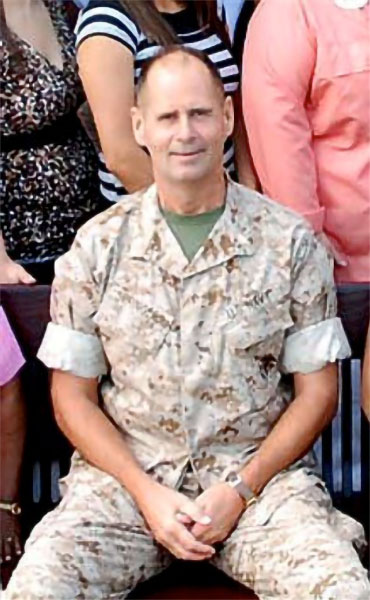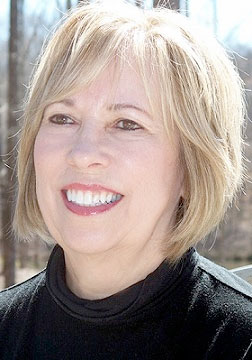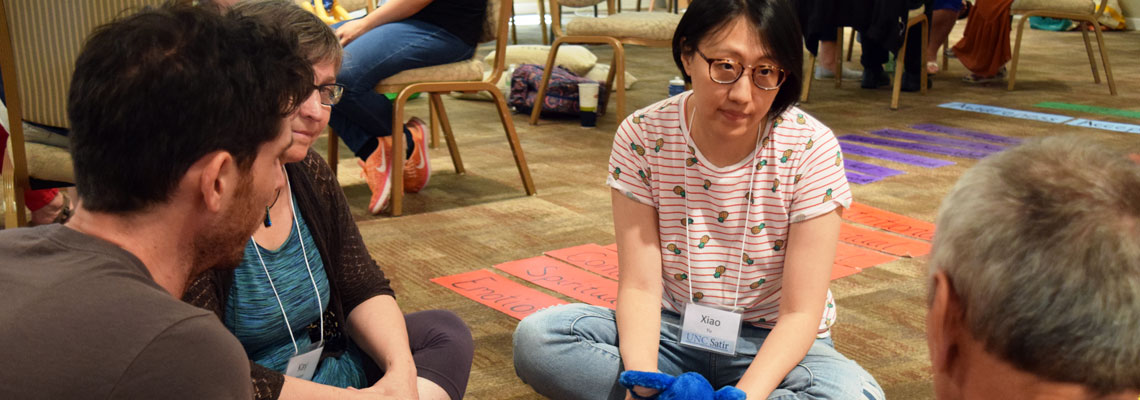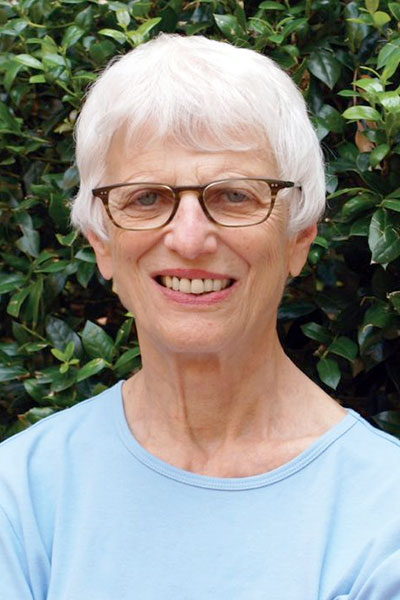UNC School of Social Work has witnessed significant growth and achievement during its 100+ years as one of the nation’s leading schools of social work. The timeline below will introduce you to some of the key people, events and accomplishments that have marked turning points in our School’s history. Through each decade, you will see how the School’s history has woven into the extraordinary social history of our nation and world.
Of course, the timeline is not an exhaustive compilation — our history includes the work of thousands of faculty, staff, students, alumni and donors over the years. We are grateful for the contributions of each individual and each moment in time, although we could not include everything within this limited space. Our history is rich and vibrant, filled with high points as well as low points, and each has helped build our character as a professional school within the University of North Carolina at Chapel Hill.
As we embark on our next 100 years of education, research and service, we will continue our work to improve our School and to fulfill our mission of advancing equity, transforming systems and improving lives.
The timeline was developed by Susan White, marketing writer and academic editor for the School, with assistance from colleagues at the School and at UNC Libraries. Rich Stewart, graphic designer for the School, created the timeline’s format. Sources: Library of Congress, Simmons University, National Association of Social Workers, Virginia Commonwealth University, Carolina Athletics, Daily Tar Heel, Wilson Library Collection, Philanthropy Journal of North Carolina, Smithsonian Institute, NAACP, Our State Magazine, NCSU libraries, and NC Digital Collections.
The 1976 photograph above shows John Turner, the social work professor who became the first Black person to hold a deanship at UNC-Chapel Hill, teaching a class at the School.
1910s
Statewide system of public welfare
After years of discussion on ways to address issues of public welfare, including alleviating poverty, caring for neglected children, improving the juvenile court system, addressing mental health issues and issues facing individuals with disabilities and the incarcerated, North Carolina state lawmakers agree in 1919 to create a statewide system of public welfare. This new system will include a central child-caring program to begin the work needed to strengthen services and protections for children, families and communities, especially in rural counties. The goal: to ensure that every county provides public welfare services.
Creation of a public welfare institute
In response to this new state legislation, the University of North Carolina at Chapel Hill announces the creation of a public welfare institute to train mainly 600 newly created welfare officials in the state, including members of county welfare boards and welfare superintendents, as well as leaders in other positions now tasked with handling public welfare duties, including juvenile court judges, probation and parole officers, school attendance officers, factory inspectors, county health officials, public health nurses, highway officials, tax assessors, county commissioners and county school boards.
As initially proposed, three 2-hour courses will be offered: Juvenile Court, principles, procedures and methods; the Problems of County Welfare Officers in North Carolina; and Social Hygiene, problems and methods, legal and social.
The University of North Carolina News Letter (Chapel Hill, N.C.), June 11, 1919
1920s
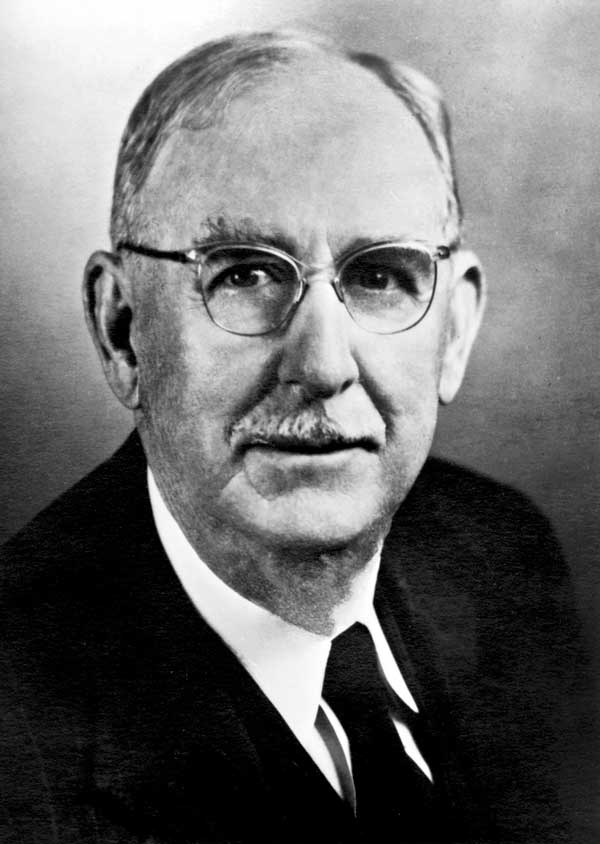
UNC School of Public Welfare
The newly named UNC School of Public Welfare launches. Howard W. Odum, former dean of the College of Liberal Arts and chairman of the Council of Deans at Emory University in Atlanta, Ga., is named a UNC Kenan Professor of Sociology and director of the new public welfare school. Considered the first collegiate school of its type in the South, the program focuses on vocational and professional training for social and public welfare work, in social engineering and in University and social research.
New courses
Odum works quickly to ramp up the School’s efforts and very soon, it is announced that new courses will be taught during a series of summer institutes using instructors from across campus, including from the School of Commerce, as well as the American Red Cross. Faculty from universities in Pennsylvania and New York are also brought in to lead special lectures. Field work and lab work in social research are also offered.
The University of North Carolina News Letter (Chapel Hill, N.C.), June 30, 1920
Blazing a trail
In a few brief months, the N.C. Extension Division declares: “History is being made in Chapel Hill this summer. The trail that Dr. Howard Odum and his associates are blazing in the work of the Public Welfare Institute is a trail that will inevitably widen into a broad, paved highway along which all the intelligent social forces of the country will march. Through keenness of perception, desire of service, the ability and the passion to prepare the way, both the University and the Red Cross have heard and are answering the clear call from all those forces which, in the words of Commissioner Beasley, are trying to supplement home, the school, the church, and the community for the needs of vigorous, healthy, wholesome, and more abundant life. It is the beginning of what may be a complete turnover of educational ideas and it is being done right here on this campus. Not only social workers but educators and broad-minded, thinking citizens the country over are watching and will watch more closely in the future the work of the Public Welfare Institute and of its successor, the School of Public Welfare of the University. More power to both of them!”
The University of North Carolina News Letter (Chapel Hill, N.C.), August 25, 1920
Providing social workers for North Carolina’s rural communities
A detailed description of the new School of Public Welfare is published in a newsletter by the N.C. Extension Division in September 1920, noting that UNC-Chapel Hill’s program is “breaking new ground” because it will train and supply social workers for North Carolina’s rural communities.
The University of North Carolina News Letter (Chapel Hill, N.C.), September 1, 1920
Social work training programs begin to expand
UNC-Chapel Hill’s School of Public Welfare joins more than a dozen other social work training programs that are beginning to expand across the country into the early 20th century. These schools are originally affiliated with the Association of Training Schools of Professional Social Work – the precursor to the Council on Social Work Education. Core courses focus on individuals, families and communities.
The American Journal of Sociology, Vol. 26, Bimonthly, July, 1920–May, 1921
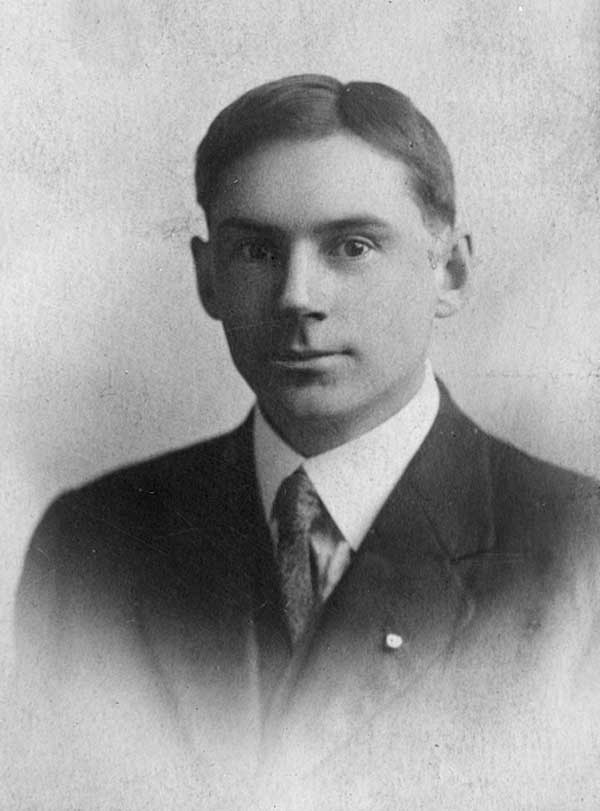
Notable faculty join the new School
Dr. J.F. Steiner joins the School as professor of social technology. Steiner is former national director of educational service for the American Red Cross and of the Bureau of Training for Home Service. A former missionary to Japan and professor of English at the North Japan College, Steiner also served as a lecturer at the University of Chicago and at the McCormick Theological Seminary and as a professor of sociology at the University of Cincinnati. Steiner will be teaching courses in family and social pathology, immigration, and community organization. Steiner advocates for the academic training of the profession, later publishing an article that emphasizes the need for universities to train social workers just as they are responsible for training lawyers, engineers, doctors and teachers.
Early research
The School of Public Welfare collaborates with the Department of Rural Social Science and the Bureau of Extension to survey Orange and Durham counties to better assess community life in North Carolina. The assessment is one of similar surveys being conducted across the United States by an agency in New York to gather a broad view of the social and religious conditions of the nation. The survey focuses on among other issues, the economic conditions of counties, community leadership, and social activities, including the ratio of dance halls to churches.
Assisting the state’s rural counties
Three years later, the School begins to explore a demonstration study and programs involving four North Carolina counties to better understand the specific needs of the state’s rural counties and what North Carolina’s new public welfare system can do to assist these communities. In addition, leaders partner with other charitable and nonprofit agencies in the state to develop a plan for field work and training for social workers and social welfare leaders at UNC-Chapel Hill.
Full partnership
By 1927, the School of Public Welfare and the state’s Department of Public Welfare and Board of Charities are working together to teach welfare workers across the state. At this time, full-time superintendents of public welfare, seven of whom have assistants, are employed in 51 counties. Another eight counties have part-time superintendents and in 41 counties, school superintendents also act as superintendents of public welfare. Few of these leaders come into these roles with any social casework training.
1930s
Social science exhibition
Dr. Howard Odum returns from Chicago, where he has been assigned to develop the social science exhibition for the 1933 World’s Fair, themed “A Century of Progress.”
Division of Public Welfare and Social Work of the Graduate School
The School of Public Welfare becomes a Division of Public Welfare and Social Work under the University’s School of Public Administration. Later, the division is known as the Division of Public Welfare and Social Work of the Graduate School.
New Deal
The creation of the New Deal under Franklin Delano Roosevelt’s administration ushers in banking reform laws, emergency relief programs, work relief programs, and agricultural programs.
Second New Deal
A second New Deal emerges and guarantees union protection programs, establishes the Social Security Act and creates programs to assist tenant farmers and migrant workers. Other social welfare programs expand for housing, recreation, cultural activities, social insurance, and child welfare programs.
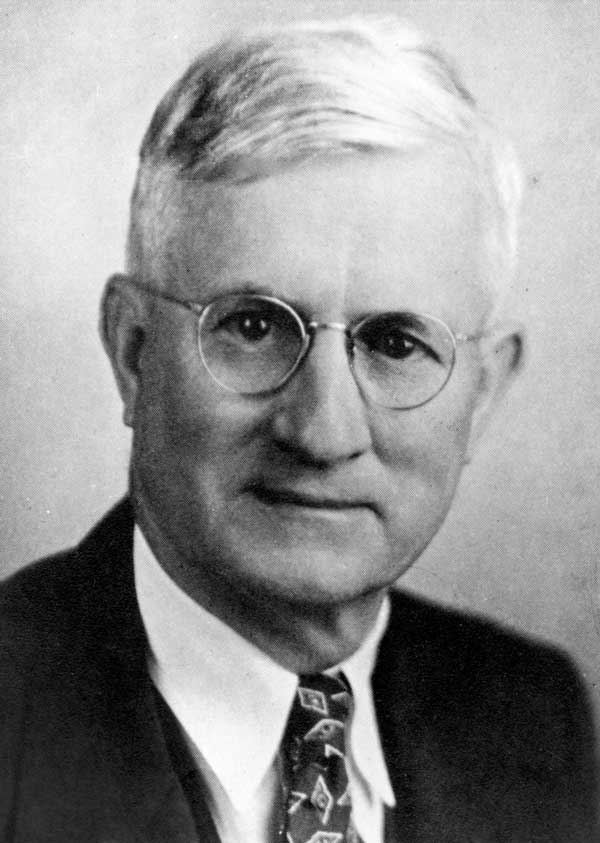
Second director/dean
In 1936, Roy M. Brown, who held various administrative positions in North Carolina state public welfare agencies, becomes the School’s second director/dean. A close associate of Howard Odum, Brown advances the School’s academic progress, introducing a new course dealing with social security work, an area he notes is in “great demand for men,” according to The Daily Tar Heel. Brown serves as dean until 1945 before returning to the faculty. He retires as professor emeritus in 1948.
Pioneering social worker
Leora German is among the small cohort of students enrolled in the School in the 1930s. German grew up on a dairy farm in the North Carolina mountains. Considered a pioneering social worker, German goes on to serve as director of the Red Cross Field Hospital at Reims, France during WWII. Following the war, she serves as a social worker at Brooke Army Hospital, in Fort Sam Houston, San Antonio, Texas.
Wallace Kuralt Sr.
In 1937, Wallace Kuralt Sr. returns to study social work at UNC-Chapel Hill, six years after graduating with a communications degree from the university and after earning experience as a caseworker in Onslow and Robeson counties. He later works as a field representative for the N.C. Board of Public Welfare before being appointed to serve as the director of the Mecklenburg County Department of Social Services from 1945-1972. Under his leadership, Kuralt develops various programs, including drug and alcoholism clinics and child development centers. He also becomes known as the architect of the state’s program of eugenic sterilization, a state-ordered surgery to prevent individuals who are poor or disabled from bearing children.
Student activism
In the late 1930s, a group of social work students organized a meeting with editor Carl Goerch of The State magazine to counter his published opinion on “Purging relief rolls.” Goerch argued that thousands of people receiving federal financial assistance did not need it and that local governments alone should be responsible for providing such funding. The students countered that local welfare agencies were financially unable to care for the needy.
War on Germany
In 1939, Adolph Hitler, leader of the Nazi Party, invades Poland and drives Great Britain and France to declare war on Germany, launching World War II. Future School of Social Work Dean John B. Turner (pictured here) will serve during the war as a member of the Tuskeegee Airmen, the first Black military aviators.
1940s
Military social work
During WWII, social workers take on war-related assignments, helping develop services for communities, families and soldiers impacted by the war, including those injured or with other health problems. Military social work eventually develops from this work.
School rated one of the best in the South
By the 1940s, the School is already rated one of the best in the South and employs more than 30 highly regarded instructors. Faculty and staff are housed fully on two floors of the Alumni Building and a portion of a third floor.
Names in Brick and Stone: Histories from UNC’s Built Landscape
Growth and challenge
Nearly 150 students are enrolled and spend two days a week in the field, working closely with county agencies and focused mainly on direct casework involving older adults, aid to dependents, child delinquency and negligence. The internships are equivalent to two years of instruction. The biggest challenge at the time: getting men to enroll in the program. Until WWII ended, many had been drafted and were unable to attend school until their service was complete. Only three make up the current cohort with the hope others will be attracted by the potential salary earnings, advertised as between $1,260 and $3,720 annually.
Accelerated pre-professional curriculum
In 1944, Dean Roy Brown announces that at least 10,000 students are needed each year to enroll in schools of social work to meet the growing demand for services during WWII. To meet this challenge, the School introduces an accelerated pre-professional curriculum, allowing students to receive an associate degree and a certificate for one year of graduate social work.
Isabelle K. Carter
An assistant professor of social work since 1937, Carter is listed among a group of people named as “cooperators” of the magazine Social Work Today, which was cited as a Communist magazine, in the 1940s report of the House Committee on Un-American Activities.
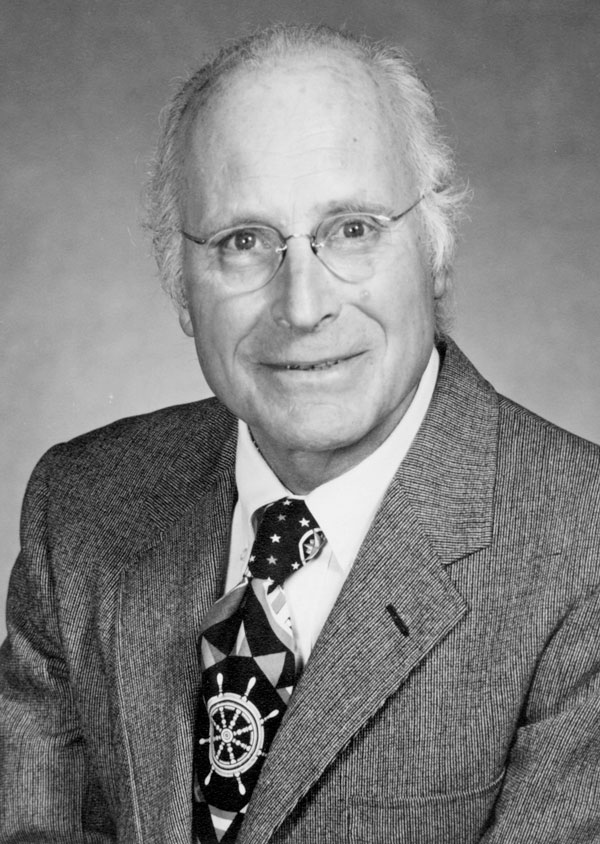
Third director/dean
In 1945, Arthur E. Fink is appointed the third director/dean of the Division of Public Welfare and Social Work. Fink is “regarded as one of the most distinguished of the younger social work scholars and executives in the university field,” according to a report from The Daily Tar Heel. Fink arrives at the School with a distinguished career with both public and private social work agencies, including serving as the director of the social work training program a the University of Georgia. He also served in Washington, D.C., as associate director of the Social Protection Division of the Federal Security Agency. His boss: the famous crime-fighter Eliot Ness, who served as director of the agency.
Arthur Fink Selected To Head Welfare Work At University
During his tenure with UNC-Chapel Hill, Fink helps to further develop the School of Social Work’s pioneering training work to prepare social workers for practice in rural communities, a growing need after World War II. Fink will remain in his position until 1965, making him the School’s longest-serving head administrator.
UNC explores integration
By the late 1940s, UNC-Chapel Hill is surveying students to explore integration. During this same time, 36 students are enrolled in the Division of Public Welfare and Social Work.
1950s
A modern new name
The Division of Public Welfare and Social Work officially become the UNC School of Social Work.
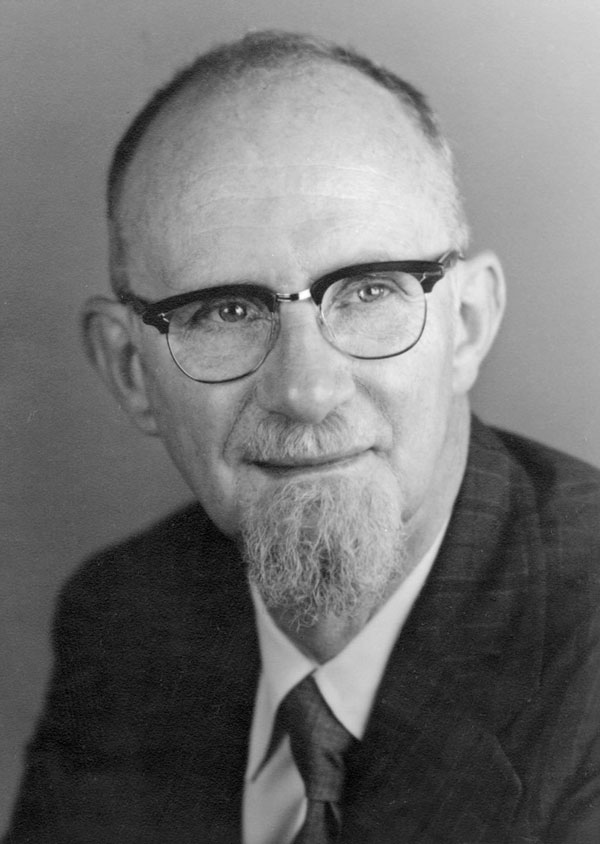
Alan Keith-Lucas
British-born scholar and social worker Alan Keith-Lucas joins the faculty. Keith-Lucas founds the Group Child Care Consultants Services, a vehicle to help private and public group homes better serve juvenile populations.
Temporary dean
In 1951, Alan Keith-Lucas is named temporary dean, while Dean Arthur Fink finishes a year as a Fulbright lecturer in England at the University of Birmingham, England.
CSWE and NASW
Council on Social Work Education and the National Association of Social Workers form to strengthen and promote the social work profession.
Council on Social Work Education
The School becomes an accredited member of the Council on Social Work Education in 1952.
Odum’s retirement and death
The School’s Founding Father Howard Odum retires at age 70 in June 1954. He dies a few months later, but his academic legacy continues at UNC-Chapel Hill.
Brown v. Board of Education
In 1954, the U.S. Supreme Court rules in the landmark Kansas court case Brown v. Board of Education that public school segregation is unconstitutional.
Desegregation at UNC-Chapel Hill
Inspired by this ruling, UNC-Chapel Hill student and later School of Social Work graduate William Lofquist, MSW ’60, and other allies begin working with a small group of students and a committee to organize plans to fully integrate the University’s undergraduate student body. In this role, Lofquist helps to recruit three young African American students to join in the fight and enroll in the University: Ralph and Leroy Frasier, who were brothers, and John Lewis Brandon. Though initially denied enrollment, the court system ruled a year later that the men could not be refused admission based on their race.
1955 enrollment
There are now 40 students enrolled in the School of Social Work.
Demonstrations in protest of segregation
The Montgomery bus boycott begins later in the winter of 1955 and is considered America’s first large-scale demonstration in protest of segregation. Four days earlier, Rosa Parks, a Black seamstress from Tuskegee, Alabama, was arrested for refusing to give up her seat on a bus to a White man. The federal court rules a year later that the segregated seating policy violates the 14th Amendment of the U.S. Constitution, ending the bus boycott months later when busing is desegregated.
1960s
Black Students and the Greensboro Sit-In
Four Black students at N.C. A&T University take a seat at a segregated Woolworth’s lunch counter in Greensboro on Feb. 1, 1960 and politely ask to be served. The event sparks a youth-led sit-in movement across the country challenging racial inequality.
Student Nonviolent Coordinating Committee (SNCC)
In April 1960, the Student Nonviolent Coordinating Committee (SNCC) forms at Shaw University in Raleigh, N.C., helping to coordinate non-violent campaigns, including sit-ins, Freedom Rides and the 1963 March on Washington.
Martin Luther King, Jr. in Chapel Hill
In May 1960, Martin Luther King, Jr. addresses an overflow crowd at UNC-Chapel Hill concerning “The Struggle for Racial Justice.” He tells the primarily white audience that “It is either non-violence or non-existence.”
Image: Dr. Martin Luther King Jr. speaks in Chapel Hill in 1960. News and Observer — UNC SOUTHERN HISTORICAL COLLECTION, JOHN KENYON CHAPMAN COLLECTION
John F. Kennedy in Chapel Hill
John F. Kennedy is elected president, narrowly defeating his rival Richard Nixon. In 1961, President Kennedy speaks on University Day in Kenan Memorial Stadium.
Social work field growth
By 1962, careers in the social work field continue to increase, with many graduates finding jobs with settlement and community houses, YMCAs, public assistance and child welfare, and medical and psychiatric social work. Social workers employed in all fields earn, on average, $5,200 annually, while case workers earn $4,750 annually.
Turbulent times
Within just a few months in 1963, Martin Luther King Jr. is arrested, Mississippi NAACP field secretary Medgar Evers is murdered, four young Black girls die in the bombing of the 16th Street Baptist Church in Alabama, and President Kennedy is assassinated. During this turbulent time, the School of Social Work quickly establishes itself as a leader in training professionals and paraprofessionals across the state.
Developmental Disabilities Training Institute
The School launches the Developmental Disabilities Training Institute (DDTI) in 1963. DDTI works to ensure the well-being and inclusion of people with intellectual, developmental, and co-occurring disabilities. Much of the institute’s focus centers on providing training and technical assistance to those serving the state’s intellectual and developmental disability population, to further support the transition of individuals from institutions back into their own communities.
Abolishment of poll taxes
In January 1964, the 24th Amendment to the U.S. Constitution is ratified, abolishing poll taxes.
War on Poverty
President Lyndon B. Johnson announces his most iconic legislation, the War on Poverty, as part of a broader legislative reform platform known as The Great Society. The campaign launches an array of social government programs, including the Economic Opportunity Act, Job Corps, Medicare, Medicaid, Department of Housing and Urban Development, Older Americans Act, and the Food Stamps program.
Howard Lee
Howard Lee, a graduate of Fort Valley State College in Georgia, a U.S. Army veteran, and a former juvenile probation officer in Savannah, Ga., enrolls in the School of Social Work’s Master of Social Work program. He graduates in 1966 and three years later he is elected mayor of Chapel Hill, becoming the first Black mayor of a predominantly White community in the South. He serves three terms.
Civil Rights Act
On July 2, 1964, President Lyndon Johnson signs into law the Civil Rights Act, outlawing discrimination on the basis of race, color, religion, sex or national origin. The law ends segregation in public places and bans discrimination in employment and schools.
Community treasure
Edith Wiggins graduates with her MSW degree from the School of Social Work. She is active in the community and is elected to the Chapel Hill/Carrboro School Board in 1979, serving until 1987. She later serves as director of the Campus Y and becomes the first Black vice chancellor and dean of student affairs at UNC-Chapel Hill in 1994. Two years later, she is elected to the Chapel Hill Town Council and serves until 1995. In 2018, the Chapel Hill Town Council names her a community treasure.
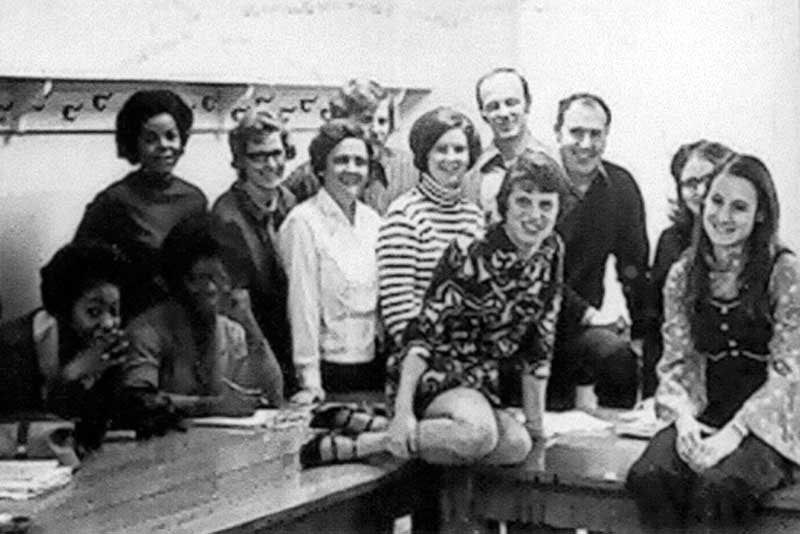
Galinsky joins the School of Social Work faculty
Maeda Galinsky, a lecturer at the University of Michigan, where she earned her Ph.D. in social work and psychology, joins the School of Social Work faculty. Galinsky arrives to find that research is practically nonexistent at the School. She and colleague Janice Schopler, quickly began to pursue various pilot studies, most of which they fund out of their own pockets. This research will help to lay the foundation for intervention research in social work, establishing Galinsky as an innovator of social work practice, particularly around group work.
Medicare and Medicaid
Medicare and Medicaid are created in July 1965.
Voting Rights Act
Congress approves the Voting Rights Act of 1965, guaranteeing Black Americans the right to vote as promised by the 15th Amendment to the United States.
Acting Dean Alan Keith-Lucas
After nearly 16 years on the faculty of the School of Social Work, professor Alan Keith-Lucas is named acting dean until 1966.
Vivian Foushee
Vivian Foushee of Durham enrolls in the School of Social Work. Foushee’s pursuit of a career in social work is largely influenced by her grandmother’s positive experience with a social worker who often visited the family. Following her graduation, Foushee works for 15 years as a case worker for Orange County and becomes a vocal advocate for desegregation in the Chapel Hill community.
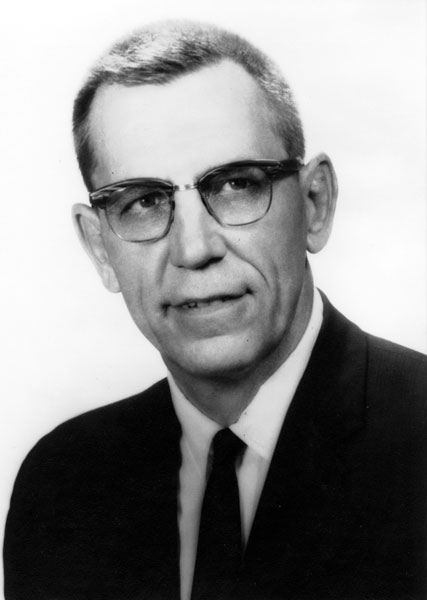
Dean C. Wilson Anderson
In June 1966, C. Wilson Anderson, a former commissioner of the Office of Children and Youth with the Pennsylvania Department of Public Welfare, is tapped as the next dean of the School of Social Work. Anderson comes to the role having earned recognition for his work to revise and modernize the child welfare laws in Pennsylvania.
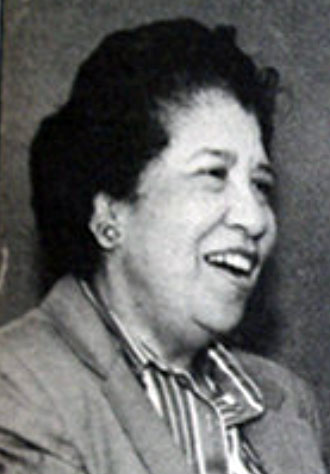
Hortense McClinton
During the 1966 fall term, Hortense McClinton begins teaching at the School of Social Work. She joins UNC-Chapel Hill as the University’s first Black faculty member. Blazing trails isn’t new to McClinton, who was also the first Black social worker to work for the Durham Veterans Administration. Over the next 18 years, McClinton teaches casework, human development, and family therapy. She also creates a class on institutional racism, helping to lead early social work discussions and education on America’s legacy of white supremacy.
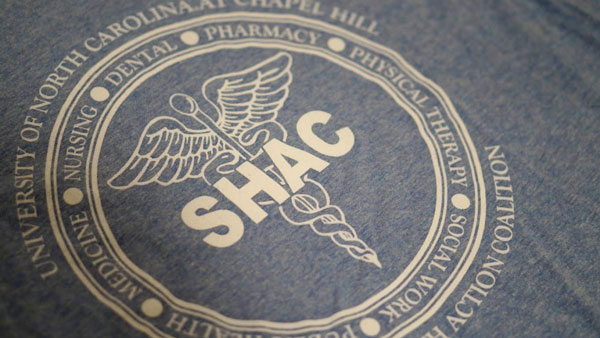
Student Health Action Coalition (SHAC)
In 1967, the Student Health Action Coalition (SHAC), which includes UNC social work student volunteers, opens as the nation’s first student-run free clinic. The clinic, which is also comprised of Carolina student volunteers from the medical, nursing, pharmacy, dental, public health and business schools, provides care and services to underserved residents in Chapel Hill, Carrboro and Durham.
Supreme Court ruling
In June of that same year, the Supreme Court decides in favor of the plaintiffs in, Loving v. Virginia, striking down state laws banning interracial marriage. The ruling also deals a blow to segregation.
Field instruction
The School of Social Work receives a $15,000 award from the Office of Economic Opportunity to establish a field instruction unit in community action. The unit will help train personnel for community action agencies. W.L. “Bill” Riddick II, a former deputy director of an anti-poverty agency in New Bern, is hired as a field instructor for the unit.
Part-time MSW program
The School launches a part-time MSW program in Fayetteville through a partnership with Fayetteville State University.
Howard Fuller
Dean C. Wilson Anderson recruits Howard Fuller in 1968 as a part-time lecturer. Fuller, who holds master’s degree in social administration from Western Reserve University, is the development director for Operation Breakthrough, an anti-poverty nonprofit in Durham, focused on community organizing. Critics of his grassroots work label him a militant for his vocal advocacy for civil rights and campus and university system leaders question Anderson’s decision to bring Fuller onto the faculty. Fuller resigns after he is arrested at a protest in Durham.
King assassination and Poor People’s Campaign
On April 4, 1968, Martin Luther King Jr., is fatally shot while standing on the balcony of a motel in Memphis, where he had traveled to support a sanitation workers’ strike. His death sparks protests across the country. A few weeks later, the Poor People’s Campaign is launched in Washington, D.C. Led by Ralph Abernathy of the Southern Christian Leadership Conference, the campaign demands economic and human rights for poor Americans.
National Association of Black Social Workers
Audreye Johnson, an associate professor at the School of Social Work, and an outspoken advocate for better health care, education, and general welfare of the Black community, helps found the National Association of Black Social Workers. She also helps to create the Triangle Association of Black Social Workers. Johnson’s research interests include the impact of HIV+AIDS on African Americans, especially women.
Hiring of Howard Lee opposed
University administrators and trustees oppose the hiring of Howard Lee as a lecturer at the School after reports that Lee made comments critical of Gov. Robert Scott during a conference in Washington, D.C. Lee eventually withdraws his name from consideration but will join the faculty 20 years later.
Fair Housing Act of 1968
Congress passes the Fair Housing Act of 1968, outlawing the sale, rental and financing of housing based on race, color, national origin, religion, sex, familial status, and disability.
Gay Liberation Movement
In June 1969, New York City police raid the Stonewall Inn, a gay bar in Greenwich Village, arresting employees and patrons and setting off several days of protests and violent clashes between the gay community and law enforcement. Trans icons Marsha P. Johnson and Sylvia Rivera emerge as leaders in the new Gay Liberation Movement.
Student unrest
The National Guard storms the campus of the historically Black North Carolina A&T University following a protest over a student body election at nearby Dudley High School, where school administrators refuse to accept the results after a Black student won the election for school president. The decision sets off weeks of protests and student walkouts that expand over unequal treatment of Black students and Black people. A N.C. A&T student is shot and killed; the murder remains unsolved.
1970s
EPA and OSH Act
The Environmental Protection Agency is created. By the end of the year, the Occupational Health and Safety Act is also in place.
Anderson departure
Under fire for his hiring of Howard Fuller and attempt to hire Howard Lee, Dean Anderson learns in 1971 that his 5-year contract with the University will not be renewed. Students and faculty protest the decision, but Anderson eventually ends his term early to take an executive director job in Cleveland, Ohio.
Keith-Lucas appointed acting dean
Distinguished Professor Alan Keith-Lucas is appointed acting dean of the School of Social Work, following C. Wilson Anderson’s departure. This is the third time Lucas, who has been on faculty for 21 years, has served in the post temporarily.
School of Social Work Student Association
In November 1971, the School’s Social Work Student Association issues a position paper to announce publicly its opposition to President Nixon’s Welfare Reform Bill, which the students argue, includes “invalid assumptions and myths about the poor and will result in a system even more oppressive to the poor than the present system.”
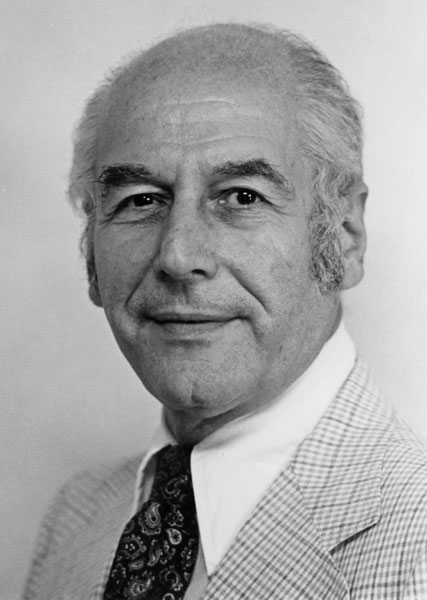
Dean Morton Teicher
By 1972, Morton Teicher is appointed dean of the School of Social Work after having served as dean and professor at Wurzweiler School of Social Work, Yeshiva University, for 15 years. The Bronx-born Teicher earned his Ph.D. in anthropology and performed field work among the Inuit and the Iroquois people. Among the first social workers to achieve officer status in the U.S. Army, he is also one of the first military psychiatric social workers, serving in the China-Burma-India Theater for more than two years during World War II. An active member of the NASW since its foundation, Teicher was appointed to a commission that produced the first Code of Ethics for the social work profession. While at Wuzweiler, Teicher “taught and modeled political involvement for social change” – activism that earns him praise from Eleanor Roosevelt in 1959.
Bills signed
In October 1972, President Nixon signs 60 bills, allocating more than $5 billion in benefits to older Americans, individuals who are visually impaired and to people with disabilities.
Location changes
In 1973, the School of Social Work moves its entire faculty and staff operations from the Alumni Building and Pettigrew Hall to the former UNC Consolidated Office Building on East Franklin Street, across from the main campus. Since 1950, the School of Social Work had shared space in the Alumni Building, making it the only school on campus without a building of its own until the move into the Franklin Street building. Classes continue to meet in various buildings spread across campus.
Turner joins faculty
John B. Turner, Ph.D., joins the UNC-Chapel Hill faculty in 1974 as the William Rand Kenan Jr. School of Social Work Professor. Turner is a former dean of the School of Applied Social Science at Case Western Reserve University and professor at the University of Georgia in Athens. He is named dean of UNC School of Social Work 7 years later.
Federal grant establishes a work study center
Dean Morton Teicher announces that the School of Social Work has received a nearly $260K federal grant to establish a work study center at N.C. Central University in Durham for the 1974-1975 academic year. The program is the first of its kind to be established by the University on a predominantly Black campus. The funding will support the ongoing work study program, which allows current social work employees to continue working while pursuing their MSW degree. Students on four campuses can now earn one half of their degree while not having to leaving their jobs.
High unemployment rates
In March 1975, unemployment is at 8.7%, the highest since 1941. By May, it hits 9.2%.
Ban lifted
A 22-year national ban that had prevented gays and lesbians from working in the federal civil service sector is lifted.
Howard Lee joins the Hunt administration
In 1977, Howard Lee, MSW ‘66, former mayor of Chapel Hill, is appointed secretary of the N.C. Department of Natural Resources and Community Development under the Jim Hunt administration.
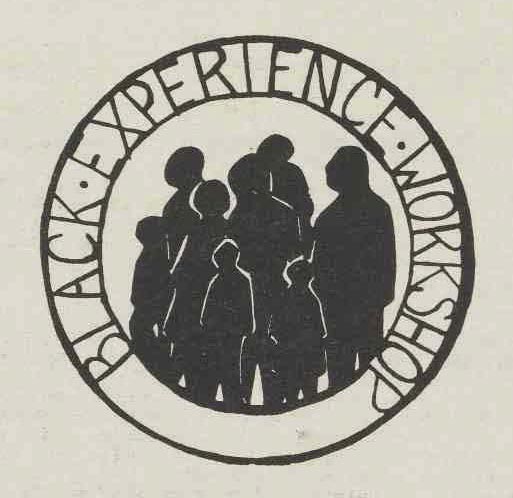
Black Experience Workshops
At the end of the decade, assistant professor Audreye Johnson creates, organizes, directs and launches the Black Experience Workshops. The workshops bring together academic, state and national leaders to participate in critical conversations about racism in America, addressing various topics, including health, economic, and social welfare issues. The workshops aimed to intensify the interest of social workers in the Black experience.
1980s
New research for persons who are blind
In January 1980, the School of Social Work begins to build and strengthen its research faculty and productivity. Professor Jan Pfouts leads a study on how race, sex, education and other factors impact the ability of someone who is blind to live independently. The study, considered the first of its kind in the country, is conducted in partnership with UNC-Chapel Hill’s Research and Training Center on Blindness.
Dean Morton Teicher announces resignation
In October 1980, Dean Morton Teicher announces he is resigning and returning to teaching. At the time, he is the longest serving dean of social work in the United States, having served in deanships for 20 years, including nearly 16 years at Yeshiva University in New York.
Women’s Studies Materials Center
The School creates a Women’s Studies Materials Center. The center, housed in the Franklin Street office, provides a collection of resources and materials on women’s employment, women’s rights, discrimination, health issues, education and more. The collection includes books, journals, government documents, pamphlets and biographical references. The center aims to help social work students better understand the challenges and barriers women continue to face.
Social work changes during the Reagan administration
Under President Ronald Reagan’s administration, many federal programs are reduced or eliminated and as a result, the work of social workers is significantly affected. Many begin to rely heavily on private-sector solutions for social welfare problems. Social workers also face new challenges: the HIV/AIDS epidemic, the crack cocaine epidemic, homelessness, and domestic violence.
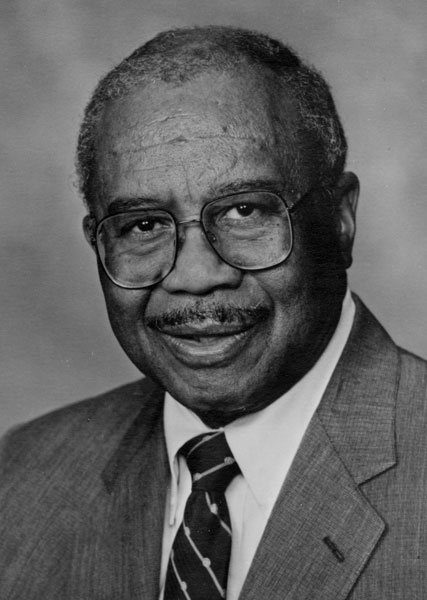
Turner becomes first Black dean at UNC-Chapel Hill
In 1981, William Rand Kenan Professor John B. Turner is named the new dean of UNC School of Social Work. Turner, a writer, scholar and teacher who has devoted his life to community organization, social activism and social work education, is UNC-Chapel Hill’s first Black dean. Turner spends the next decade working to map out the School’s road to prominence, including the program’s first development office and successful drive to raise a historic $5 million in contributions as well as the construction of a new $10 million building on the health sciences campus. Turner also commits to recruiting students and faculty of color, all efforts that help the School earn recognition as a top 10 graduate social work program in the country. His name will eventually be among those inscribed on the School’s new Pittsboro Street building, making it the first on campus to bear the name of a Black person.
Jane Hoyer Pfouts
Professor Jane Hoyer Pfouts, 61, a specialist in family interaction and a member of the UNC faculty since 1963 and the School of Social Work faculty since 1971, dies Nov. 7, 1982.
4th Annual Black Experience Workshop
The School of Social Work’s 4th Annual Black Experience Workshop, focuses on social policy, with topics including empowerment and social welfare, maternal and child healthcare, the Black elderly, support through networking, single parent families and the Black underclass.
Jack Richman hired
Dean John Turner hires Jack Richman, a former associate professor and director of the Collaborative BSW program between Nebraska Wesleyan University and Union College in Lincoln, Neb. A graduate of Florida State University and the State University of New York at Albany, Richman initially serves as assistant dean and director of studies. He will be tapped as dean of UNC School of Social Work in October 2002.
National Child Welfare Leadership Center
The School receives a $1 million grant from the Edna McConnell Clark Foundation to establish a National Child Welfare Leadership Center. The center provides training to improve child welfare programs in the United States and to strengthen services for children and families. Dr. Carol Wilson Williams, a 20-year social work veteran and assistant professor at UNC-Chapel Hill, is appointed the center’s first director of programs.
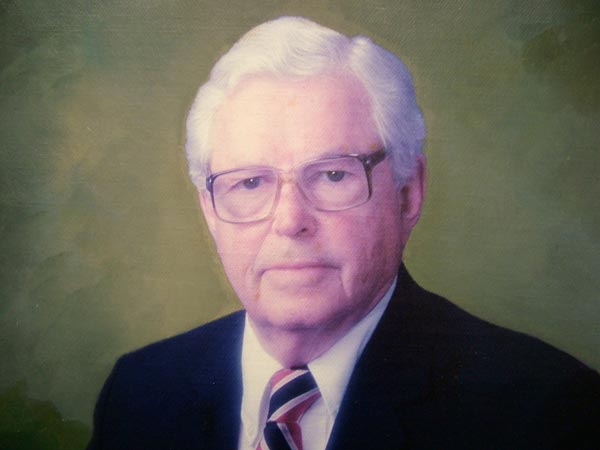
First endowed faculty position
The School of Social Work establishes its first endowed faculty position, thanks to the financial support of John A. “Jack” Tate, a successful Charlotte businessman and 14-year member of the UNC Board of Trustees. Tate, a recently appointed member of the School of Social Work’s Board of Advisors, raises hundreds of thousands of dollars for the professorship, which he believes is critical to the School’s growing research program. The John A. Tate Distinguished Professorship for Children in Need aims to attract a national scholar whose work focuses on at-risk children and families.
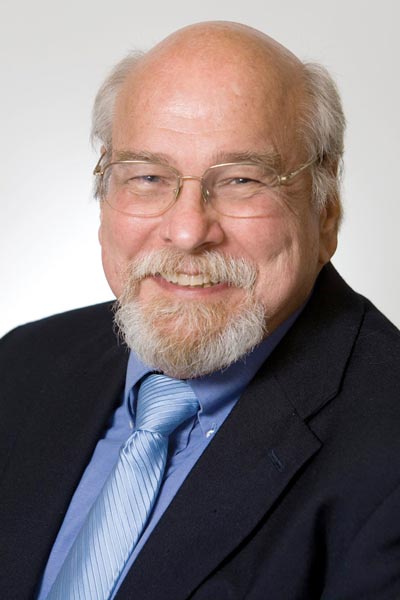
Gary L. Shaffer
Shaffer, a former associate professor with the University of Illinois at Urbana-Champaign, joins the School as director of the field education program and later as director of the School’s summer program. In his new role, Shaffer focuses much of his energy on international social work and the development of the social work practice within the state’s public schools. As a member of the N.C. Professional School Social Work Standards Committee, he also supervises more than 300 MSW students within North Carolina school districts and licenses school social work practitioners through the N.C. Department of Public Instruction. Over the course of his career, more than 500 practitioners will earn state licensure under his leadership. A tireless supporter of children, Shaffer also becomes a vocal advocate against the use of corporal punishment in the nation’s public school systems.
The Family Support Network™ (FSN)
In 1985, UNC pediatrician, Dr. Michael Sharp, and social worker, Dot Cansler collaborate to create The Family Support Network™ (FSN) to help meet the needs of families with premature infants or children with, or at risk for, developmental disabilities, behavioral disorders, or chronic illness. The team develops two parent-to-parent programs and an outreach training program that assists families with children who have special needs. Over the years, the FSN expands into a statewide network of community-based family support programs and establishes a state office at the UNC School of Social Work. By 2008, the FSN expands again to become the Family Support Program, with a focus on fostering innovation in systems, services, and supports so that families with children who have special needs lead the full lives that they envision.
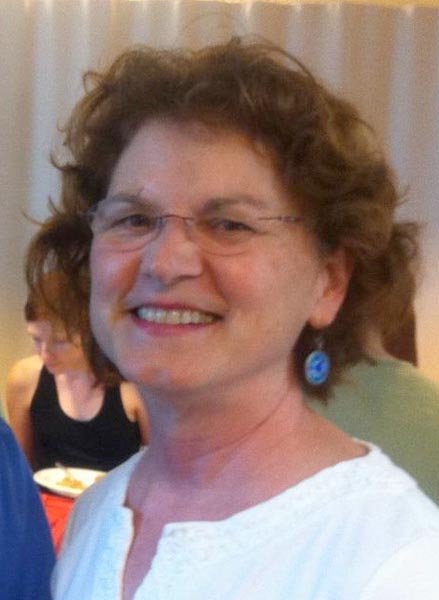
The first dual degree program
Kathleen Rounds joins the faculty, bringing a public health and social work background to her role after serving in various research and administrative positions in Washington State, New York and Michigan. Rounds is recognized for her innovative research, especially for projects focused on AIDS and HIV. She later becomes chair of the doctoral program and is instrumental in helping the School of Social Work establish its first dual degree program with UNC’s School of Public Health in the late 1980s. The innovative program focuses on macro practice in maternal and child health and provides interdisciplinary training in program planning, management, evaluation, policy development, and advocacy work. In just over a decade, more than a 100 students will earn their MSW/MPH degrees.
Charles Kuralt partners with the School
In January 1987, Charles Kuralt partners with the School to raise $500,000 for an endowed chair named after his father Wallace Kuralt Sr., a 40+year social work veteran. To raise money for this professorship, Kuralt writes and produces the video “Charles Kuralt on the Road for the School of Social Work,” which highlights the School’s mission and raises awareness for the field of social work in society. The chaired professorship will support a faculty member who’s research and teaching focuses on public welfare administration.
Center for Aging Research and Educational Services (Cares)
This same year, Professor Gary Nelson launches the Center for Aging Research and Educational Services (Cares) in 1987 to improve the lives of aging and vulnerable adults, including people with disabilities, and their families in North Carolina. Among other services, Cares provides professional development to people who work with older adults.
Area Health Education Centers (AHEC)
Around 1988, the School of Social Work becomes the first school in the nation to partner with Area Health Education Centers (AHEC) bringing faculty together to help train mental health practitioners in the field.
Plans for a permanent home
After operating in other buildings and offices across campus for years and as the only professional school at UNC-Chapel Hill without a permanent home, the School of Social Work is finally one step closer to building its own permanent building following the support of the UNC Board of Trustees in late 1988. The board approves plans for a site on Pittsboro Street and the design for the new $10 million SSW building.
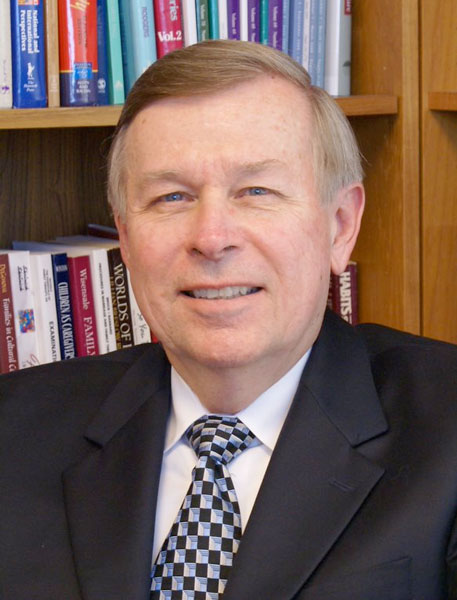
Dennis Orthner
Determined to broaden the School’s research, Dean John Turner recruits Dennis Orthner in 1988, to help develop the program’s research funding. A professor from the University of Georgia, Orthner has a background in sociology and economics and his research interests are grounded in issues affecting vulnerable children and families, including poverty and public education. Orthner immediately establishes the Human Services Research and Design Laboratory to promote and support faculty research. Over the next decade, projects flourish and the School of Social Work attracts millions of dollars in funding, especially for work to support North Carolina’s welfare reform efforts.
Fundraising campaign
The School of Social Work receives a $75,000 grant from the Z. Smith Reynolds Foundation, helping to launch its $2 million, 3-year fundraising campaign. The money will be used to support a new doctoral program, to support the School’s research program in human resources and poverty and to support scholarships for students.
First African American chairman of the Joint Chiefs of Staff
In 1989, President George H.W. Bush appoints Colin Powell chairman of the Joint Chiefs of Staff. Powell is the first African American to serve in the position.
School expansion
By the end of the decade, as the interest in reaching more students grows, the School of Social Work expands to Asheville, where a part-time MSW program is launched on UNC-Asheville’s campus. Around 20 years later, the program will move to Blue Ridge Community College in Flat Rock, N.C., and begin to enroll students annually rather than every other year under a new Mountain Area name.
The Fair Labor Standards Amendments
The Fair Labor Standards Amendments of 1989 are signed and within two years will result in the minimum wage being raised to $4.25 an hour.
1990s
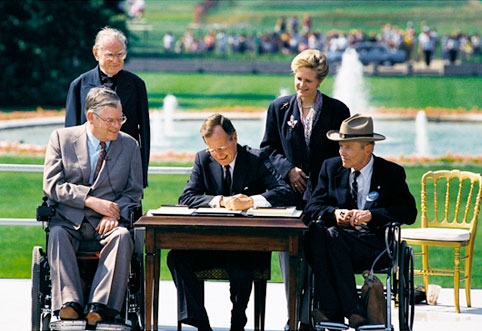
The Americans with Disabilities Act
The Americans with Disabilities Act is signed into law. The Act affects more than 43 million Americans and prohibits discrimination in employment, public accommodations, and transportation.
School growth
School Dean John B. Turner ramps up efforts for a new School of Social Work building. The program currently operates out of UNC’s Consolidated Office Building, a three-story house on Franklin Street. He and the School’s development team also launch a new $10 million fundraising campaign to support the School’s programs, students, faculty and staff.
Senator Howard Lee
Alumnus Howard Lee, MSW ’66, is elected to the N.C. State Senate, where he serves for 13 years. During his tenure, he presides over the education, transportation and appropriations committees.
School Success Profile survey
Gary Bowen, Kenan Distinguished Professor, and Dean Jack Richman develop a School Success Profile survey that aims to help educators nationwide identify barriers to learning, mainly among youth considered at-risk.
Black Experience Workshop
The School’s Black Experience Workshop enters its 12th year with the theme: “Racism: Challenges and Changes for the ‘90s.” Associate professor Audreye Johnson remains the driving force for the successful forums, which attract academic, government and other civic minded leaders from across the nation. Because of her long-time advocacy for racial justice reform and service to the academy and community, Johnson is among 50 women recognized for their achievements at “A Consortium of Doctors: Women of Color in the Struggle.” The event, held in Atlanta, honors leaders in their fields, including judges, lawyers, doctors, ministers, educators, musicians, scientists and entrepreneurs. This same year, she receives an award for outstanding achievement from the American Public Health Association. The award honors Johnson’s efforts to create the public health specialization at the School.
Alex Haley
In October 1991, Alex Haley, an American writer and best-selling author of the 1976 novel Roots, and a long-time friend of Dean John Turner agrees to collaborate with the School of Social Work and journalist Charles Kuralt to produce a video to raise money for a new Family Life Learning Center at the School.
Historic gift
Pharmaceutical company Burroughs Wellcome Inc. donates $1.4 million to UNC-Chapel Hill’s Bicentennial campaign, including a historic $400,000 gift to the School of Social Work. UNC has a goal to raise $320 million, of which the School aims to raise a historic $5 million — funding that will help to strengthen faculty and student support and enhance existing programs.
Ph.D. program
In the spring of 1992, the UNC Board of Governors approves the creation of a Ph.D. program at the School of Social Work. The program, which will launch in the fall of 1993, is the first doctoral social work program in the state. Faculty members Anne-Linda Furstenberg and Gary Bowen co-chair the new program, which aims to enroll 6-8 students each year. At the time, about one-third of the School’s MSW graduates expressed interest in earning their Ph.D.
Construction of new building approved
After decades of waiting for state funding, the School of Social Work learns that the General Assembly has approved $10.2 million for the construction of the School’s new building. The School has existed for 70 years without its own free-standing building.
Dean John B. Turner retires
In June 1992, after 10 years of leadership and 18 total years of service to UNC-Chapel Hill, Dean John B. Turner retires. A pioneer in social work education, Turner was responsible for establishing the School’s financial footing with the creation of the program’s first development office. He was the driving force behind the School’s $10 million campaign for a permanent building on campus, helped establish the School’s doctoral program, and worked statewide to educate policymakers and the public on the critical need for social work.
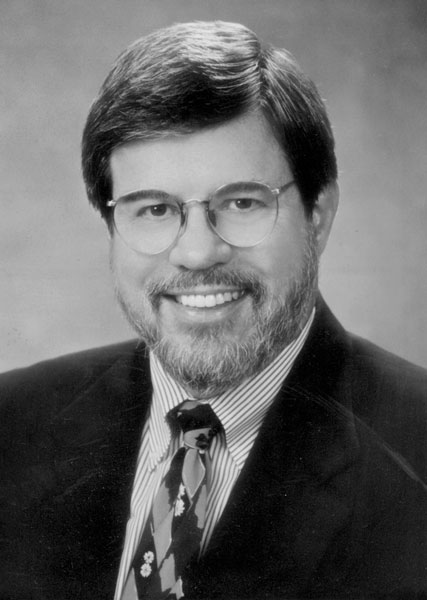
Edwards named as dean
Richard Edwards, former dean of Mandel School of Applied Social Sciences at Case Western Reserve University in Cleveland, is named dean of UNC School of Social Work. A graduate of the University of Chicago and the State University of New York at Albany (SUNY Albany), Edwards brings direct social work practice and a variety of administrative experience to the role, including serving as associate director of the Office of Continuing Social Work Education for the University of Tennessee Knoxville’s School of Social Work and as SUNY Albany’s dean and acting dean for the School of Social Welfare. His research has focused on social work education and nonprofit and public management work.
Groundbreaking ceremony
School of Social Work officials break ground for the construction of a new academic building on Pittsboro Street in Chapel Hill. Dignitaries, including N.C. Gov. Jim Hunt, UNC System President C.D. Spangler and Chancellor Paul Hardin join in the festivities and celebration for the School’s new 75,000 square foot building. “The profession of being a social worker is one of the truly great callings of our society,” Hunt told nearly 200 guests attending the groundbreaking ceremony.
School’s new doctoral program
During the same ceremony, Dean Emeritus and chairman of the School’s Board of Advisors John Turner announces the School’s new doctoral program will launch in August with its first enrolled cohort. This first group of Ph.D. students will include Mimi Chapman, who years later will join the social work faculty and be named a Frank A. Daniels Distinguished Professor and associate dean for doctoral education.
Don’t Ask, Don’t Tell policy
President Clinton announces a new administrative policy that allows gays and lesbians to serve in the military as long as they do not disclose their sexual orientation. The policy will be known as “Don’t Ask, Don’t Tell.”
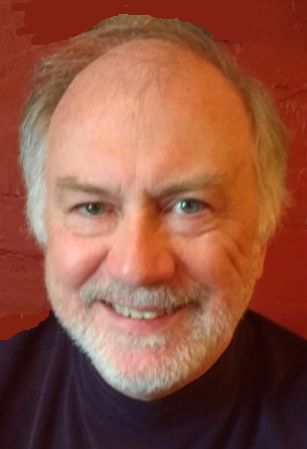
Kuralt Professorship
Lynn Usher is named the first Wallace H. Kuralt Professor of Public Welfare Policy and Administration. Usher, who has been employed with the Research Triangle Park since 1980, has also served as director of its Center for Policy Studies.

Mark Fraser
Mark Fraser, former director of the Ph.D. program at the University of Utah’s School of Social Work and an award-winning social scientist, is tapped around the same time as the John A. Tate Distinguished Professor for Children in Need. Lynn Usher and Mark Fraser both work to strengthen the School’s intervention research, especially around at-risk children and families. Fraser also helps to develop an administrative support team to assist faculty with developing grant proposals.
Family and Children’s Resource Program (FCRP)
By the early part of the decade, the School is establishing itself as a go-to resource for organizations that serve families and communities in North Carolina. The School’s launching of the Family and Children’s Resource Program (FCRP) solidifies its commitment as a state partner, ready to provide customized training and coaching services, program evaluation, and promotion of best practices in child welfare and foster care.
William R. Davies Award
Sen. Howard Lee, MSW ’66, receives the UNC Board of Trustees’ highest honor: the William R. Davies Award, which recognizes extraordinary service to the University or society.
Family Strength Index
Professor Dennis Orthner launches the Family Strength Index, to better understand how North Carolina families deal with life’s challenges. Researchers use the index to examine family income, education, race and type. Later, he develops CareerStart, a program designed to increase student interest in school, boost test performance and reduce dropout rates. Winston-Salem/Forsyth County Schools is the first school system to partner with Orthner on the intervention.
Marian Wright Edelman
As the School gains national prestige, leaders start to succeed with efforts to attract nationally recognized speakers. In April 1994, Marian Wright Edelman, children’s rights activist, president and founder of the Children’s Defense Fund in Washington, D.C., spends two days as a visiting adjunct professor at the School of Social Work. Edelman also participates in a forum on the role of business in the lives of families and children, co-sponsored by the School of Social Work and the School of Business and hosted by Gov. Jim Hunt.
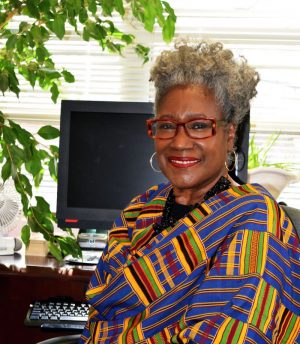
Iris Carlton-LaNey
Iris Carlton-LaNey, a former associate professor for the Department of Sociology, Anthropology and Social Work at the University of Charlotte, is hired as an associate professor for the UNC School of Social Work in 1994 and promoted to full professor six years later. By the time she arrives in Chapel Hill, Carlton-LaNey is already well on her way to becoming a nationally renowned scholar with an interest in aging issues and African American social welfare history. She also quickly earns the admiration of students and her peers, earning numerous teaching and faculty awards early in her tenure.
Fundraising goal
By June 1994, evidence of the work to strengthen the School of Social Work’s financial foundation are announced in an article in The Daily Tar Heel. School development leaders report they have raised 84% of a $10 million fundraising goal.
Tate, Turner and Kuralt
Much of the School’s fundraising success is due to the commitment and efforts of Charlotte businessman and former UNC trustee’s chairman John A. “Jack” Tate, Dean Emeritus John Turner and TV journalist Charles Kuralt. Their influence is so instrumental, it is announced that the School of Social Work’s new 75,000 square foot, $10 million building will be named after its three biggest supporters.
National ranking
In 1995, U.S. News & World Report ranks UNC School of Social Work 12th best graduate program in the nation.
New building dedication
A dedication ceremony for the School’s new campus building is held with N.C. Governor Jim Hunt and Charles Kuralt among the 500 individuals and speakers attending.
Campus partnerships
By the mid 1990s, the School’s growing partnerships with other groups and departments on campus help to broaden its academic influence and reach. Over one year, the School collaborates with the Women’s and Social Justice caucuses to host a conference examining the media’s influence on the sexual abuse of children; UNC School of Law for a conference examining race, class, gender and ethnicity; and Charles Kuralt for a live teleconference from Research Triangle Park on the challenges of social work in an ever-increasing violent society. The Kuralt event is broadcast via satellite to 300 colleges nationwide and draws an estimated 30K social and human service workers, students and community members.
Welfare restructuring
In August 1996, U.S. lawmakers support and President Clinton signs the “Personal Responsibility and Work Opportunity Reconciliation Act, which radically restructures the American welfare system. The provisions of the new law limit recipients of welfare benefits and enact a “welfare to work” initiative.
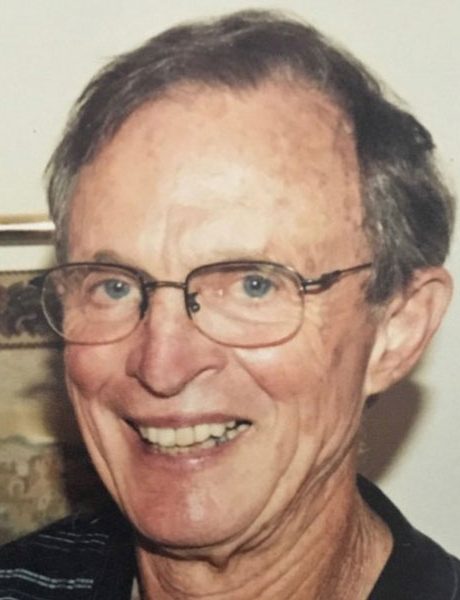
Carl Henley carries the Olympic torch
Social work professor Carl Henley represents UNC-Chapel Hill and demonstrates perseverance as a torchbearer for the Olympic torch run, one year after he suffered a spinal cord stroke that left him paralyzed along his right side. With intensive physical therapy, Henley learns how to walk again and carries the torch along Franklin Street in Chapel Hill during its route to the 1996 Summer Olympic Games in Atlanta, Ga. Henley, who earned a master’s degree in public health and Ph.D. in biostatistics, will go on to teach research methodology at the School for more than 30 years. A beloved teacher, who received multiple teaching awards during his three decades of service, Henley dies on July 23, 2019.
Non-profit leadership
Under Dean Richard Edwards, the School of Social Work begins to explore other ways to expand its programming and in 1996, the School launches a certificate program in non-profit leadership. Initial offerings include courses in nonprofit and public manage¬ment, fundraising for nonprofit organizations and leadership in nonprofit organizations and research on the nonprofit sector, including the effectiveness of donations to nonprofits — are they good investments.
Lithuania
Looking to broaden their reach internationally, School of Social Work faculty and administrative leaders spend a summer in Lithuania to help the newly liberated country develop and improve its educational system, which aims to create and distribute programs and research that help to strengthen families.
Harris Barton donation
Tar Heel graduate and former Carolina lineman Harris Barton donates $100,000 to the School of Social Work in honor of his late father Paul C. Barton, who had died of brain cancer two years earlier. At the time, the gift was the largest ever contributed by a professional athlete to UNC. The money was used to support a $2.5 million endowment for the School’s planned Institute for Families, helping to fund scholarships, research, training and other programs. Barton, a tackle with the San Francisco 49ers, said he was eager to give back to the University and chose the School after seeking advice from Dean and Linnea Smith.
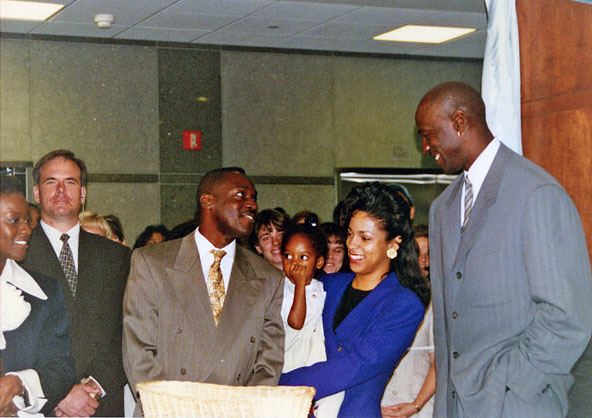
Jordan Institute for Families
The School’s planned institute gets a formal name in 1996 after the Jordan Family announces a $1 million gift to create the Jordan Institute for Families, a center that initially aims to address teen pregnancy, child neglect and elderly care. The donation is the largest ever donated to UNC from an active athlete. The following month, Michael and his Mother Deloris attend a ribbon cutting ceremony for JIF.
U.S. News & World Report ranking
With a new building, new programs, and nationally renowned faculty, the School’s star is rising. By 1997, the U.S. News & World Report ranks the School the 9th best graduate program in the country.
Charles Kuralt passes away
One of the program’s biggest supporters and one of the nation’s most beloved television journalists, Charles Kuralt dies on July 4, 1997. A Tar Heel to the end, Kuralt is laid to rest in the Old Chapel Hill Cemetery.
Jordan Institute for Families anniversary
A year after its launch, the Jordan Institute for Families commemorates its anniversary and honors its commitment to social work with a conference featuring Lea Rabin, widow of slain Israeli Prime Minister Yitzhak Rabin and an advocate for children and families. William Friday, president emeritus of the UNC system, hosts the September 1997 discussion, which focuses on the effects of violence and trauma on children and families.
All-star gala
The JIF anniversary celebration also includes an all-star gala at the Dean E. Smith Center, featuring UNC and NBA basketball great Michael Jordan; UNC former basketball player and starting guard for the Philadelphia 76ers Jerry Stackhouse; Mia Hamm, former UNC soccer player and Olympic gold medal winner, and other notable celebrities.
BHRP is created
The School’s Behavioral Healthcare Resource Program (BHRP) is created to help bridge the gap between research, academic resources and clinicians in the public mental health and substance abuse system. The program promotes evidence-based practices and tailors training, curricula development and technical assistance to meet individual provider needs. Years later, the program will be renamed to Behavioral Health Springboard.
National Institute on Social Work and Human Services in Rural Areas conference
In July 1998, the School hosts the National Institute on Social Work and Human Services in Rural Areas conference, bringing together practitioners and scholars from across the nation and Canada. The conference explores how rural communities are affected by welfare reform, an aging population, land loss, changing health care systems, the ecological and economic impact of corporate farming and distance education, as well as implications for people providing social work and human services in rural areas.
Ben Ruffin
One month later, Ben Ruffin, MSW ’86, becomes the first Black chair elected to the UNC Board of Governors. Ruffin, vice president of corporate affairs of R.J. Reynolds Tobacco Company, also serves as chairman of the corporate roundtable of the National Black Caucus.
Two new dual degree programs
With student interest growing in dual degrees, the School launches two new dual degree programs with the School of Law and Business Administration.
Research powerhouse
By the latter part of the decade, social work faculty are also helping the School to become a research powerhouse. In 1998, the School records historic research funding for one year, seeing a 65% increase from $3.71 million to $6.11 million. As a result, the School leads the pack among units receiving additional research dollars and helps the University eclipse $300 million in research funding for the first time.
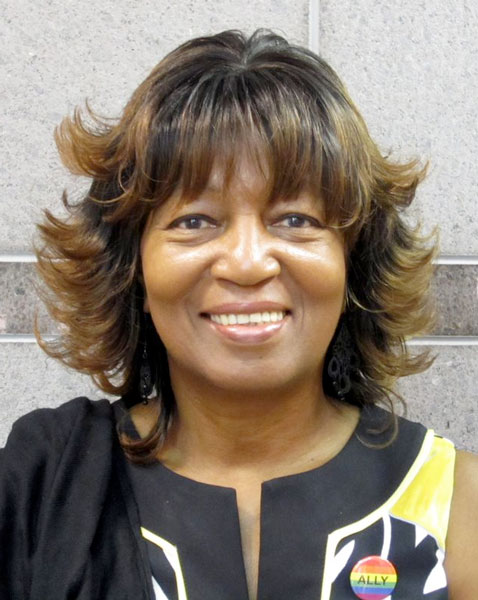
Amelia Roberts-Lewis
Amelia Roberts-Lewis, who has spent most of her career in California, joins the School as an assistant professor. Her primary interest is in research and evidence-based interventions for women, teen girls and the homeless with substance use and co-occurring mental health disorders and trauma histories. Over the next 10 years, Roberts-Lewis will also serve as the co-principal investigator of the School’s Behavioral Healthcare Resource Program, which provides statewide training and leadership in the fields of mental health, substance abuse, and developmental disabilities. She will also be awarded a 5-year, $2 million federal SAMHSA grant to provide evidence-based practices for a local nonprofit that serves the homeless and individuals with substance use and mental health disorders.
New undergraduate course
For the first time, undergraduates at UNC are given the chance to take a new course at the School of Social Work: SOWO 180 Foundations of Family Behavior. Professor Dennis Orthner, a renowned expert in family relationships, teaches the class, which focuses on strengthening families.
Focus on immigration issues
The School of Social Work and School of Law partner to host the 3rd annual Conference on Race, Class, Gender and Ethnicity. The theme: immigration issues.
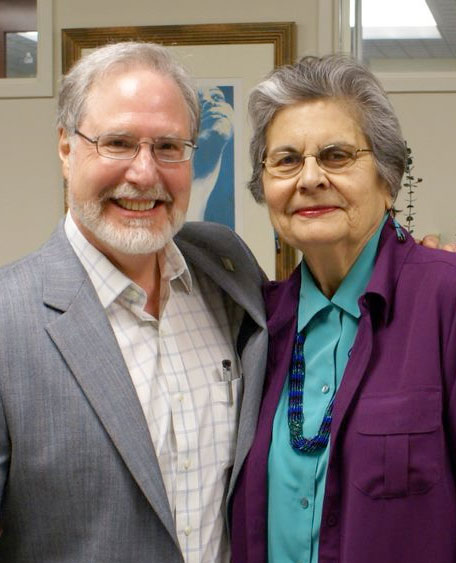
Ada Deer speaks at the School
Ada Deer, former assistant secretary of Indian Affairs in the U.S. Department of the Interior, speaks at the School. Deer is a senior lecturer in social work and American Indian studies at the University of Wisconsin-Madison.
The Jordan Institute for Families partnership with the state
The Jordan Institute for Families partners with the state to help direct the N.C. Child Welfare Education Collaborative, which was created to address the welfare workforce crisis in North Carolina. The collaborative and its partner universities aim to train student scholars for practice in public child welfare. These scholars receive financial support in exchange for their commitment to work in social services agencies across the state following graduation.
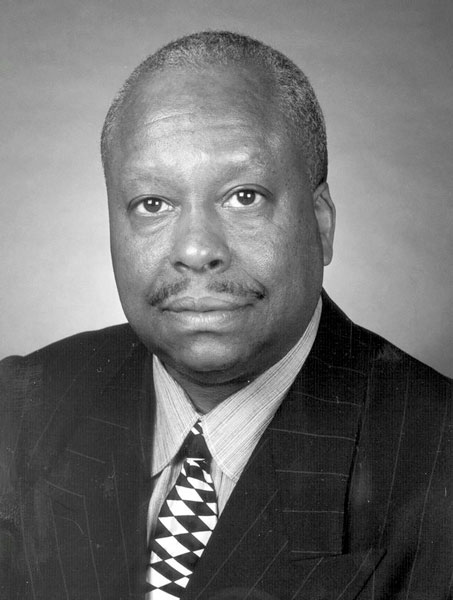
Walter C. Farrell Jr.
The School welcomes Walter C. Farrell Jr. to the faculty. Farrell, a graduate of Michigan State University, is the former professor and chairman of the Department of Educational Policy and Community Studies at University of Wisconsin– Milwaukee. He still serves as educational policy fellow for Centers for Education Research, Analysis, and Innovation and the Education in the Public Interest Center at Arizona State University and University of Colorado at Boulder, respectively. At UNC, Farrell will also be working as associate director of the Urban Investment Strategies Center at the Frank Hawkins Kenan Institute of Private Enterprise, UNC’s Kenan-Flagler School of Business. Farrell joins the School of Social Work as a professor of management and community practice.
Columbine High School shooting
On April 20, 1999, two teens go on a shooting spree at Columbine High School in Colorado, killing 12 students and one teacher and wounding more than 20 others. At the time, the school shooting is the worst in U.S. history.
2000s
Eleanor Smeal
In February 2000, Eleanor Smeal, former president of the National Organization for Women and current president and co-founder of the Feminist Majority Foundation, speaks at the School of Social Work as part of a 48-campus tour of U.S. colleges. She urges students to get involved in the work for social justice.
21st annual Black Experience Workshop
A month later, the School of Social Work hosts the 21st annual Black Experience Workshop. Founder Audreye Johnson notes this year’s theme, “Breathing While Black,” focuses on the continual struggle of being Black in America.
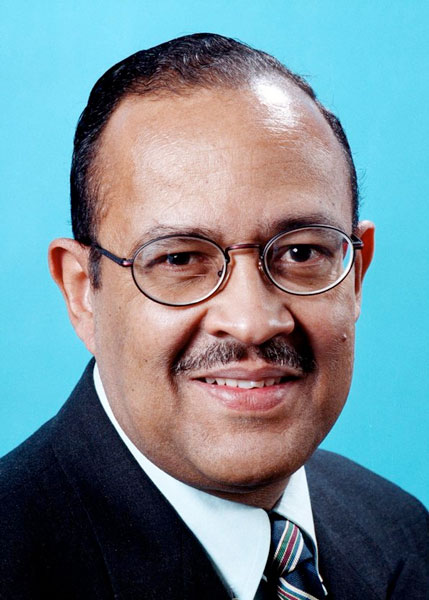
Oscar Barbarin
The School welcomes Oscar Barbarin, a former professor at the University of Michigan, to the faculty. Barbarin, who will also serve as a researcher with the Frank Porter Graham Child Development Institute, is leading groundbreaking work on the mental health needs of children. His research also includes early childhood education and the social competence of Black and Latino boys. Barbarin, who remains at the School for nine years, will go on to lead several national studies of young children at risk of behavioral, emotional and academic difficulties.
Dean Edwards steps down
In early 2001, Dean Richard Edwards announces he is stepping down and returning to teaching, launching a search for a new dean. At the time, Edwards is also serving as the interim provost for 6 months following the retirement of former provost Dick Richardson. Professor Kim Strom is appointed interim School of Social Work dean during Edward’s tenure as provost.
7th annual Sonja H. Stone Memorial Lecture
About 250 people gather at the School to hear Atallah Shabazz, the eldest daughter of civil rights leaders Betty Shabazz and Malcolm X, deliver the 7th annual Sonja H. Stone Memorial Lecture.
Higher ranking
U.S. News & World Report ranks the School of Social Work 4th best graduate social work program in the country.
Chairwoman of the doctoral program dies
In January 2002, beloved faculty member Anne-Linda Furstenberg, chairwoman of the School’s doctoral program, dies at age 61, following complications from a long-term illness. Furstenberg, who researched the mental and physical health of older adults, had served the School for 16 years. She played a huge role in helping to develop the School’s Ph.D. program.
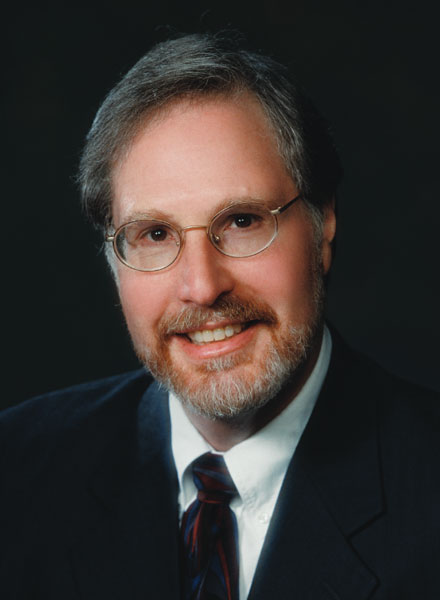
Jack Richman named dean
By the fall, Professor Jack Richman, who has been with the School since 1983, is named the new Dean of the School of Social Work. Over the next 14 years, Richman will lead the School’s efforts to double the number of distinguished endowed professorships; increase funding available to support MSW and Ph.D. students by 700 percent; broaden the School’s global reach in teaching, research and service through partnerships with universities in China, Sweden and India and strengthen the School’s technology capabilities, including web conferencing and online courses, among other achievements.
Concerns with an instructor
In February 2003, new Dean Jack Richman meets with more than 250 students, faculty and staff in a town hall meeting to address complaints about a contract instructor, who made racist comments during a class on social work and practice with couples. Two-thirds of students enrolled in the class drop from the course, and the instructor resigns shortly thereafter.
Students work with the Town of Chapel Hill
School of Social Work students work with the Town of Chapel Hill to craft a socially responsible alternative to panhandling, an issue town leaders say has grown more problematic for downtown businesses.
Dual MSW/divinity degree
For the first time, the School partners with another university to offer a dual degree program. This partner, Duke University, is just down the road and collaborates with the UNC School to create a dual MSW/divinity degree. Assistant professor Amelia Roberts-Lewis developed and coordinates the new dual degree program.
$2.5 million in federal funding
Several months later, the School of Social Work receives $2.5 million in federal funding to support four projects that aim to better prepare and retain child welfare workers and enhance prevention services to families.
U.S. News & World Reports ranking
In 2004, U.S. News & World Reports ranks UNC School of Social Work 7th best graduate social work program in the nation.
Legislation for same-gender couples
In May 2004, Massachusetts becomes the first state to approve legislation allowing same-gender loving couples to marry.
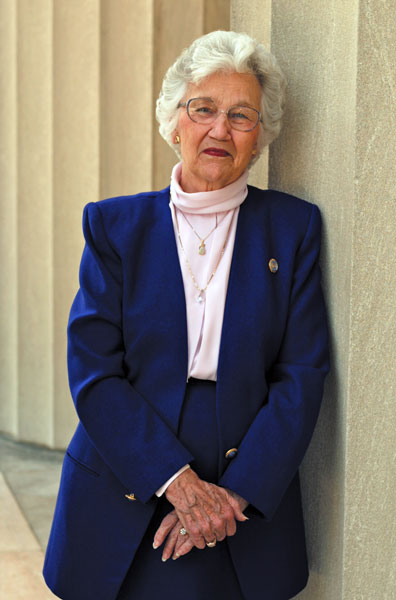
$1.2 million donation
This same year, former social worker Miriam McFadden, a Tennessee resident and member of the School of Social Work’s Board of Advisors, donates $1.2 million to help recruit and retain social work faculty.
Clinical Lecture Series launch
The School launches the Clinical Lecture Series, a series of workshops providing lunchtime trainings on best practices for students, professionals, community members, and all who are caring for individuals and families in ways that are therapeutic, anti-oppressive, intersectional, and centered on self-determination.
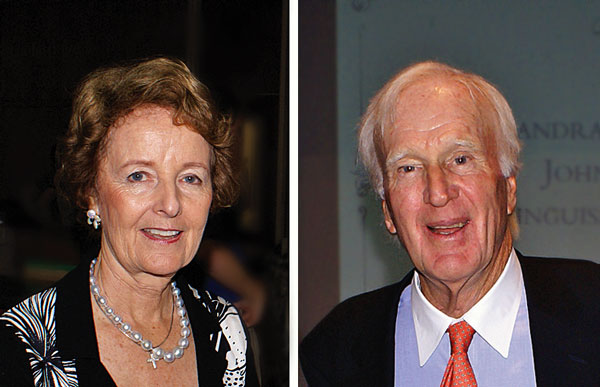
Gifts from long-time generous friends of the School
This decade is remembered for generous gifts from long-time generous friends of the School, including from Board of Advisors member Miriam McFadden, who donates a historic $1.2 million to help the School recruit and retain faculty. Philanthropists Sam and Betsy Reeves also donate $1 million to establish an endowed professorship.
Record $593 million in University research funding
Of the record $593 million in research funding that the University receives overall for the 2006 academic year, nearly $8.7 million goes to the School of Social Work.
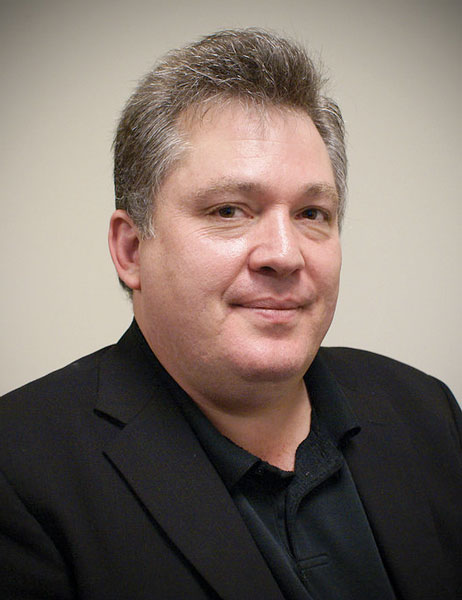
Matthew O. Howard
Professor Matthew O. Howard joins the School of Social Work after three years as a professor of social work and a professor of psychiatry at the University of Michigan. Howard is known nationally for his expertise in inhalant substance abuse/disorders, substance use among juvenile offenders, and alcohol dependence. His work in these areas will earn him significant recognition, including induction as a member and fellow of the New York Academy of Medicine in 2010. He will also serve as an associate faculty research fellow for the Cecil G. Sheps Center for Health Services Research at UNC, and associate dean for faculty development and associate dean for doctoral education from the School of Social Work.
Bush signs bill
President Bush signs a bill in support of the construction of a 700-mile fence along the Mexico/Texas border to help prevent immigrants without proper documentation from crossing over into the states.
Strong Couples, Strong Children
Anne Jones, a clinical associate professor, receives a $2.5 million federal grant to support the new “Strong Couples, Strong Children” intervention, a five-year project designed to strengthen the relationships of unmarried, economically disadvantaged new parents. The project focuses on teaching communication and conflict management skills to help couples develop healthier couple and co-parenting relationships. The initiative, which shows success, involves partnerships with Durham County’s Public Health Department, Cooperative Extension Services and many other Durham community and faith-based organizations.
$300,000 award
In February 2007, the Robert Wood Johnson Foundation awards associate professor Mimi Chapman $300,000 for “Creating Confianza,” one of 15 projects selected from across the country that focuses on the mental health needs of underserved children and youth, especially those within immigrant and refugee families.
Florence Soltys
The School community mourns the loss of associate clinical professor Florence Soltys who died in September 2007. Soltys, a beloved teacher with the schools of Social Work, Medicine and Nursing, was known across the state and nation for her fearless advocacy on behalf of aging adults and their families. Born in Tennessee, Soltys earned an undergraduate degree in nutrition and institutional management and then did post-graduate work at Massachusetts General Hospital in Boston. She moved to Chapel Hill in 1975, where she worked as a volunteer and helped establish Meals on Wheels in Orange County. After completing her MSW in 1984, Soltys served Hospice of Durham for two years before being recruited by Dean John Turner to teach at the School. During her tenure, she helped to develop coursework on older adults, assisted with several lecture series on aging, worked on the development of the School’s Center for Aging Research and Educational Services, and created lectures that led to the development of the School of Medicine’s Program on Aging.
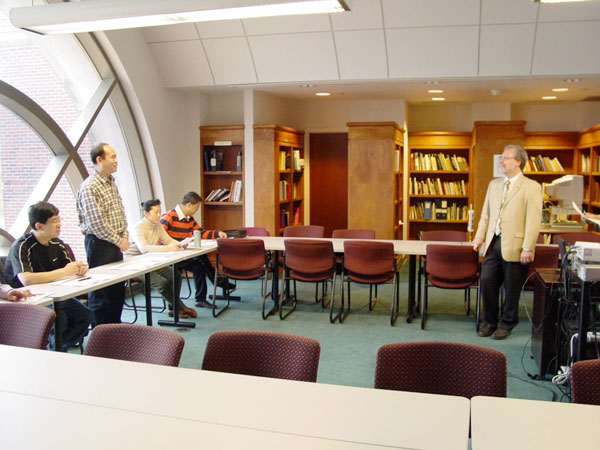
International partnership
The School of Social Work partners with the School of Social and Public Administration at the East China University of Science and Technology in Shanghai. The international partnership is the School’s first and will enable the academic institutions to work together to better prepare social workers for practice in China, where the social work profession is still new and developing. The partnership also aims to offer student and faculty exchange opportunities between the universities.
National financial crisis
In December 2007, a declining U.S. economy explodes into a freefall as the country’s housing market collapses, sending markets crashing and deepening an overall national financial crisis. The crisis is largely attributed to risky mortgage loans and predatory private mortgage lending in an unregulated market. Over the next few years, nearly 10 million Americans will lose their homes; 9 million will lose their jobs and nearly 50 million will wind up in poverty as a result of the financial crisis.
Sandra Reeves Spears and John B. Turner Distinguished Professorship
Sam and Betsy Reeves of Fresno, Calif., donate $1 million to the University of North Carolina at Chapel Hill to establish the Sandra Reeves Spears and John B. Turner Distinguished Professorship at the School of Social Work.
U.S. News & World Report ranking
In 2008, U.S. News & World Report ranks the UNC School of Social Work 8th best graduate social work program in the nation.
$16.5 million federal grant
Jordan Institute for Families director Nancy Dickinson and professor Gary Nelson are awarded a five-year, $16.5 million federal grant for the National Child Welfare Workforce Institute. Eight other universities around the country and the National Indian Welfare Association are collaborating on the initiative that aims to develop leaders within child welfare agencies, generate effective workforce practices and improve outcomes for children and families.
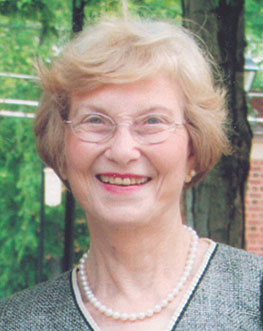
Melvarene Johnson Howard Adair
In June 2008, Alumna and retired social worker Melvarene Adair, MSW ’76, establishes a charitable gift annuity of $1.4 million – one of the largest commitments the School has ever received. The generous gift is used to create a $1 million endowment for the Johnson-Howard-Adair Distinguished Professorship, and targets a scholar or distinguished teacher interested in the impact and influence of poverty on individuals, families and communities. The money also supports an existing scholarship, which was created by Adair’s son, Kenneth Howard, in his mother’s honor.
More affordable mental health and substance abuse services
The Mental Health Parity and Addiction Equity Act passes in 2008, requiring insurance coverage for mental health services at the same level of coverage for physical health issues. The new law means mental health and substance abuse services are now more affordable for many people.
Passing of John A. “Jack” Tate
The community comes together in October 2008 to mourn the passing of John A. “Jack” Tate, the Charlotte businessman and philanthropist whose commitment to the School helped strengthen its financial success.
First Black chief executive of the United States
Democratic Senator Barack Obama defeats Sen. John McCain and is elected the 44th president, becoming the first Black chief executive of the United States.
Lilly Ledbetter Fair Pay Act
In January 2009, President Barack Obama signs the Lilly Ledbetter Fair Pay Act into law, making it easier for employees to challenge unequal wages and to address the disparities in pay between men and women.
Passing of John B. Turner
A month later, Dean Emeritus John B. Turner, whose leadership guided the School during its biggest growth period of the 1980s, dies at the age of 86. His career in social work spanned more than 40 years and his efforts and leadership helped earn national recognition for the School of Social Work. A writer, scholar and teacher, Turner was UNC’s first Black dean and devoted his life to teaching, community action and organization.
Charles Keith Springle
Social worker and Navy commander Charles Keith Springle, MSW ’84, was among five people shot and killed at a military clinic in Baghdad in May 2009. Springle, a decorated officer, husband and father of two, was 52. He was assigned to the 55th Medical Company and served as the director of the Community Counseling Center at Camp Lejeune, N.C. At the time, the shooting was reported as the “deadliest case of soldier-on-soldier violence” among American forces in the six-year Iraq war.
New endowed professorships and scholarships
The School raises $21.3 million — 152% of its goal – as part of the Carolina First campaign. The funds will be used to create three new endowed professorships and 14 new scholarships.
Winston-Salem program expansion
In 2009, the School expands its Winston-Salem program to offer students two areas of concentration: direct practice and management and community practice.
Passing of Gary L. Shaffer
In September 2009, Gary L. Shaffer, one of the state’s leading experts on social work practice and a staunch advocate for children who became a recognizable voice against the use of corporal punishment within North Carolina’s public schools, dies at age of 62.
Hate Crimes Prevention Act
President Obama signs the Matthew Shepard and James Byrd, Jr., Hate Crimes Prevention Act to help jurisdictions investigate and prosecute hate crimes more effectively.
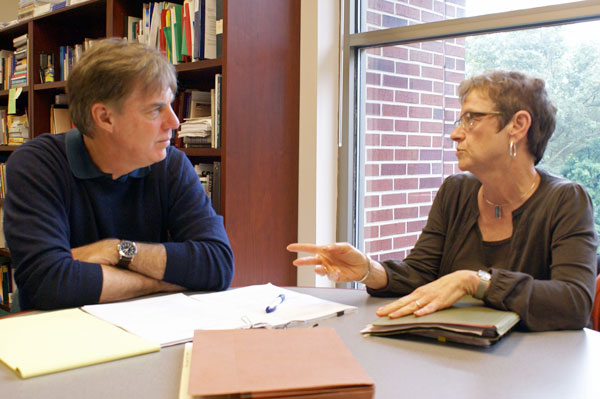
Bowen and Zipper awarded $1 million grant
Professor Gary Bowen and clinical professor Irene Zipper are awarded a five-year $1 million grant for their project, “Strengthening Military Families with Children Who Have Developmental Disabilities.” The project is being piloted at Camp Lejeune and will target Marine Corps service members who live off base, with a goal of connecting these families with needed services and support for their children with developmental disabilities.
2010s

Landmark global research study
Assistant professor Gina Chowa is co-principal investigator of “YouthSave,” a landmark global research study funded by a $12.5 million grant from The MasterCard Foundation. The five-year project focuses on how and why youth in the countries of Ghana, Colombia, Kenya, and Nepal save money and potential ways to increase their access to financial services. Chowa joined the faculty in 2008 and works to elevate the School’s reach internationally. Her work focuses on the intersection of economic security, workforce development, social protection, and financial inclusion and its impact on marginalized individuals in the Global South.
Obamacare
In March 2010, the Patient Protection and Affordable Care Act or Obamacare, becomes law, increasing healthcare affordability and access to millions of Americans. The law will survive numerous court challenges over the next decade.
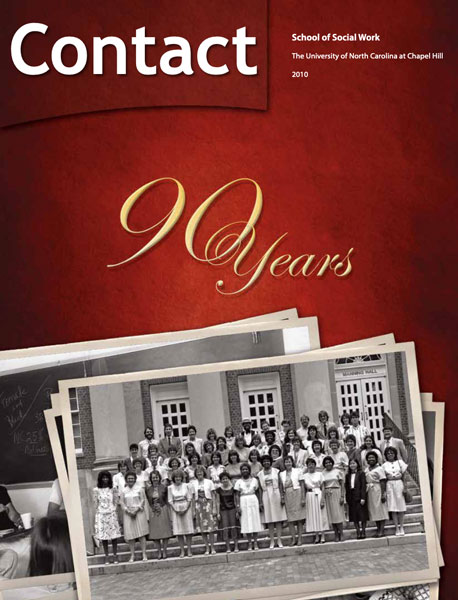
90th anniversary
The School celebrates its 90th anniversary with a special edition of Contact magazine. View photos from our anniversary gallery.
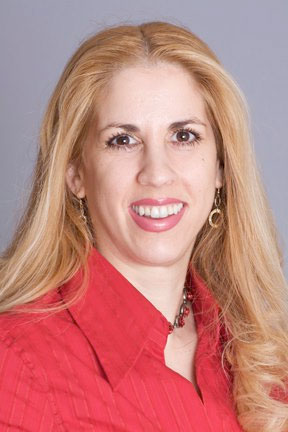
Michal Grinstein-Weiss
Associate professor Michal Grinstein-Weiss collaborates with researchers from Urban Institute and the Center for Social Development on a $1.6 million project to study the long-term impact of individual development accounts (IDAs) and asset-building on social and economic well-being. The project is partly funded by the John D. and Catherine T. MacArthur Foundation and the Rockefeller Foundation.
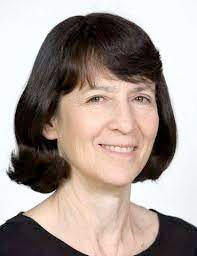
JoAnn McCachern Swart
Alumna JoAnn McCachern Swart, MSW ’78, of Castle Hayne, N.C., is named the 2010 Social Worker of the Year by the N.C. Chapter of the National Association of Social Workers.
Amelia Roberts-Lewis
Associate professor Amelia Roberts-Lewis is awarded a 5-year, $2 million grant from the federal Substance Abuse and Mental Health Services Administration to help strengthen treatment services for homeless adults with a substance use disorder or co-occurring substance use and mental health disorder.
Efforts to reduce youth violence in Robeson County
An interdisciplinary team of UNC researchers helps to launch the nation’s first center to provide community support and solutions for preventing and reducing youth violence in Robeson County, N.C. School of Social Work Professor Paul Smokowski leads the project, which is funded by a nearly $6.5 million federal grant.
Partner universities
School leaders sign “memorandums of understanding (MOUs)” to create graduate student exchange programs with the Maharashtra Institute of Technology (MIT) in Pune, India and with the School of Health, Care and Social Welfare at Mälardalen University in Västerås, Sweden. These new agreements will enable UNC to send up to two social work students per semester — four students per year — to study at the partner universities.
Funding cuts
As state lawmakers scramble to make up an estimated $2.4 billion shortfall in North Carolina’s budget, UNC learns it will be hit the hardest among the 17 campuses with a funding cut of nearly 18 percent. The decrease affects all departments and units across campus, including the School of Social Work, which faces a loss of $750,000. Dean Jack Richman and school leaders make the difficult decision to suspend the advanced standing MSW program in Winston-Salem and the Mountain Area MSW program, both of which target working professionals.
Cordelia B. Steele
Cordelia B. Steele, MSW ’89, of Rockingham, N.C. is named the 2011 Social Worker of the Year by the N.C. Chapter of the National Association of Social Workers. Steele is honored for more than 30 years of service in rural social work practice, including as a consultant, administrative and clinical supervisor, mentor, educator, policy developer and community organizer.
Act helps schools
The Healthy, Hunger-Free Kids Act is signed into law, funding nutrition and free lunch programs for schools.
Don’t Ask, Don’t Tell repeal
Don’t Ask, Don’t Tell is repealed, allowing individuals who identify as gay, lesbian or bisexual to openly serve in the military.
Carlton-LaNey, CSWE’s 2011 Feminist Scholarship Award winner
Professor Iris Carlton-LaNey is the recipient of the Council on Social Work Education (CSWE)’s 2011 Feminist Scholarship Award. Established by CSWE’s Women’s Council, the award recognizes innovative scholars who contribute to the advancement of feminist knowledge as it pertains to social work theory, research, practice, and education. In addition, the program honors an accomplished scholar whose work has contributed to social work practice, policy, and research that focuses on the intersections of gender and social justice.
Study to test the use of motivational interviewing
The National Institute of Health awards assistant professor Gary Cuddeback $615,000 for a three-year feasibility study to test the use of motivational interviewing, an evidence-based practice that psychologists, social work practitioners and counselors often use as a way of helping individuals with substance abuse disorders and mental illness to engage in treatment and to pursue permanent change in their lives. The study will focus on the mental health court that serves Orange and Chatham counties.
100 most influential social work scholars
In a study published in The British Journal of Social Work, six UNC School of Social Work faculty (Gary Bowen, Mark Fraser, Matthew Howard, Jack Richman, Larry Rosenfeld and Paul Smokowski) are named among the 100 most influential social work scholars.
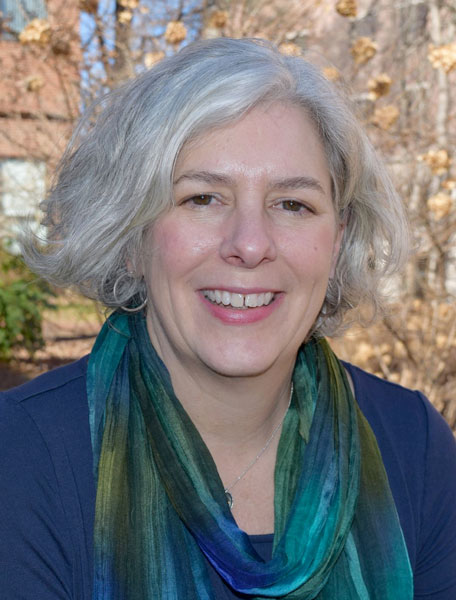
Barbara “Bebe” Smith
Barbara “Bebe” Smith, MSW ’93, is named the 2012 Social Worker of the Year award by the North Carolina Chapter of the National Association of Social Workers. Smith, co-director of the UNC Center for Excellence in Community Mental Health and a clinical assistant professor with the UNC Department of Psychiatry, is honored for her work in mental health.
Trayvon Martin
On Feb. 26, 2012, George Zimmerman, a neighborhood watch captain in Sanford, Fla., fatally shoots Trayvon Martin, an unarmed young Black teen, after Zimmerman reports Martin as a suspicious person walking through the community. Martin was returning to his father’s home after purchasing candy from a local convenience store. Zimmerman is charged with murder several months later and then found not guilty in a jury trial more than a year later.
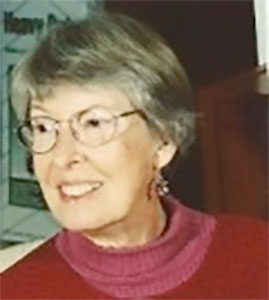
Passing of Pat Sipp Bartell
Pat Sipp Bartell, MSW ’69, former faculty member and assistant to Dean John Turner, dies. Bartell started her career in social work at the North Carolina Correctional Center for Women and as coordinator for special projects at the North Carolina Department of Human Services. After graduation, she took on roles focused on the welfare of children and families, including foster care placement, group care, adoption, and child welfare initiatives. A former director of the Department of Human Services Family Training Project, she also served as deputy director of the North Carolina Rural Family Planning Project and as director of social services and director of volunteer services for the Chapel-Hill Carrboro Head Start Program. She served as a special assistant to Dean Turner in the late 1980s and as a lecturer at the School.
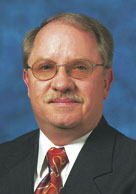
Danny Rice
Danny Rice, MSW ’82, is named 2012 Citizen of the Year by the Kinston-Lenoir County Chamber of Commerce. As the national director of Woodmen of the World, Rice has been involved with numerous community projects in Lenoir County for more than 30 years, including extensive work with the Boy Scouts of America and Big Brothers/Big Sisters, and serving as a founding member of the Lenoir County Friends of the Homeless, Inc., an organization on a mission to provide housing for transient families. A retired director of specialized services from the Caswell Center, a non-profit serving individuals and families with developmental disabilities in eastern North Carolina, Rice is the recipient of the N.C. Governor’s Award for Excellence for his contributions in public service.
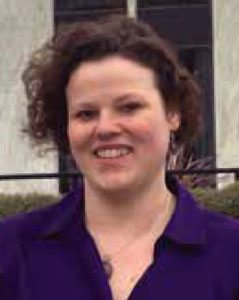
Jenny Gadd
MSW student Jenny Gadd receives the Myrna Miller Wellons Advocacy Award, from the N.C. chapter of the National Association of Social Workers for her persistent advocacy efforts to promote higher quality services within adult mental health group homes.
Black Student Caucus
UNC School of Social Work’s Black Student Caucus receives a 2013 University Diversity Awards recognizing their significant contributions to the enhancement, support and furtherance of diversity on the Carolina campus and in the community. The Caucus won in the Student Organization category.
#Black Lives Matter
#Black Lives Matter organizes and forms in the summer of 2013 in response to the acquittal of George Zimmerman in the shooting death of Trayvon Martin. The movement grows nationally following the deaths of Michael Brown in Missouri and Eric Garner of New York, both of whom were shot and killed by police officers. In 2020, after George Floyd dies at the hands of police, in Minneapolis, Minn., #Black Lives Matter inspires worldwide demonstrations protesting police brutality and systematic racism that overwhelmingly affects the Black community.
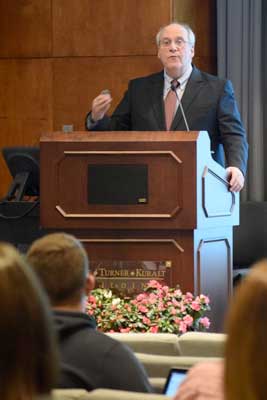
Wicked Problems Institute
Distinguished professor Mark Testa, an influential scholar in child welfare, guides the School’s partnership with the American Children Society to launch the Wicked Problems Institute, a series of national roundtable meetings aimed at forging solutions to keep children safe and healthy.
Dennis Orthner retirement
After more than 45 years of collective service in research and education, including at colleges and universities in North Carolina, Florida, and Georgia, Dennis Orthner, professor and associate director for Policy Development and Analysis at the Jordan Institute for Families, retires. Orthner is responsible for helping kickstart the School’s research funding and developing the School into a research powerhouse, starting with his own research on issues affecting vulnerable children and families, including poverty and public education.
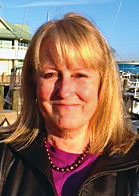
Deborah Grey
Deborah Grey, MSW ’79, is named 2013 Social Worker of the Year by the N.C. Chapter of the National Association of Social Workers. Grey is honored for substantial contributions to the social work profession through her work as a forensic clinical social worker and mitigation specialist in capital murder cases.
Passing of Deborah Vassar
In April 2013, Deborah Vassar, a clinical instructor and education specialist with the School’s Center for Aging Research and Educational Services (CARES), and the Family and Children’s Resource Program (FCRP), dies unexpectedly. Vassar, a beloved faculty member, had served the School of Social Work on and off for 20 years.
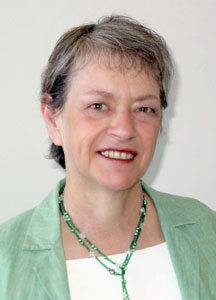
Irene Nathan Zipper retirement
Irene Nathan Zipper, Ph.D. ’96, MSW ’73, director of the Family Support Program retires after 40 years of dedicated public service, including supporting families with children who have special needs.
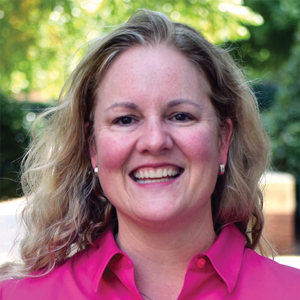
Violence prevention research
The School continues to lead the way in violence prevention research. In August 2013, researcher Rebecca Macy publishes results from a groundbreaking 5-year study on domestic violence prevention. Findings show that women who complete an intervention program designed to improve their families’ safety, strengthen their self-esteem, and enhance their parenting skills are less likely to be re-victimized and more likely to leave an abusive spouse or partner. Macy, a leading scholar on interpersonal and relationship violence, was recently named the L. Richardson and Emily Preyer Distinguished Chair for Strengthening Families. The $1 million endowed chair was created to expand the School’s capacity to serve North Carolina families and children in need. The chair was named in honor of the former U.S. representative who served six terms in Congress, and his wife, a long-time philanthropist. Both were staunch advocates for education, the environment, and the arts.
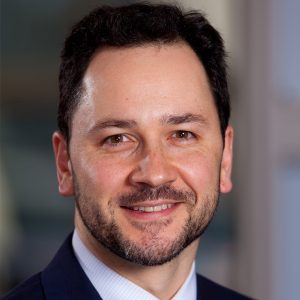
Refugee Mental Health and Wellness Initiative
With more refugees settling into the United States, clinical instructor Josh Hinson launches the innovative “Refugee Mental Health and Wellness Initiative,” which aims to assess the mental health needs of newly arriving refugees to North Carolina and connect them to services.
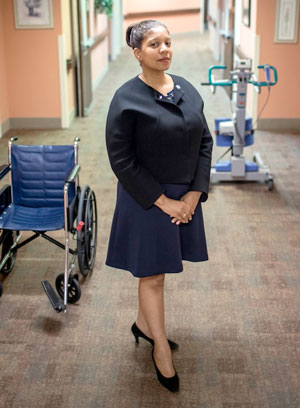
Christina Horsford
Doctoral student Christina Horsford is selected for the 4th cohort of the Association for Gerontology Education in Social Work’s Gerontological Social Work Pre-Dissertation Initiative. The honor recognizes her potential in the field of gerontological social work.
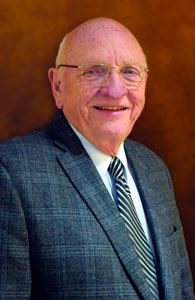
Bobby Boyd Lecture Series launches
The School launches the inaugural Bobby Boyd Leadership Lecture with special speaker Bryan Samuels, executive director of Chapin Hall at the University of Chicago and former commissioner of the Administration on Children, Youth and Families at the U.S. Department of Health and Human Services. Samuels will speak on “Leadership, Evidence and Accountability in Child Welfare.” Boyd, MSW ’69, is a member of the School’s Distinguished Alumni who retired in 2008 following a 30-year career as director of Catawba County Social Services (CCSS). Boyd’s former CCSS staff established the Bobby Boyd Leadership Fund, which supports the lecture series and other leadership development for social work students, with the purpose of sustaining Boyd’s vision of focusing on results and excellence in public service.
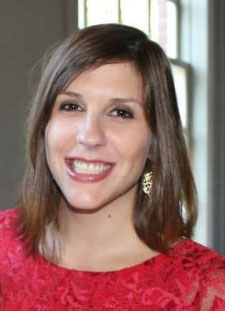
Aspiring advocate
MSW student Annie Peacock receives the Aspiring Advocate Award from the North Carolina Coalition Against Domestic Violence. The award highlights the next generation of leaders and the essential role young activists’ play within the violence against women movement. The award is given to a young person with a deep commitment to social justice, ending violence against women and a proven ability to transform this commitment into effective action.

Substance use in biracial youth
The National Institutes of Health awards Trenette Clark $829,000 grant to study substance use in biracial youth. The five-year federal grant is among those designated for leading research scholars across the country.
Matthew Howard honored for teaching
Matthew Howard is a recipient of UNC’s 2014 Distinguished Teaching Award for Post-Baccalaureate Instruction. Each year, only four UNC faculty are selected for the prestigious Distinguished Teaching Award. Previous winners from the School of Social Work include Kathleen Rounds, 1996; Florence Soltys, 2001; Iris Carlton-LaNey, 2006; and Shenyang Guo, 2010.
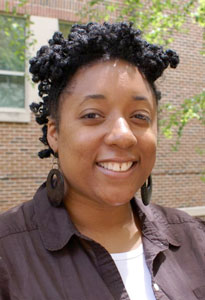
Tiffany Washington
Tiffany Washington, Ph.D. ’13, is the winner of the 2014 Student Award for Social Work Research, from the Group for the Advancement of Doctoral Education in Social Work. The award is given annually to an individual doctoral student or collaborative group of students, whose scholarship advances scientific inquiry in social work or social welfare.
UNC-PrimeCare
In 2014, the School launches UNC-PrimeCare after receiving $2.2 million in federal grants. The innovative initiative aims to rigorously prepare MSW students to work side-by-side with medical professionals to assess and treat children and young adults who have mental health or substance use disorders or who are at risk of developing them.
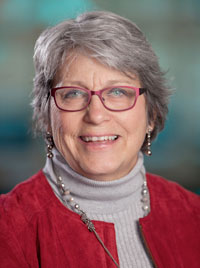
Joanne Caye retirement
After more than 40 years of social work practice and teaching, clinical associate professor Joanne Caye retires. Caye, MSW ’82, has been involved in the field of social work since 1970, including as a direct practice social worker, supervisor, and program administrator at the local and state levels in Pennsylvania, Louisiana, and North Carolina. She has served on UNC faculty since 1993.
UNC Satir Program
The School of Social Work receives a $100,000 private donation to develop a certification program and a summer training that embrace the teachings of the late Virginia Satir, a social worker and “pioneer of family therapy.” The money will also be used to support research into the efficacy of the Satir method and to fund the hiring of a part-time coordinator to help develop and maintain the program curricula and promote the summer institute.
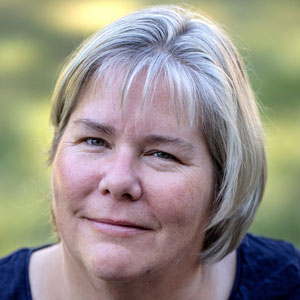
Amy Blank Wilson
Assistant Professor Amy Blank Wilson joins the School from Cleveland, Ohio, where she served on the faculty of the Jack, Joseph and Morton Mandel School of Applied Social Sciences at Case Western University. Wilson’s research interests include interventions for people with serious mental illness involved in the justice system, and criminal thinking and criminogenic risk in people with serious mental illness.
Partnership with an international institution
Looking to further expand its reach around the world, the School moves to partner with an international institution to increase opportunities for joint research and teaching. The School signs a five-year memorandum of understanding with the Centre for Studies in Rural Development, Institute of Social Work and Research in Ahmednagar, India. The Centre, which is affiliated with the University of Pune, established a relationship with the School three years ago, having served as a host to UNC students, faculty, and others as part of a study abroad program.
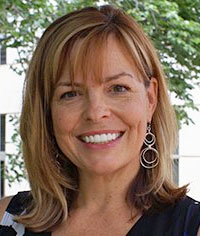
Passing of Teresa Ilinitch
The School once again mourns the loss of one of its own, when Teresa Ilinitch unexpectedly dies at age 50 on Feb. 3, 2014. Ilinitch joined the School of Social Work in 2009 as a project coordinator for the Family and Children’s Resource Program. A nationally known expert in family-centered practice and family group decision making, Ilinitch was hired to lead a national project to train state level child welfare managers on leadership and organizational change management.
Fellows of the Society for Social Work and Research
Four professors from the School are inducted into the inaugural class of Fellows of the Society for Social Work and Research: Drs. Gary Bowen, Mark Fraser, Shenyang Guo and Matthew Howard. Fellows of the Society for Social Work and Research are SSWR members who have served with distinction to advance the mission of the Society — to advance, disseminate, and translate research that addresses issues of social work practice and policy and promotes a diverse, equitable and just society.
50 years of service
Developmental Disabilities Training Institute (DDTI) marks 50 years of service.

Research on aging
UNC researchers continue to publish groundbreaking research on aging. In a first-of-its-kind national study, co-authored by Distinguished Professor Sheryl Zimmerman, researchers confirm that assisted living communities are a primary provider of residential care for older adults with dementia and that an estimated 7 out of 10 adults in these residences have some form of cognitive impairment.
Rights of LGBTQ employees
President Obama signs an executive order protecting the rights of LGBTQ employees in the workplace.
Michael Brown
On Aug. 9, 2014, police officer Darren Wilson shoots and kills Michael Brown, an unarmed Black teenager, in Ferguson, Missouri, a suburb of St. Louis. The shooting leads to protests and riots in Ferguson and spread quickly across the country.
Child welfare practice-based research network
Children’s Home Society of America and the University of North Carolina at Chapel Hill’s School of Social Work launch a child welfare practice-based research network to help inform and improve local, state and national policies around child welfare and well-being.
Hettleman Prize winner
Associate professor Gina Chowa is the winner of UNC’s prestigious 2014 Phillip and Ruth Hettleman Prize for Artistic and Scholarly Achievement by Young Faculty. The Hettleman Prize recognizes the achievements of outstanding junior tenure-track faculty or recently tenured faculty. Chowa remains a rising star within the field of asset building due to her groundbreaking work in examining the effects of asset ownership on youth and families in under resourced countries.
Jennifer Shrewsberry
Jennifer Shrewsbury, MSW ’93, is named a recipient of the 2014 Governors Award for Excellence in Public Service. Shrewsbury is a clinical social work supervisor, DMH/DD/SAS, with the N.C. Department of Health and Human Services at Central Regional Hospital in Butner.
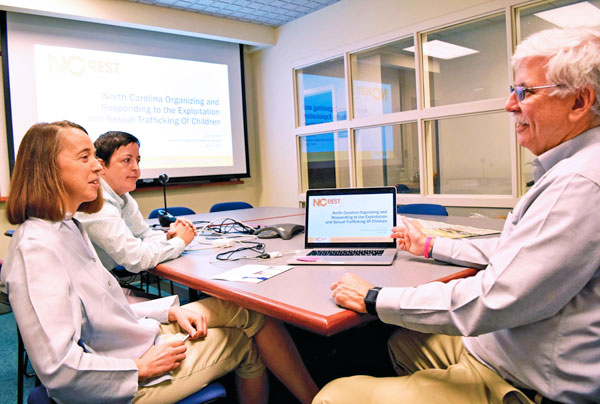
Project NO REST
School researchers are awarded a $1.24 million federal grant to address child trafficking in North Carolina. Research professor Dean Duncan will use the five-year grant to launch Project NO REST, a collaborative effort focused on increasing awareness of sexual and labor trafficking among children and youth involved in the state’s child welfare system, especially those in foster care. The project, which stands for “North Carolina Organizing and Responding to the Exploitation and Sexual Trafficking of Children,” aims to reduce the number of youth who are trafficked in the state—which ranks 8th in the nation in potential cases—and to improve the outcomes for those who have been victims.
Barbara “Bebe” Smith
School of Social Work Clinical Assistant Professor Barbara “Bebe” Smith is named the winner of the 2015 Robert E. Bryan Public Service Award from UNC for her work on an intensive case management intervention that aims to help people with mental illness and complex social needs, such as homelessness.
Annie McCullough
Annie McCullough Chavis, Ed.D, MSW ’87, a professor in the Department of Social Work at Fayetteville State University, is named a 2015 recipient of the University of North Carolina Board of Governors Award for Excellence in Teaching.
Impact of teen courts on school safety
The N.C. Academic Center for Excellence in Youth Violence Prevention (NC-ACE) — a collaboration of UNC’s School of Social Work and the UNC Injury Prevention Research Center — partners with two dozen schools in Columbus and Robeson counties to examine the impact of teen courts on school safety. Columbus County Schools was awarded a nearly $1.5 million grant from the National Institute of Justice to support the three-year research project.
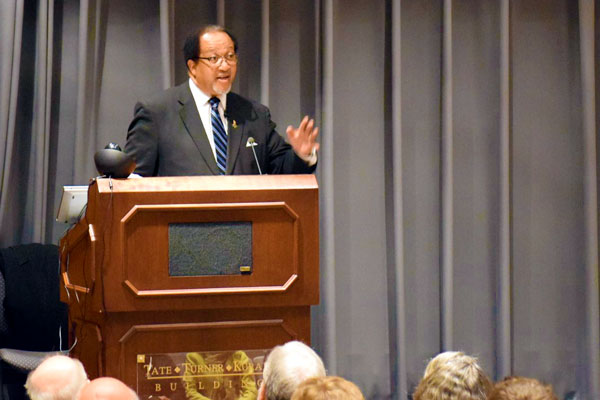
Dr. Benjamin Franklin Chavis Jr.
In February 2015, civil rights activist and former executive director of the NAACP Dr. Benjamin Franklin Chavis Jr. is the special speaker for the 2nd annual Bobby Boyd Lecture. Chavis shares his evolving perspectives on the value and urgent need for “freedom-fighting” social workers who can help lead toward a more positive and inclusive social transformation of the nation into a better place for all people to live.
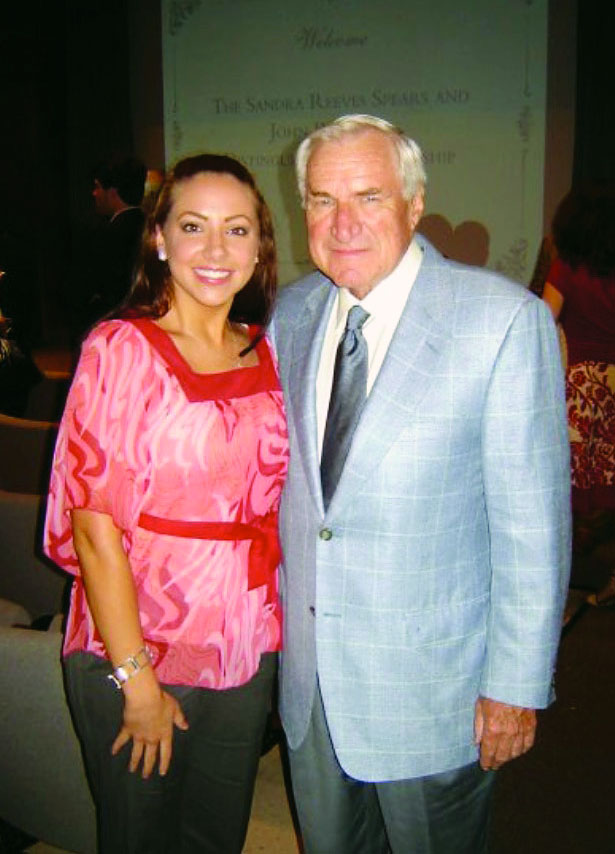
Dean E. Smith Opening Doors Fund
The Dean E. Smith Opening Doors Fund launches to provide financial support to undergraduate students and student professionals in education and social work.
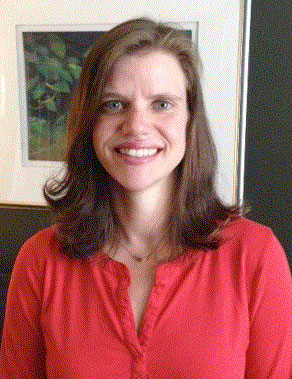
Katie Bonanno
Katie Bonanno, MSW ’10, is named Buncombe County Schools’ 2015-16 Social Worker of the Year. Bonanno works with Valley Springs Middle and Koontz Intermediate Schools in Asheville.
Trenette T. Clark Goings receives award
Assistant Professor Trenette T. Clark Goings receives the 2015 Society for Social Work and Research Deborah K. Padgett Early Career Achievement Award. The award recognizes that her accomplishments reflect innovative scholarship, a rigorous approach to social work research, and work that exhibits an emerging influence in the field and her contribution to advance the profession is noteworthy.
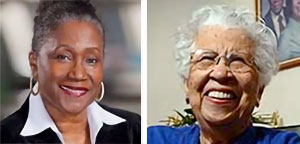
Carlton-LaNey and McClinton inducted as NASW Social Work Pioneers
Professor Iris Carlton-LaNey and retired professor Hortense McClinton are named National Association of Social Workers Social Work Pioneers. NASW Pioneers are social workers who have explored new territories and built outposts for human services on many frontiers. Each has made an important contribution to the social work profession and to social policies through service, teaching, writing, research, program development, administration or legislation.
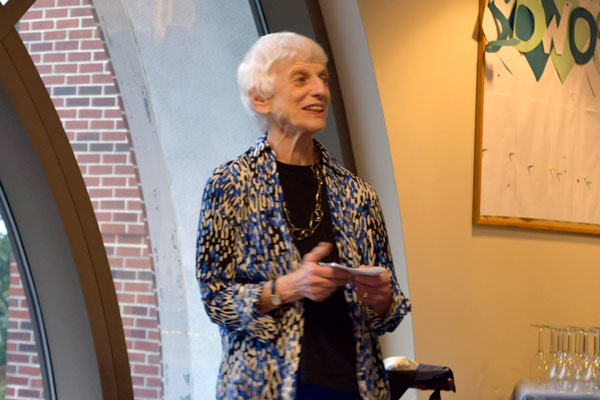
Maeda Galinsky retirement
After 50 years of service, scholar, researcher, teacher mentor, and the “grand dame of the School of Social Work,” Maeda Galinsky retires.
Same gender marriage rights
In June 2015, the U.S. Supreme Court votes in a 5-4 decision to grant same gender loving couples the right to legally marry in all 50 states.
Charleston church shooting
This same month, nine African American worshippers attending a Bible study at Emanuel African Methodist Episcopal Church in downtown Charleston, S.C., are shot and killed by a White supremacist. The massacre prompts nationwide demands for ending the public display of Confederate Civil-War-era symbols.
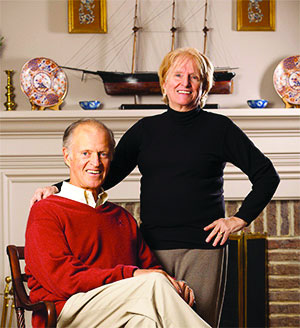
Prudence and Peter Meehan
Long-time School supporters Prudence and Peter Meehan contribute $1 million to support students, faculty and innovation. The gift is among the largest in the school’s history and will enable Carolina to further its focus on solving some of the world’s most pressing problems.
Asessing services for survivors of domestic violence
Professor Rebecca Macy and assistant professor Cynthia Fraga Rizo partner with the Orange County Rape Crisis Center, the Compass Center for Women and Families, and UNC Hospitals’ Beacon Program to evaluate the county’s efforts to tackle domestic violence and to explore possible solutions to unmet needs. The initiative is funded with support from local philanthropists Richardson Preyer, a member of the School of Social Work’s Board of Advisors, and his wife, Marilyn Jacobs Preyer, and will assess the county’s strengths and explore potentially new resources and programs, including the feasibility and support for a shelter service for families who are in immediate danger. Orange County does not currently have such a shelter, though its challenges with domestic violence are similar to what many other communities face, including those that have established emergency shelters, the researchers said.
Research examining assisted living communities
The National Institute on Aging awards a nearly $3.4 million federal grant to UNC researchers to examine the inappropriate and excessive use of antipsychotic medications in assisted living communities. The five-year study focuses on older adults with dementia who are prescribed off-label medications to manage and control behavior—a growing and dangerous trend that was first observed in nursing homes several years ago. School of Social Work professor Sheryl Zimmerman is the principal investigator leading the study, which will explore the reasons behind the inappropriate and excessive use of drugs and potential alternate practices.
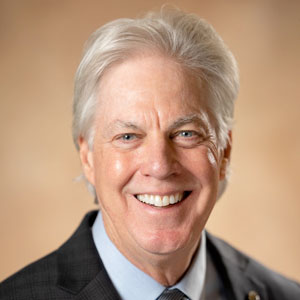
Gary L. Bowen is named dean
Long-time faculty member Gary L. Bowen is named dean of the School of Social Work. He succeeds Jack M. Richman, who is returning to the classroom after serving 14 years as dean. A year later, Richman, the Johnson-Howard-Adair Distinguished Professor, will retire.
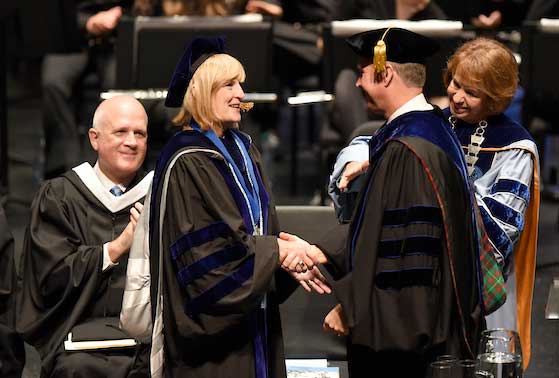
Mimi Chapman honored
In 2016, Professor Mimi Chapman receives the Edward Kidder Graham Faculty Service Award, which recognizes distinguished service to the state, the nation and the University by a faculty member. Chapman, the first social work professor to receive the award, shares the honor with Eugenia Eng, a professor in the Department of Health Behavior at UNC-Gillings Global School of Public Health.
Faculty among the top 40 academics
Distinguished professors Sheryl Zimmerman, Mark Fraser, Gary Bowen, and Matthew Howard are recognized among the top 40 academics whose scholarly contributions are having a “high impact” addressing social and health issues within the social work profession and across the diverse disciplines that encompass their respective areas of focus. The researchers were noted in a study published in the journal Research on Social Work Practice.
$1.79 million federal study
The School of Social Work partners with the UNC Gillings School of Public Health and the American Children’s Society on a $1.79 million federal study to assess the secondary effects of a rape prevention education program in preventing dating violence, bullying, high-risk sexual assault behaviors, and sexual harassment.
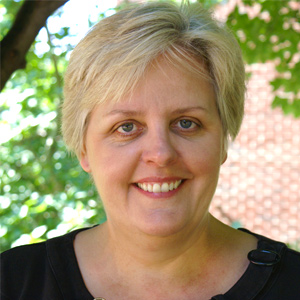
Marilyn Ghezzi honored for teaching
Marilyn Ghezzi is selected for the University’s prestigious 2017 Distinguished Teaching Award for Post Baccalaureate Instruction. A clinical assistant professor in the School of Social Work, Ghezzi teaches master’s-level courses about mental health practice, including differential diagnosis, group therapy, and brief treatment.
Iris Carlton-LaNey named Berg-Beach Professor
Iris Carlton-LaNey is named the Berg-Beach Distinguished Professor of Community Social Work at the University of North Carolina at Chapel Hill. A professor at the School of Social Work since 1994 and educator and researcher for more than 30 years, Carlton-LaNey has led research about African Americans, especially women, who are aging in the rural South; on African American social work pioneers; and on analyses of the impact historical events have had on building and maintaining social structures that can block opportunities and deny access to individuals and groups.
Mark Testa
Mark Testa, the Spears-Turner Distinguished Professor in the School of Social Work, receives the Society for Social Work and Research (SSWR) 2017 Social Policy Award, which honors social work researchers who have made outstanding contributions to policy that impact vulnerable or disadvantaged populations. Testa, who joined the School of Social Work in 2009, is considered one of the most influential scholars in child welfare.
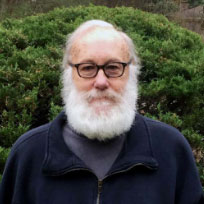
Drew Pledger
In February 2017, alumnus Drew Pledger, MSW ’88, is named the 2017 Social Worker of the Year by the N.C. Chapter of the National Association of Social Workers. As a school social worker and coordinator of mental health services for the Wake County Public School System, Pledger provides support around best practices, supervision skills, crisis response and prevention. He also serves as the Crisis Response Team lead for all of Wake County’s 177 schools and 160,000 students.
$4.9 million federal grant
Project director Dean Duncan and the Project No REST team are awarded a two-year $4.9 million federal grant to expand their trafficking prevention project’s public outreach, training programs and other activities.
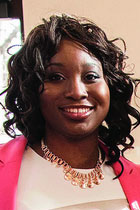
Advancement of Women
MSW student Olivia Bass is among four women selected to receive UNC-Chapel Hill’s Award for the Advancement of Women for her engagement and support of female students of color and for her work to support mothers on campus.
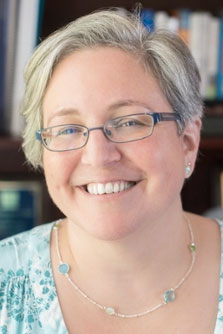
New fellowship
Lori Messinger, MSW ’96, Ph.D. ’99, is awarded a fellowship for the 2017-18 academic year by the American Council on Education. Messinger, associate vice chancellor for community engagement at UNC-Wilmington, is one of 46 fellows, nominated by the senior administration from her respective institution and selected following a rigorous application process.
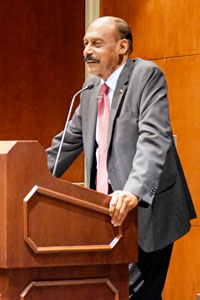
Larry E. Davis speaks
Larry E. Davis, dean at the School of Social Work at the University of Pittsburgh, speaks at the 4th Annual Bobby Boyd Leadership Lecture. Davis’ lecture focuses on “Racism in America: A Call to Action for Social Work Researchers.” Long recognized as a leading scholar of the narrative about race in America and its role in social justice, Davis has spent his life and career dedicated to issues of race, civil rights and social justice.
NASW student award
Dielle McMillan, an MSW student in the UNC School of Social Work’s Advanced Standing Program, receives the 2017 NASW-NC Toby Brown Award from the N.C. chapter of the National Association of Social Workers, which recognizes a BSW student who best reflects and represents the ethics, values, and passion in the field of social work through exemplary performance in social work coursework, field placement, student social work associations, and community organizations.
Passing of Morton I. Teicher
Morton I. Teicher, dean of the UNC School of Social Work from 1972 to 1981, and an NASW Social Work Pioneer, dies at age 97.
New journal editor
Rebecca Macy, L. Richardson Preyer Distinguished Chair for Strengthening Families, is named editor for the Journal of Family Violence.
New scholarship fund honors Iris Carlton-LaNey
The “Iris Carlton-LaNey Scholarship Fund” is created with a $50,000 gift from UNC School of Social Work alumnus Noel Bost, MSW ’96, of Greensboro, N.C. The scholarship honors the long-time social work professor and aims to benefit under-represented MSW students who have an interest in working in the field of social justice and racial equity.
Sheryl Zimmerman
Sheryl Zimmerman, the School of Social Work’s associate dean for research and faculty development and a national leader in assisted living and long-term care research, is named co-editor of JAMDA – The Journal of Post-Acute and Long-Term Care Medicine.
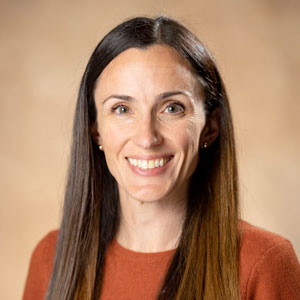
New investigator award
Cindy Fraga Rizo receives the prestigious 2017 Linda Saltzman New Investigator Award at the National Conference on Health and Domestic Violence. An assistant professor, Rizo focuses her research on interventions for particularly vulnerable intimate partner violence survivors, including Latinas, immigrants and system-involved survivors.
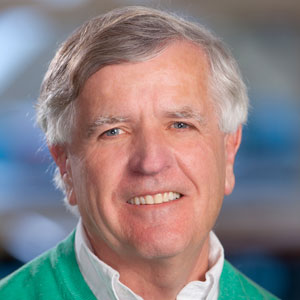
Leading in social innovation
Gary Nelson is appointed director of social innovation and entrepreneurship at the School of Social Work. In this new role, Nelson will help lead the School’s efforts to explore, promote and nurture new ways of addressing social problems. Nelson will work closely with the Jordan Institute for Families to develop and implement a five-year plan to promote and monitor the progress of social innovation and entrepreneurship within the School.
Historic funding year
The School receives a historic $14.5 million in external awards for the 2016–2017 fiscal year, including $5 million in funding for research projects and more than $9 million for service projects throughout the State of North Carolina. The funding is awarded for projects that address social challenges ranging from mental health to human trafficking.
Second federal grant supporting the UNC-PrimeCare program
The School receives a $1.9 million federal grant to support its UNC-PrimeCare program, which trains MSW students to work integrated health care settings. This is the second grant the program has received in the last few years.
Global Social Development Innovations
More than 40 economic, nonprofit, and policy leaders and practitioners from around the globe gather for a three-day symposium in Chapel Hill to officially launch the opening of Global Social Development Innovations (GSDI) at the University of North Carolina at Chapel Hill. The new research center is based within the School of Social Work and aims to improve the lives of marginalized populations around the world. Founded and directed by social work associate professor Gina Chowa, GSDI brings together a team of interdisciplinary scholars focused on social change in communities with limited economic, social, and health resources.
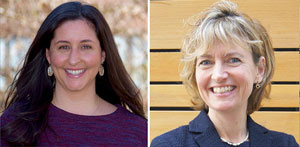
New John A. Tate Early Career Scholars
Faculty members Lisa de Saxe Zerden and Sarah Verbiest are appointed John A. Tate Early Career Scholars for Children in Need. The professorships recognize a faculty member’s high level of productivity in teaching, publishing, research, and service in support of children, youth, and families as well as overall contributions to the School of Social Work community.
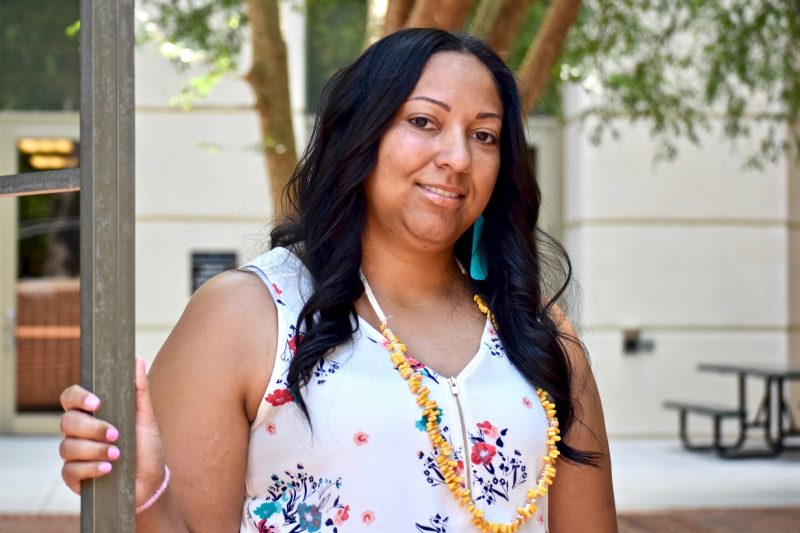
Robert Wood Johnson Health Policy Research Scholar
Ph.D. student Annie Francis is selected as prestigious Robert Wood Johnson Health Policy Research Scholar. Selected scholars are awarded $120,000 in academic support, which includes an annual stipend of $30,000 for up to four years of study, as well as access to professional coaching, mentoring and networking. The highly selective scholarship program targets doctoral students who have demonstrated that their research has the potential to impact health and well-being.
Jordan Institute for Families
Sarah Verbiest, John A. Tate Early Career Scholar for Children in Need, is appointed director of the Jordan Institute for Families at the University of North Carolina at Chapel Hill School of Social Work. Verbiest is a nationally known researcher with expertise in preconception health, postpartum wellness, infant mortality reduction and health equity issues. She just completed editing a book about moving maternal and child health life course theory into action, scheduled for publication in early 2018 by the American Public Health Association Press.
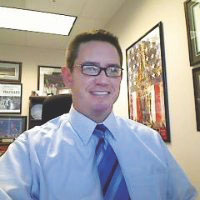
Bobby Cagle
Bobby Cagle, MSW ’98, is appointed director, Los Angeles County Department of Children and Family Services, the largest child welfare agency in the country.
Mark Testa
Mark Testa, the Spears-Turner Distinguished Professor of Social Work at the University of North Carolina at Chapel Hill, has been selected as a Fellow of the American Academy of Social Work & Social Welfare.
North Carolina NASW Social Worker of the Year
In January, 2018, professor Iris Carlton-LaNey is named North Carolina NASW Social Worker of the Year. The annual award is given to a social work professional who has demonstrated commendable social work practice and involvement with NASW and other professional, civic, and community organizations. For more than 40 years, Carlton-LaNey has taught in social work programs in three North Carolina universities: The University of North Carolina at Charlotte, North Carolina A&T State University, and currently as the School’s Berg-Beach Distinguished Professor of Community Social Work. Carlton-LaNey has made a career of educating and mentoring the next generation of social workers, including by challenging students to think critically about oppression, institutionalized racism, microaggressions, racism and privilege.
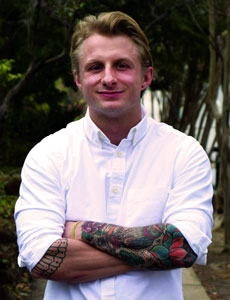
NASW student advocate of the year
Chase Holleman, MSW ’17, is selected by the N.C. chapter of the National Association of Social Workers as the 2018 recipient for the Myrna Miller Wellons Advocate of the Year Award, which is given annually to someone who has demonstrated a passion for advocating for the needs of the social work profession and who has served as a champion for change in public policy, both for the social work profession and for clients. Holleman was recognized by the NASW-NC Chapter in 2016 with the Toby Brown Award for Bachelor of Social Work students. In late 2017, he was also among 11 state residents to be recognized with the North Carolina Dogwood Award, which honors those who are dedicated to keeping people safe, healthy and happy in their communities. A leader in the recovery community, Holleman works with the University of North Carolina at Greensboro as a rapid response team navigator for Guilford County.
U.S. News & World Report rankings
The School of Social Work continues to rank among the top in the country. According to the latest U.S. News & World Report, the School is considered the 5th best graduate school of social work in the nation. The School is ranked third among public universities and is the only Southern school in the top 15.
Distinguished honors
Lisa de Saxe Zerden is selected to receive the Council on Social Work Education (CSWE) Distinguished Recent Contributions to Social Work Education Award for 2018. Zerden is senior associate dean for Master of Social Work education at the University of North Carolina at Chapel Hill School of Social Work.
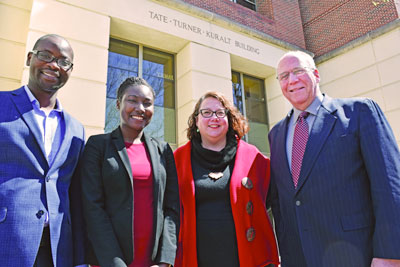
C. Felix Harvey Award winners
UNC Chapel Hill faculty: David Ansong, assistant professor; Selena Childs, clinical assistant professor; Kanisha Brevard, research associate; and Mark Testa, Sandra Reeves Spears and John B. Turner Distinguished Professor receive the C. Felix Award to Advance Institutional Priorities for their project to improve support for relatives fostering abused or neglected children.
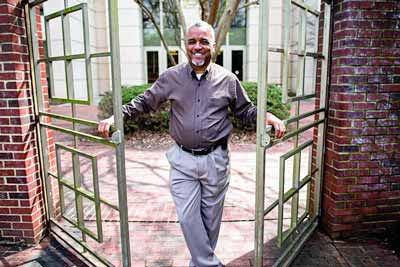
Ronald Mangum earns distinguished service award
Clinical assistant professor Ronald L. Mangum is among six university employees to receive the 2018 C. Knox Massey Distinguished Service Award, one of the most prestigious distinctions earned by faculty and staff. Created in 1980 by the late C. Knox Massey of Durham, the awards honor recipients for “unusual, meritorious or superior contributions” and service to the UNC-Chapel Hill community and beyond.
Campaign for Carolina
In April 2018, the School of Social Work launches a $23 million fundraising campaign, the largest in the School’s nearly 100-year history and is part of the University’s “For All Kind: the Campaign for Carolina.” An ambitious effort to raise $4.25 billion by Dec. 31, 2022, the Campaign for Carolina was developed “to foster an innovation generation prepared to lead the world to a better future.” The UNC campaign is the largest in the Southeast and second largest among public institutions in the nation. The School of Social Work’s latest fundraising endeavor took years of “dreaming about what is possible for our School, and then creating a plan to make it happen,” said Dean Gary Bowen.
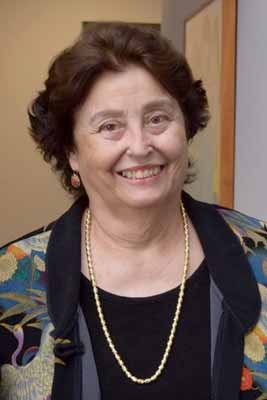
Marie Weil retirement
Marie Weil, the Berg-Beach Professor of Community Practice, retires after 30 years of service to the UNC School of Social Work. As one of the School’s founding associate directors of the Jordan Institute for Families, Weil has spent most of her research career focused on services for families and children and program evaluation. An especially prolific scholar in the field of community practice work, Weil is the founding editor of the Journal of Community Practice and editor of the much-referenced, “The Handbook of Community Practice.”
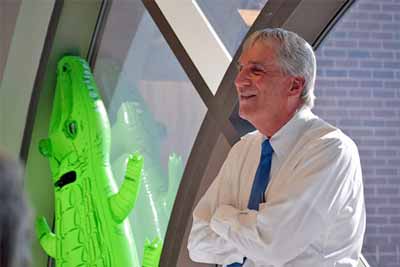
Mark Fraser retirement
Mark W. Fraser, the John A. Tate Distinguished Professor for Children in Need, retires after serving 42 years in the field of social work and a quarter of a century at the UNC School of Social Work. Fraser, who served as the School’s associate dean for research for 14 years and three years as the director of the Jordan Institute for Families, is known internationally as a leader in the field of social work research. Over the years, his work has focused on risk and resilience, child behavior, child and family services, and research methods.
Associate dean for global engagement
Associate professor Gina Chowa is appointed associate dean for global engagement. In this new role, Chowa, who also serves as director of Global Social Development Innovations (GSDI) at UNC, will be responsible for creating and advancing the School’s vision for making an impact around the world and for leading and coordinating the efforts needed to fulfill the University’s overall global strategic plan and initiatives.
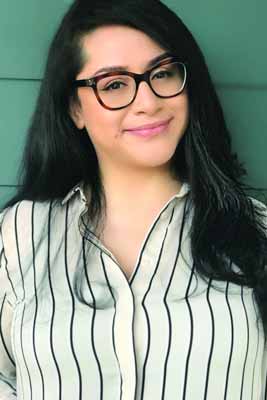
NASW student award
The National Association of Social Workers Foundation awards second-year MSW student Stephany N. Mejia the Consuelo W. Gosnell Memorial Scholarship. The scholarship recognizes master’s degree candidates in social work who have demonstrated a commitment to working with, or who have a special affinity with, American Indian/Alaska Native and Hispanic/Latino populations. Mejia is a first-generation college student who is interested in mental health issues and in serving the Latinx population and the Latinx LGBTQ community.
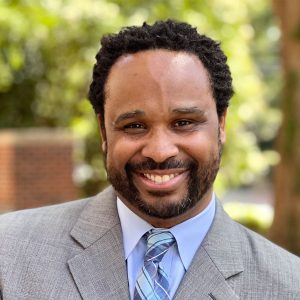
Assistant dean of diversity, equity and inclusion
Travis Albritton is appointed assistant dean of diversity, equity and inclusion. Albritton also serves as director of the School’s Triangle Distance Education MSW Program. Over the years, he will be responsible for helping to further develop and guide the School’s strategic plan to strengthen racial equity and inclusive excellence within every function of the School, including in student recruitment and admissions; recruitment, hiring and retention of faculty and staff; curriculum and co-curriculum development; and in administrative structures and practices within the School.
GRE admission requirement
The School waives the GRE admission requirement for incoming MSW students. The elimination of the standardized test brings UNC-Chapel Hill’s MSW program in line with the nation’s other Top 20 schools of social work that have also decided to waive the GRE for their master’s level programs.
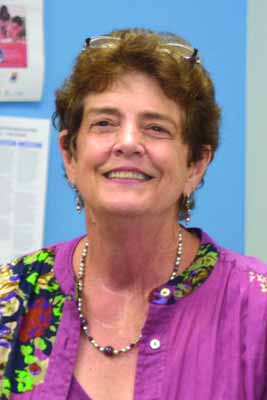
Jean Livermore retirement
Jean Livermore, associate director of field education and clinical assistant professor, retires after more than two decades of service to the UNC School of Social Work and nearly 45 years of service to various state supported agencies in North Carolina. Livermore first joined the School of Social Work full-time in 1997 as a clinical instructor and training coordinator for the Children’s Mental Health Program. As associate director of field education, Livermore was responsible for among other things, matching full-time students with foundation field placements; coordinating recruitment of field placements and instructors; teaching SoWo524, Foundation Field Seminar; and participating in program development in the community.
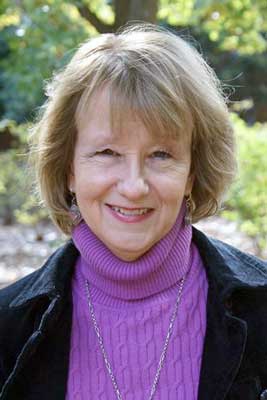
Anne Jones retirement
Clinical professor Anne Jones retires after nearly 42 years of service to the social work profession, including 16 years as a faculty member at UNC’s School of Social Work. Jones has spent much of her clinical, research and teaching career on couple and family systems work, with an emphasis on couple and family relationships, family formation, psycho-education and internet groups, and intervention research. In 2011, she completed a $2.5 million, five-year community intervention study aimed at strengthening couple relationships and parenting bonds among economically disadvantaged, unmarried, expectant couples in Durham. Over the past few years, Jones has focused more of her attention on integrated health care and worked closely with colleague Lisa de Saxe Zerden to lead the UNC-PrimeCare program.
Associate dean for doctoral education
Professor Mimi Chapman is named associate dean for doctoral education. She succeeds Matthew Howard, who was appointed in 2016 and served in the role before taking extended medical leave earlier this year. Chapman, who was the doctoral program’s first graduate, joined the School as an assistant professor in 2001. She has taught numerous MSW and doctoral courses. Her research has focused on social work practice, child abuse and neglect, children’s health and mental health, immigration and acculturation.

Passing of Matthew O. Howard
The School of Social Work community mourns the loss of Professor Matthew O. Howard, the Frank A. Daniels Distinguished Professor for Human Services Policy Information. Howard died on Dec. 15, 2018, following a lengthy hospitalization. A respected and prolific writer and researcher, Howard authored nearly 400 publications, including more than 300 peer reviewed articles, book reviews, editorials, government reports and abstracts. He also served on the editorial boards of nearly 60 academic journals published across the world. Most recently, he was still serving on the editorial boards of nearly 30 journals, including the Journal of Cognitive Neuropsychology, Journal of Cancer Science, Journal of Preventive Medicine & Research, Journal of Neuroscience and Neuropsychology, and Journal of Pediatrics & Neonatal Biology.
Speaking out on Silent Sam
Members of our School of Social Work community, including students, alumni, faculty and staff, publish a formal written statement denouncing racism, oppression and the presence of “Silent Sam” on the UNC-Chapel Hill campus.
100 Most Influential Contemporary Social Work Faculty
Four current or former faculty members at the School of Social Work – Sheryl Zimmerman, Mark Fraser, Gary Bowen and the late Matthew Howard – are named among the “100 Most Influential Contemporary Social Work Faculty” in a paper published by the Journal of Social Service Research. They are the only faculty members ranked from any North Carolina institution.

New strategic plan
UNC School of Social Work adopts the strategic plan “Building on 100 Years of Excellence,” establishing five priorities on which the School will focus during the next three years: school culture, education, research and engagement, global focus, and communications and marketing. Each priority presents a set of objectives and action steps in support of the School’s mission of advancing equity, transforming systems, and improving lives.
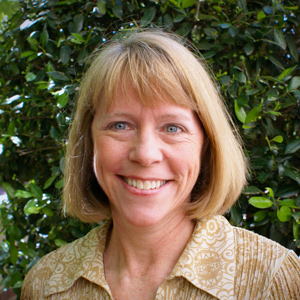
Top Mental Health First Aid Instructor
The following month, the National Council for Behavioral Health names clinical associate professor Jodi Flick a “Top Mental Health First Aid Instructor,” for 2018 and one of the Top 100 MHFA Instructors of All Time. Flick is among more than 12,000 instructors across the country leading a public education program that teaches the risk factors and warning signs of mental health and substance abuse problems.
Highest ranking
The UNC School of Social Work receives its highest ranking yet in the annual U.S. News & World Report: 3rd in the nation.
UNC-PrimeCare OUD
The School is awarded a $1.35 million federal grant to prepare social workers responding to the opioid crisis. This new project, called UNC-PrimeCare OUD (Opioid-Use Disorder), is part of a federal program to train a prepared workforce to address the behavioral health care and treatment service needs for underserved communities. This specific grant has the goal of expanding the MSW workforce to help combat the opioid epidemic and other substance use disorders.
Substance abuse among youth in North Carolina’s rural communities
In September 2019, associate professor Trenette Clark Goings receives a $1.5 million federal grant to help prevent substance abuse among youth in North Carolina’s rural communities, with project activities centered in Robeson County. Goings will develop “Substance Use Prevention and Education for Robeson (SUPER),” which will target underage drinking, cigarette use and e-cigarette use, or vaping.
Passing of Maeda Galinsky
Professor Maeda Galinsky, a long-time social work scholar, researcher, teacher and mentor, dies on Sept. 9, 2019, at age 84. Galinsky arrived in Chapel Hill in 1965, when her husband David was offered a position with UNC’s psychology department. Soon after, she was hired as an assistant professor at UNC School of Social Work. Galinsky was a prolific researcher and collaborator known as a pioneer scholar for her work on groups and intervention research. Galinsky co-authored a paper that remains among the top three ever-cited publications in the journal Social Work Research. Galinsky’s influence on the field, especially on social work theory and practice with groups and intervention research, continues to be felt today.
Associate dean for research and faculty development
Rebecca Macy, the Preyer Distinguished Professor for Strengthening Families, is appointed associate dean for research and faculty development. Macy steps into the position following the tenure of Sheryl Zimmerman, a Kenan Distinguished Professor, who served in the role for about three years. Macy is a leading scholar on interpersonal and relationship violence, especially interventions that promote violence survivors’ safety and recovery from the trauma of violence.
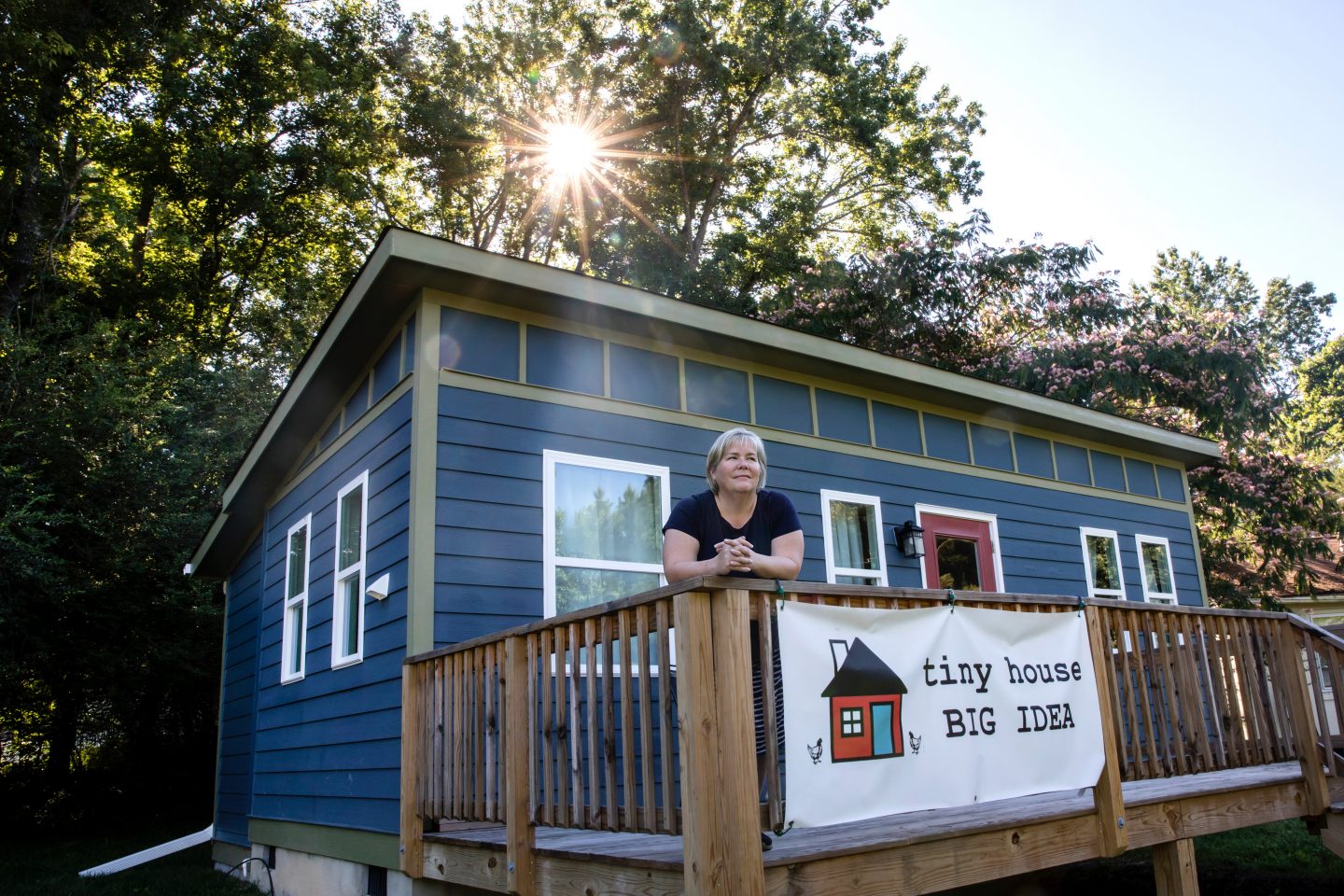
Tiny Homes Village
The School of Social Work is awarded a $1 million, two-year grant from the international Oak Foundation to help fund the construction of the Tiny Homes Village, a demonstration project designed to create a new form of affordable housing for people with mental illnesses and other health conditions. The village will also support and house veterans in need. The project is being built through a public-private partnership led by local nonprofit Cross Disability Services (XDS) Inc. and the School of Social Work. XDS, Inc’s founder and CEO Thava Mahadevan is the founder and director of the Tiny Homes Village. Mahadevan has spent the last few years trying to get the innovative community off the ground, working closely with Amy Blank Wilson, co-director of the project and an associate professor and social work researcher at the School of Social Work.
CSWE’s 2019 Significant Lifetime Achievement in Social Work Education Award
Iris Carlton-LaNey, the Berg-Beach Distinguished Professor of Community Social Work, has been selected to receive the Council on Social Work Education’s 2019 Significant Lifetime Achievement in Social Work Education Award. The prestigious award recognizes a social work educator’s exemplary achievements in research and scholarship, pedagogy and curriculum development, and organizational leadership over his or her entire career. A few months later, she will also be named the recipient of the National Association of Social Workers’ (NASW) Lifetime Achievement Award. Carlton-LaNey was selected in recognition of her decades of work in training social workers to identify and fight discrimination and institutionalized oppression.
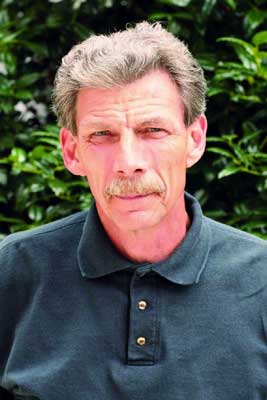
Passing of Worth Bolton
The School of Social Work community mourns the loss of Worth Bolton, who died on Nov. 15, 2019. A retired clinical faculty member and former director of the School of Social Work’s Certificate Program in Substance Abuse Studies, Bolton spent his entire career assisting people with substance use problems to find help and health, beginning at a time in history when they were considered by most to be a lost cause. In his 40 year career, he was a treatment provider, clinical supervisor, mentor, trainer, teacher and consultant. Bolton worked with community organizations, professional associations and state and national substance use disorder authorities to ensure that practice informs policy. In all of these roles, he made a significant impact on students, practitioners, veterans, policymakers and people seeking recovery.
2020s
Amy Blank Wilson earns distinguished honors
Associate professor Amy Blank Wilson is appointed as Prudence F. and Peter J. Meehan Early Career Distinguished Scholar. Wilson is an expert in criminal justice and mental health and has spent most of her career focused on issues around mental health, serious mental illness and dual diagnosis, service accessibility, jail reentry, and interventions for people with serious mental illness involved in the justice system.
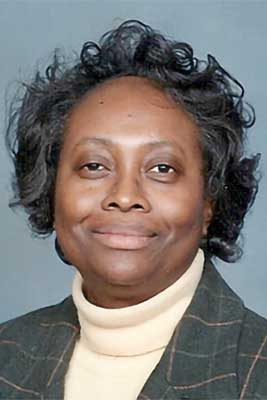
Mae McLendon
Mae McLendon, MSW ’76, is selected as a recipient of the 30th Annual Pauli Murray Awards. The awards, given by the Orange County Human Relations Commission, recognize those who have served the community with distinction in the pursuit of equality, justice, and human rights for all residents. McLendon currently serves as coordinator of the Chapel Hill Carrboro CROP Hunger Walk.
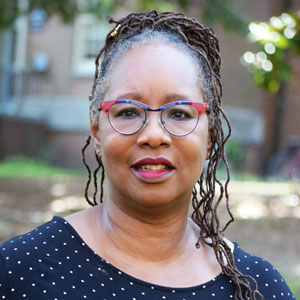
Linda Pridgen-Braswell retirement
After more than 30 years of service, Linda Pridgen-Braswell retires from the School of Social Work. Pridgen-Braswell was first hired as an office manager within the School’s Field Education Program in 1989, where she initially worked for seven years. During her tenure, she also served as an assistant to former associate dean Jan Schopler and then as a business and contract manager with the N.C. Child Welfare Education Collaborative. She returned to the Field Education Program nearly 10 years ago, where she has remained as an office manager.
New 20-month Advanced Standing program
School announces plans to launch a new 20-month Advanced Standing program. This latest program is designed for candidates who have graduated from an accredited BSW program, including students who are eager to continue working as they complete their graduate degree. The first cohort of students will begin classes in January 2021 and complete the program in May 2022. The 20-month program will join the School’s current lineup of academic programs, including a 12-month Advanced Standing program for those with a BSW, three-year program options in Chapel Hill and Winston-Salem, and a two-year full-time program.
Pandemic
In March 2020, the World Health Organization declares that the coronavirus has become a pandemic. In the United States, the pandemic quickly becomes a national emergency and public schools, colleges and universities, businesses, entertainment venues, and national and state recreational parks begin to shut down across the country due to the spread of COVID-19. The University of North Carolina at Chapel Hill quickly shifts to a plan for remote teaching and online instruction, sending thousands of students off campus, including students enrolled in our MSW and Ph.D. programs. This online instruction continues throughout the entire 2020-2021 academic year.
Faculty Chair
In April 2020, Mimi Chapman becomes the first School of Social Work professor to be elected chair of the faculty at UNC-Chapel Hill.
George Floyd
Protests erupt nationwide following the death of Minneapolis resident George Floyd, who was killed in police custody. Floyd, who is Black, died on May 25 after being handcuffed and pinned to the ground under the knee of a White Minneapolis police officer. The death is captured on video and quickly circulates on social media and around the world, sparking protests for nationwide police reform.
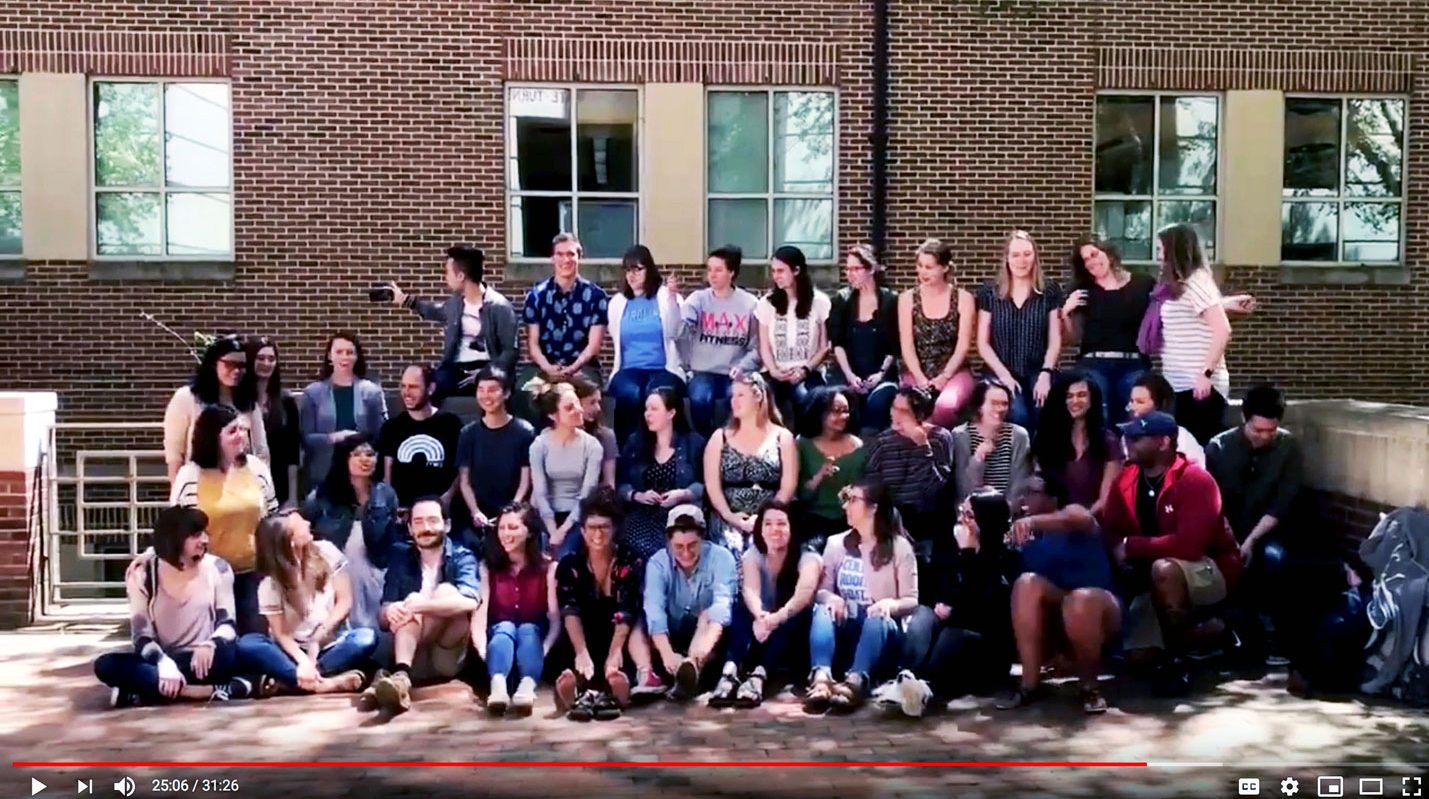
Graduation ceremonies
With in-person graduation ceremonies canceled because of the COVID-19 pandemic, the School moves to honor the class of 2020 through a series of online events, with speakers, memories and even an online toast for doctoral graduates.
Virtual dental health services
The UNC Adams School of Dentistry and the School of Social Work partner to provide North Carolinians with oral health complications and potentially struggling to meet basic needs access to virtual dental health services. The services are offered, following the closure of dental clinics.
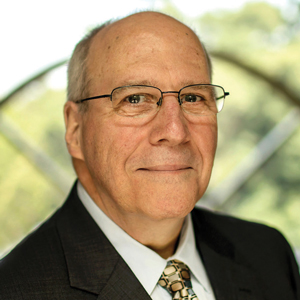
Mark Testa retirement
Mark Testa, Spears-Turner Distinguished Professor of Social Work and an architect of innovative reforms in the field of child welfare at state and federal levels retires. Testa leaves having served more than 40 years within the field of social sciences and 10 years with the UNC School of Social Work. Testa joined the School in 2010 as an influential scholar for his groundbreaking research in subsidized guardianship.
Mouth care and pneumonia
Kenan Distinguished Professor Sheryl Zimmerman and colleagues publish first-of-its-kind study on the connection between mouth care and pneumonia. The study found that nursing homes that implemented a specific care program that trained staff to assist residents with tooth brushing, flossing and gum care saw a statistically significant 31% reduction of pneumonia cases compared to nursing homes that did not use the program.
Services for essential frontline workers
School of Social Work researchers Rachel Goode, Trenette Clark Goings and Mimi Chapman are among faculty across 14 UNC-system schools to be awarded part of a $29 million grant targeting treatment, community testing and prevention of COVID-19. The social work faculty, along with co-investigator Steve Day, and Ph.D. research assistant Anjalee Sharma, are focused on better understanding the coping strategies of essential frontline workers, such as cashiers, fast food employees, childcare providers, emergency responders, and bus drivers. The researchers aim to strengthen services for these individuals.
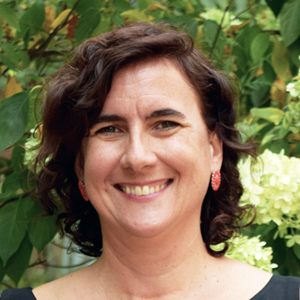
Grand Challenge for Social Work
Melissa Lippold is selected to serve as a national co-leader for the Grand Challenge for Social Work addressing “Ensure Healthy Development for All Youth.” An associate professor and Prudence and Peter Meehan Early Career Distinguished Scholar, Lippold will also serve as a member of the steering committee for the Coalition for the Promotion of Behavioral Health, an interdisciplinary group of researchers, practitioners and policymakers who are committed to reducing behavioral health problems in young people.
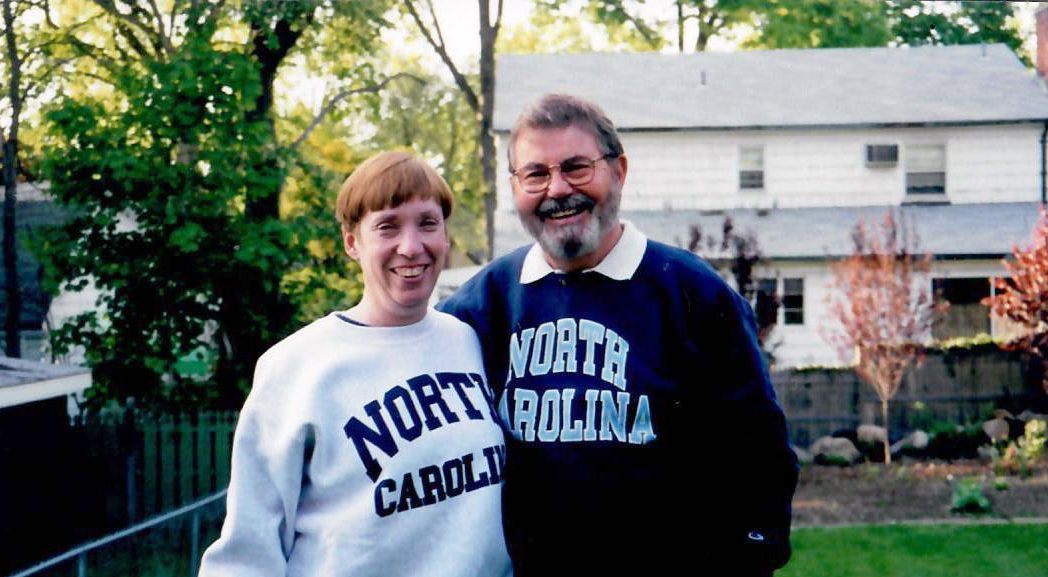
Henry and Sandra Hobbs Endowed Scholarship Fund
School supporter Sandra Hobbs commits $1.7 million gift for student scholarship. The Henry and Sandra Hobbs Endowed Scholarship Fund will be used to support the tuition and fees of MSW students, especially those scholars who strengthen the social, economic, and cultural diversity of the school’s student body.

School centennial events
In celebration of its 100-year anniversary, the School of Social Work announces plans to extend its commemorative events over two years due to the ongoing COVID-19 pandemic. The School also launches a Centennial Speaker Series, which will focus on themes of social justice and include crucial discussions about ways social workers can confront systemic racism and take action to ensure a more just equitable society. Special speakers include: Rev. William Barber, architect of the Forward Together Moral Movement; New York Times best-selling author Ibram X. Kendi, the Andrew W. Melton Professor in the Humanities at Boston University and the founding director of the BU Center for Antiracist Research; radio journalist and public speaker Abdi Nor Iftin; and Eddie S. Glaude Jr., the James S. McDonnell Distinguished University Professor and chair of African American Studies at Princeton University.
SIEL survey tool
The School of Social Work’s new Social Innovation and Entrepreneurship Lab (SIEL) launches a survey tool to help struggling communities better understand their economic, health and social well-being so that they can create an action plan to help lift themselves out of poverty.
Refugee Mental Health and Wellness Initiative
The School’s Refugee Mental Health and Wellness Initiative expands access to mental health services and treatment to seven other North Carolina counties where refugees have resettled in recent years. The UNC initiative has been providing screening and treatment services in Durham, Orange and Wake counties since 2014. The latest contract with the state will allow the project to continue that work and to reach additional clients in need in Guilford, Forsyth, Mecklenburg, Gaston, Cabarrus, Buncombe, and Craven counties.
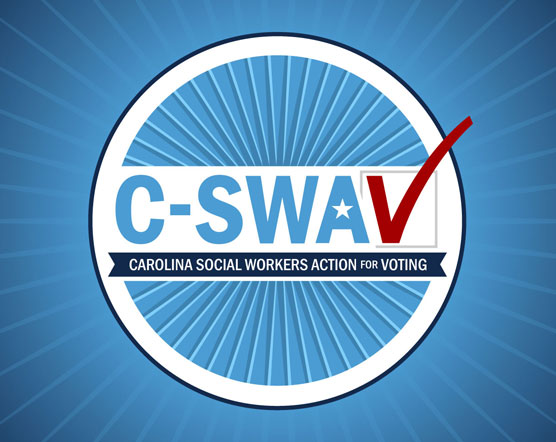
C-SWAV centennial service project
As part of the Centennial celebration, the School launches a statewide voter awareness campaign to increase voter participation in North Carolina. Carolina Social Workers Action for Voting (C-SWAV) is a campaign to encourage individuals to vote and to help social workers share information with their clients, friends and communities about the voting process. C-SWAV is chosen as an official service project for the School’s centennial celebration.
School website
After years of planning, the School launches a redesigned and rebuilt website that includes a conversion from a Drupal platform to the UNC-Chapel Hill standard WordPress platform. The updated platform offers improvements for accessibility and a radically different navigation and menu system with a responsive design so that the website displays correctly on all devices.
Efforts to uproot racism
On the recommendation from Professors Trenette Goings, Gina Chowa, and Michael Lambert, the School announces the creation of two new working groups: an Anti-Racism Task Force and a Reconciliation Standing Committee. The groups were formed in an effort to strengthen work around uprooting racism in UNC School of Social Work.
Faculty service recognition
UNC School of Social Work faculty members Gina Chowa, Gary Cuddeback, and Trenette Clark Goings are recognized for their service to teaching and their commitment to innovative research in the social work profession with appointments as distinguished professors. Chowa is appointed as the Johnson-Howard-Adair Distinguished Professor, which recognizes a leading scholar whose work is focused on the impact and influence of poverty on individuals, families and communities. Cuddeback, a national expert in examining the connection between mental illness and the criminal justice system, is appointed as the Berg-Beach Distinguished Professor of Community Social Work. Goings is appointed the Sandra Reeves Spears and John B. Turner Distinguished Professor, which recognizes a leading scholar whose work is focused on improving the lives of children and their families and communities.
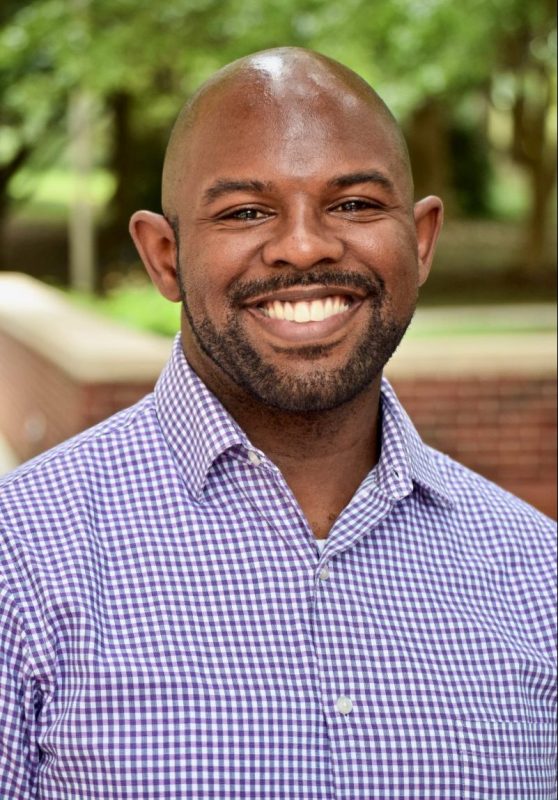
Robert Wood Johnson Foundation Health Policy Research Scholar
Hayden Dawes is selected as a 2020 Robert Wood Johnson Foundation (RWJF) Health Policy Research Scholar. Dawes, a second year Ph.D. student at UNC’s School of Social Work, is among a group of graduate students from across the country tapped for the prestigious national leadership development program. Dawes is the second UNC social work student to be named a RWJF scholar, following Ph.D. student Annie Frances, who received the scholarship in 2017. The scholarship program targets doctoral students who have demonstrated that their research has the potential to impact health and well-being. Dawes’ research focuses on improving the mental health and social well-being of people of color and LGBTQIA+ individuals by strengthening mental health services, systems, and policies.
Substance use in biracial youth and emerging adults study
Professor Trenette Clark Goings continues her success in securing funding from the National Institutes of Health, receiving a $1.8 million federal grant to study substance use in biracial youth and emerging adults. An expert in the substance-use field, Goings’ research focuses broadly on reducing health disparities among racial and ethnic minorities. For this latest study, she and her team aim to better understand why biracial youth, ages 13 to 25, are more at risk for smoking cigarettes and marijuana and for using alcohol.
46th president of the United States
On Nov. 3, 2020, with millions of Americans voting on election day and an unprecedented number of mail-in-ballots, the race for president is too close to call. Four days later, the Associated Press and other media outlets declare Vice President Joe Biden the 46th president of the United States. President Trump and his campaign will contest the results and begin filing lawsuits by the end of the month.
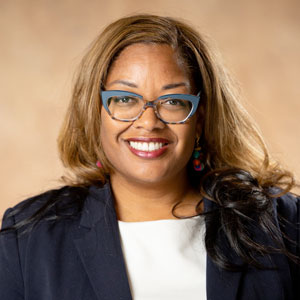
Mentor of the Year
Sharon Holmes Thomas is selected by the National Deans and Directors of Social Work Admissions (NDDSWA) to receive its national Mentor of the Year Award for 2020. Thomas is assistant dean for recruitment, financial aid and admissions at the University of North Carolina at Chapel Hill School of Social Work.
Interdisciplinary Minority Fellowship
Alumna Jamie P. Ingram, MSW ’04, is awarded the prestigious Interdisciplinary Minority Fellowship through the American Psychological Association. A graduate scholar of UNC’s Child Welfare Education Collaborative, Ingram practices as a clinical addictions specialist for the UNC Health-Alcohol and Substance Abuse Program and is pursuing her Ph.D. at Tulane University. Her research focuses on racial inequities facing the Black community.
Inaugural class of the 20-Month Advanced Standing MSW Program
Nine students are admitted into the inaugural class of the School of Social Work’s 20-Month Advanced Standing MSW Program. The students will begin their coursework in January 2021. The new program is designed for candidates with a bachelor’s degree in social work, including students who are eager to continue working as they complete their graduate degree.


![Bulletin of the North Carolina State Board of Charities and Public Welfare [1918 : January-1918 : March, v.1 : no.1]](/wp-content/uploads/sites/509/2021/05/centennial-timeline-1918-NC-Board-Charities-Public-Welfare-bulletin.jpg)
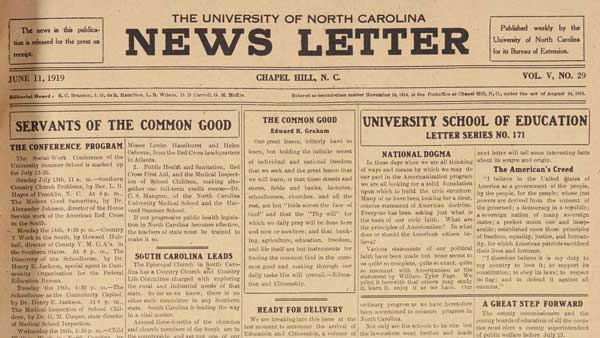
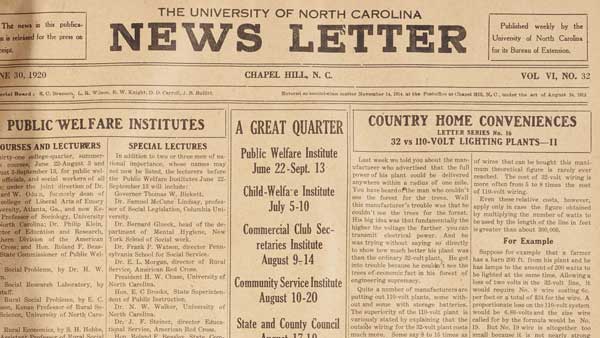
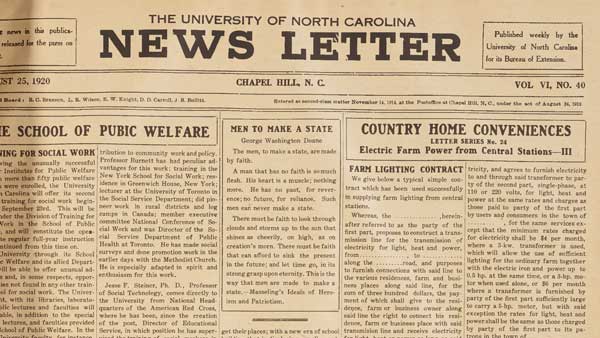
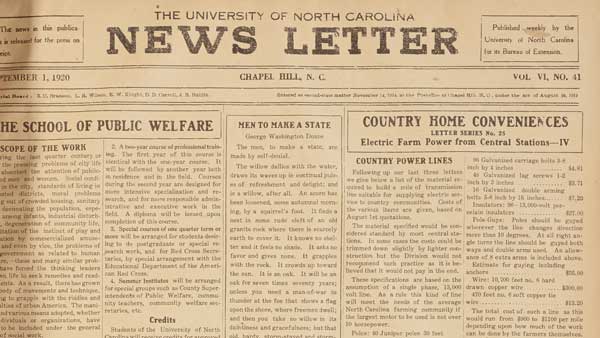
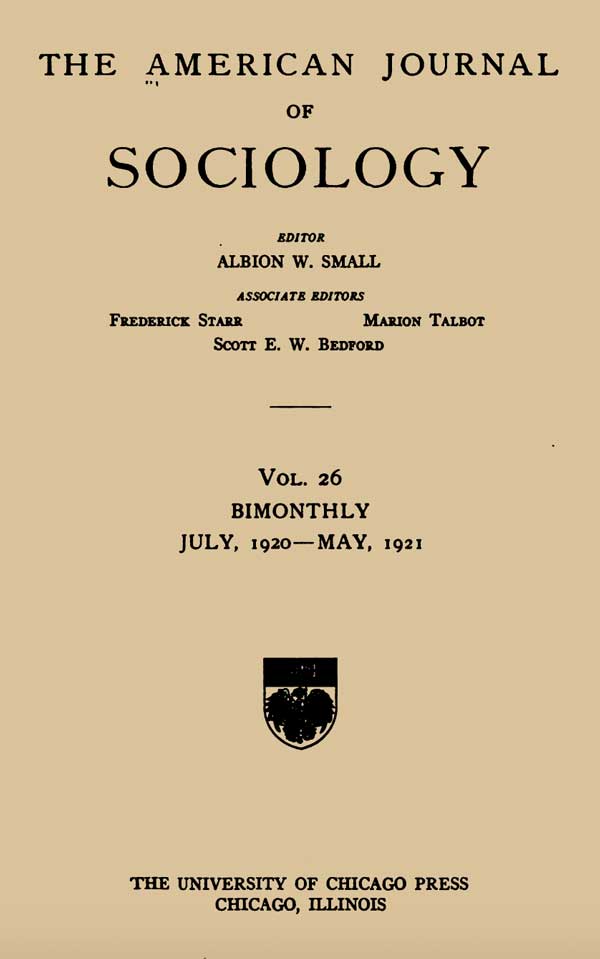
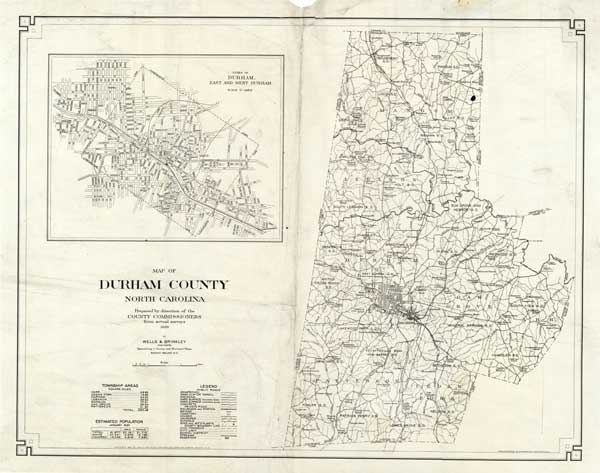
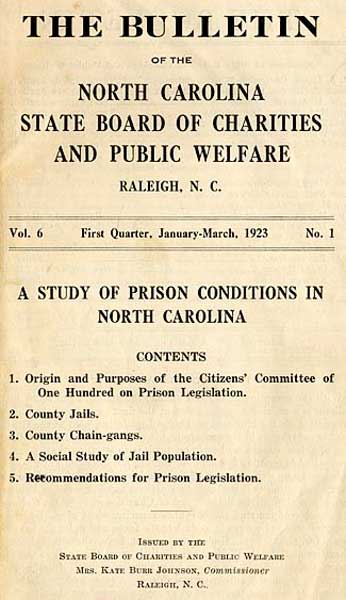


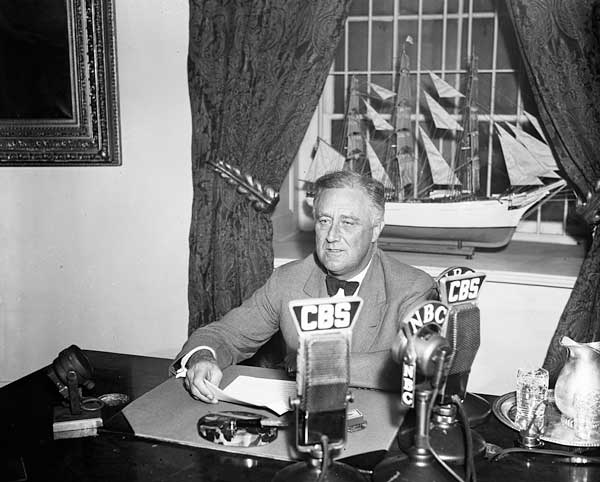
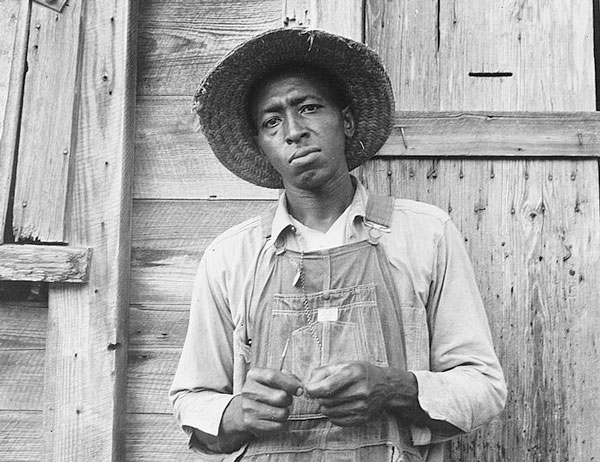
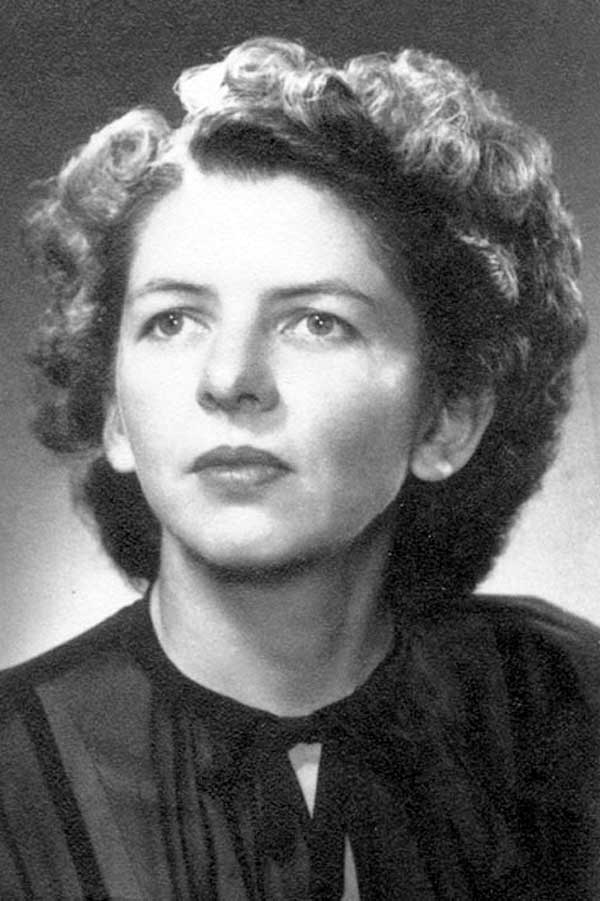
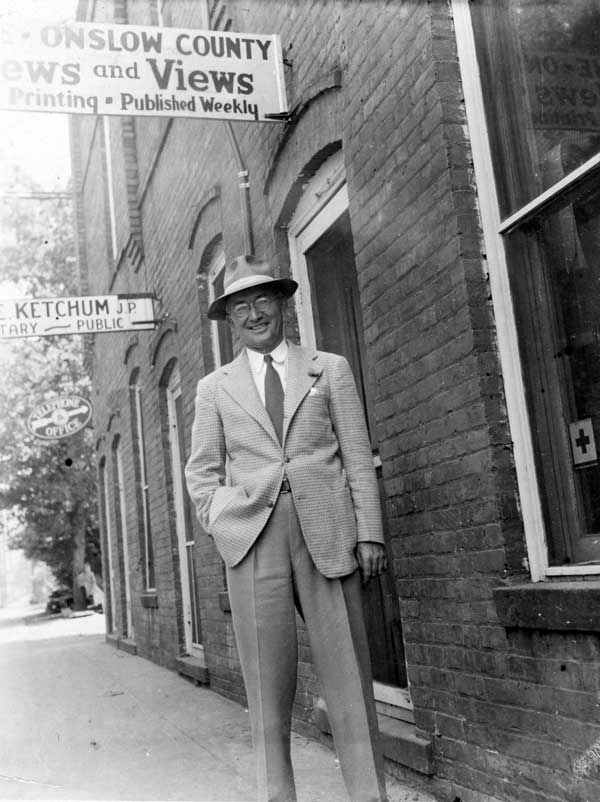
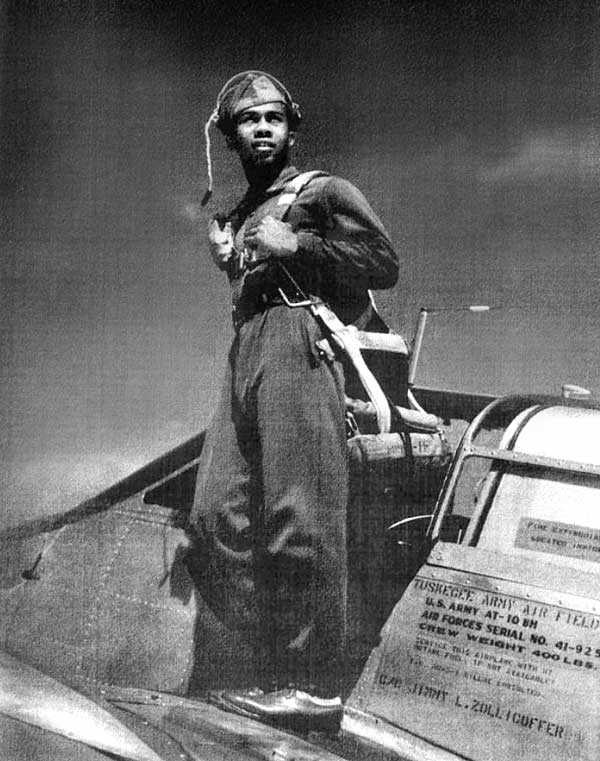
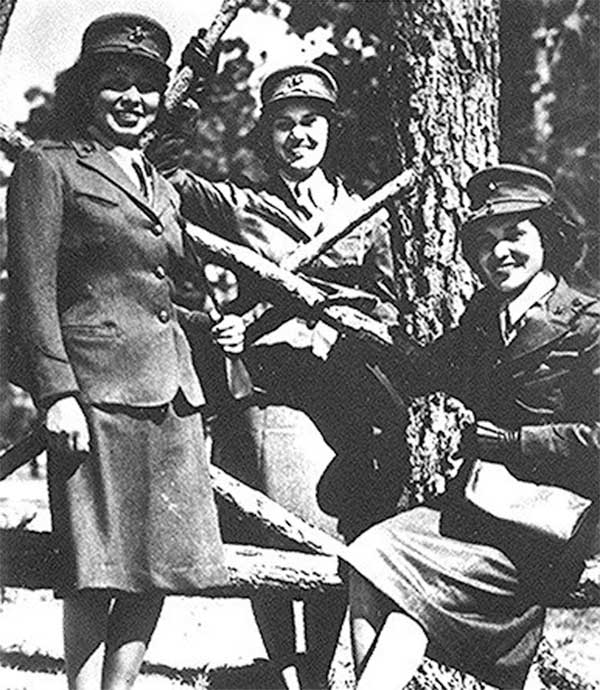
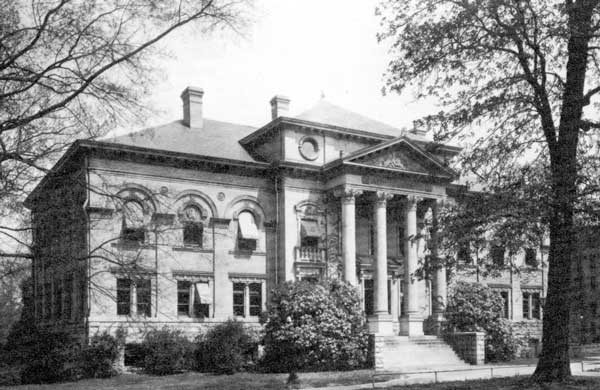
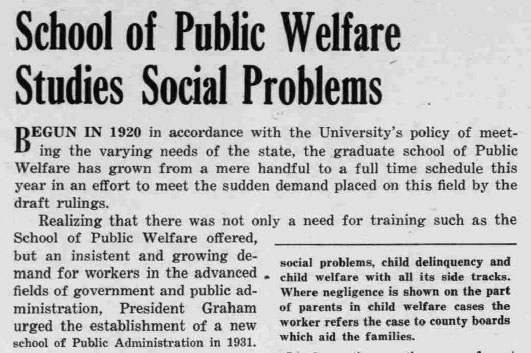
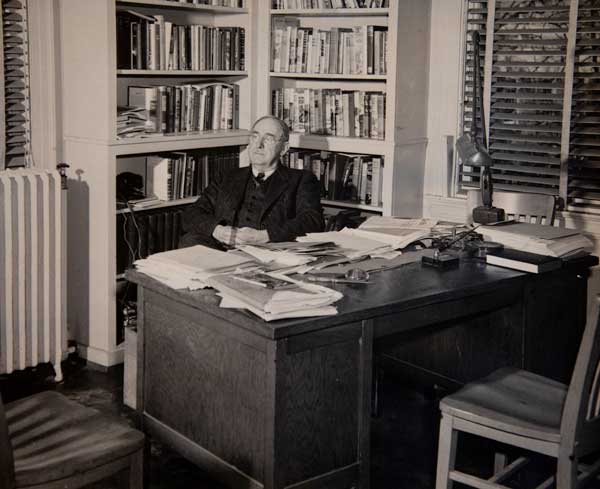
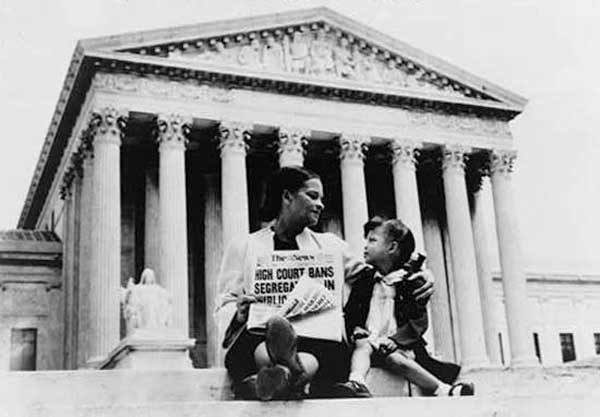
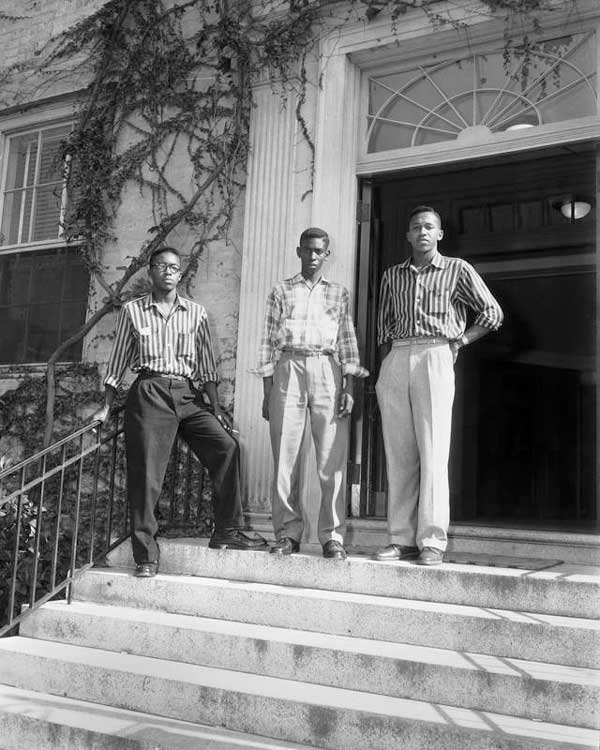
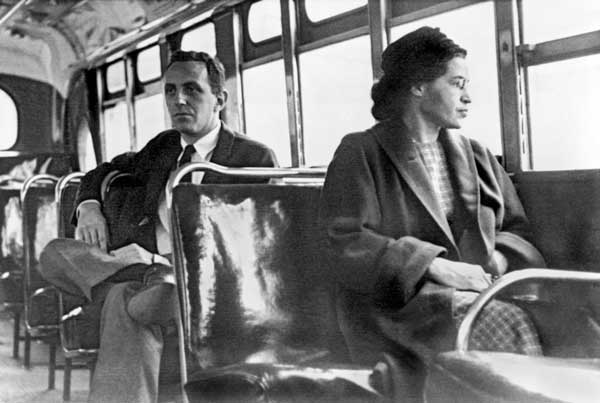

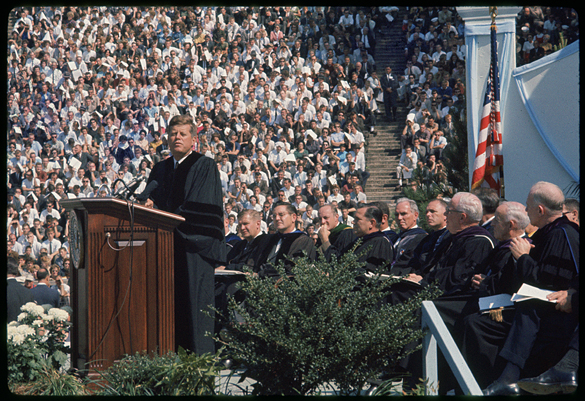

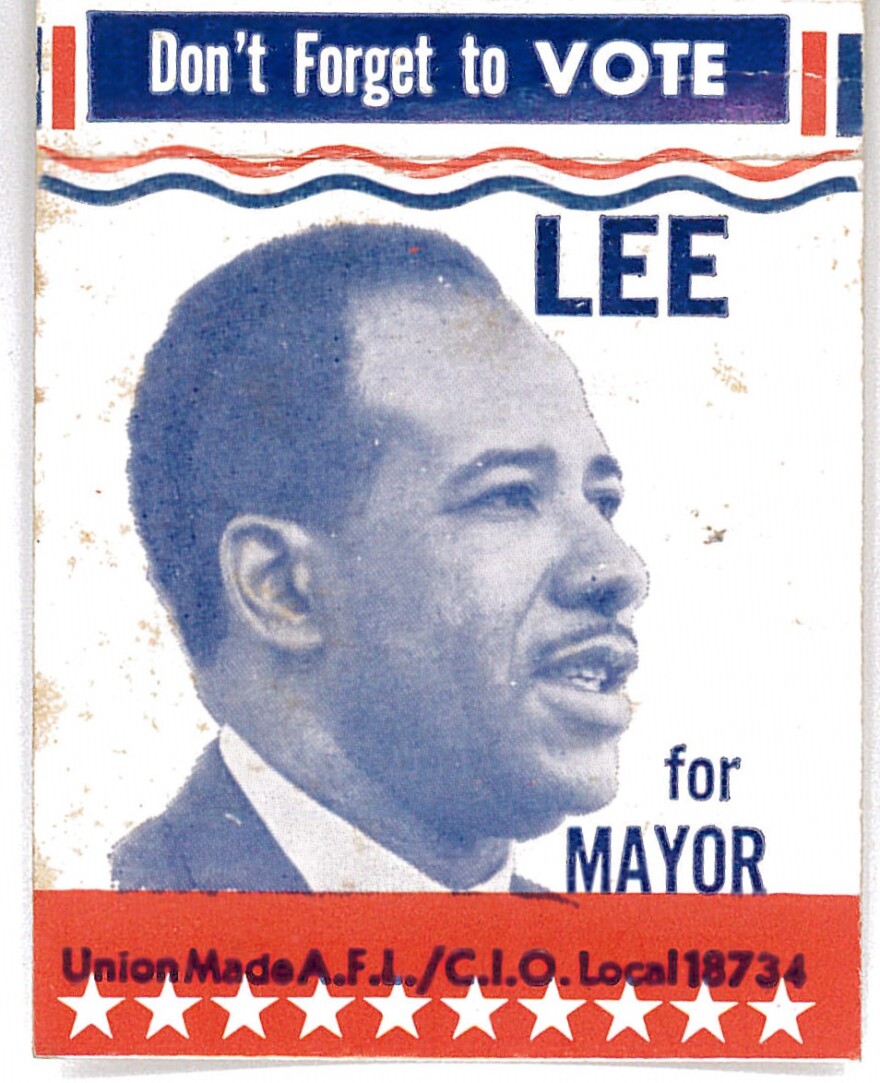
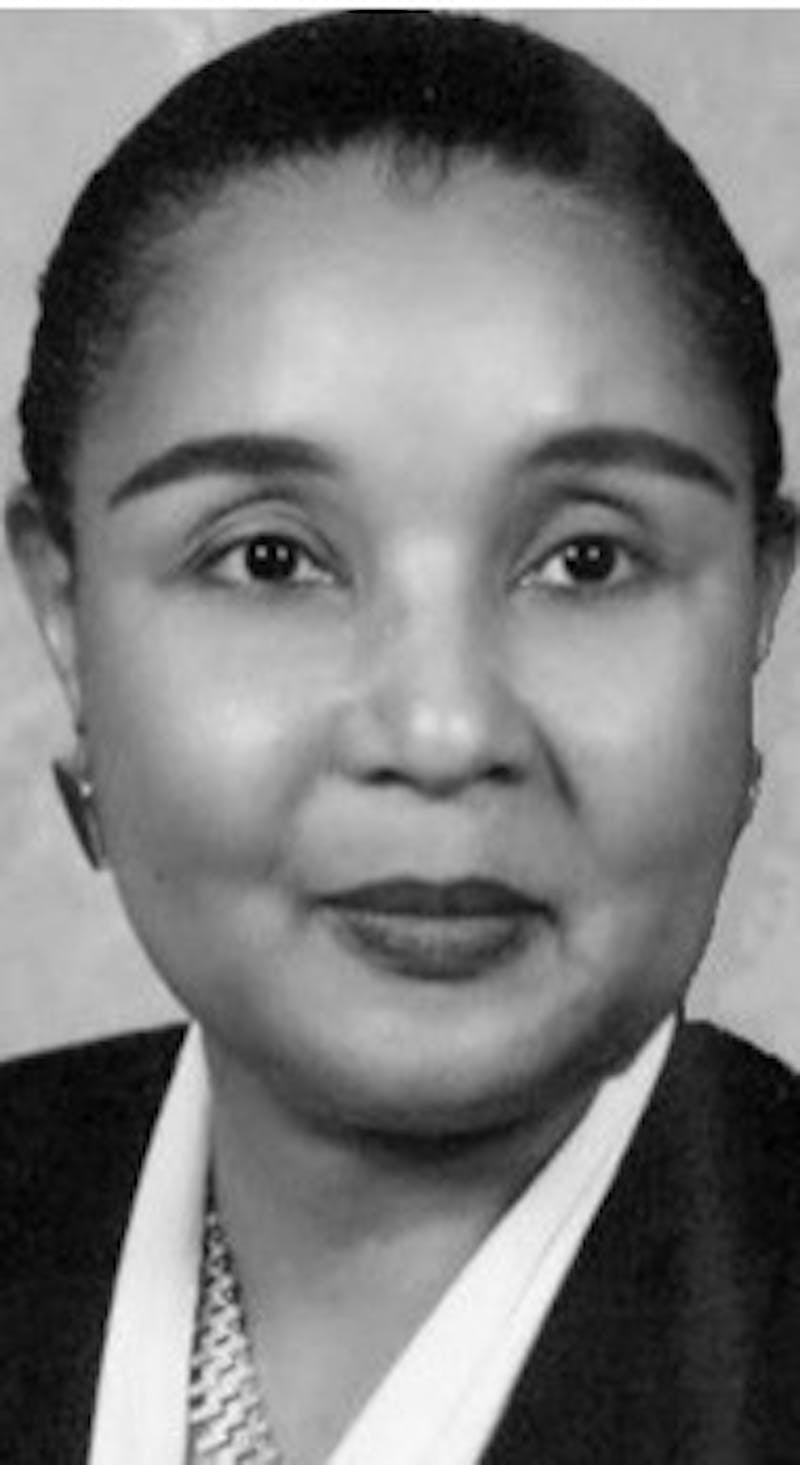

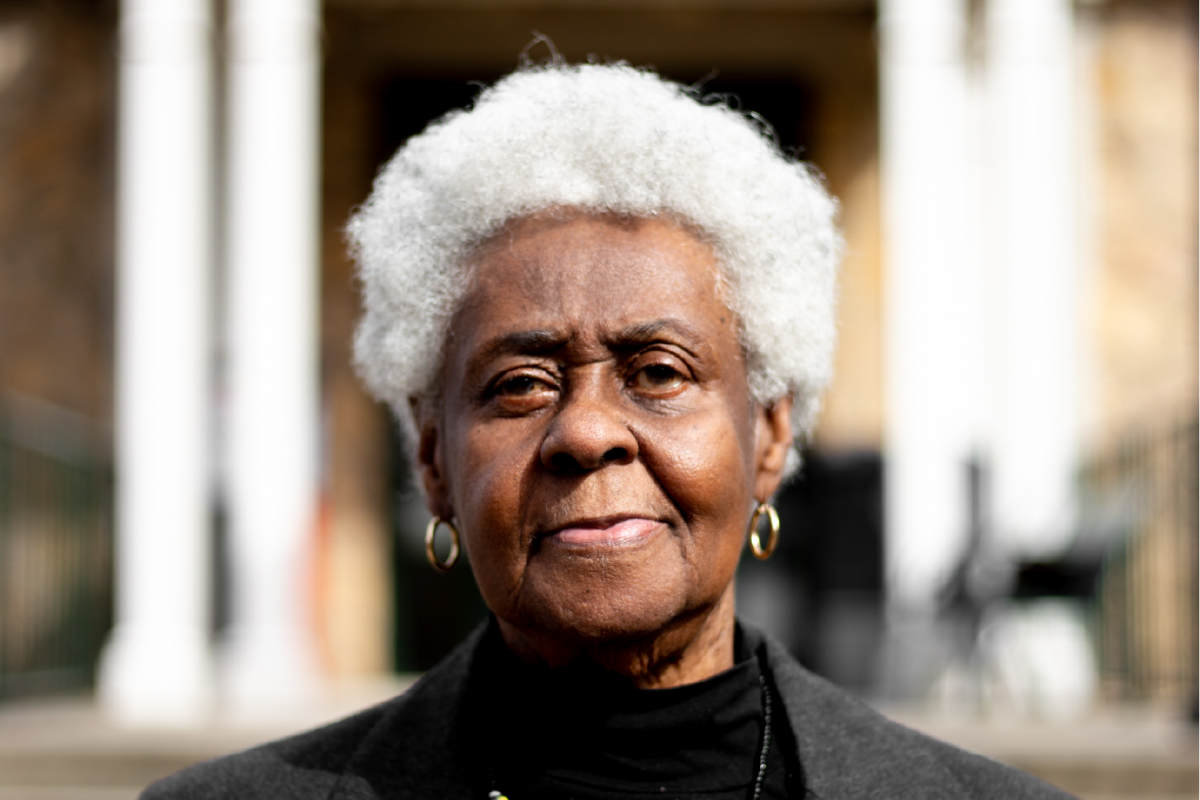
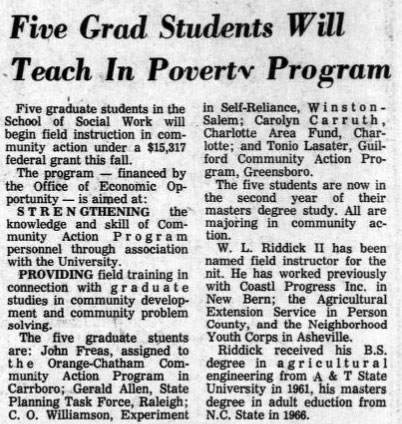

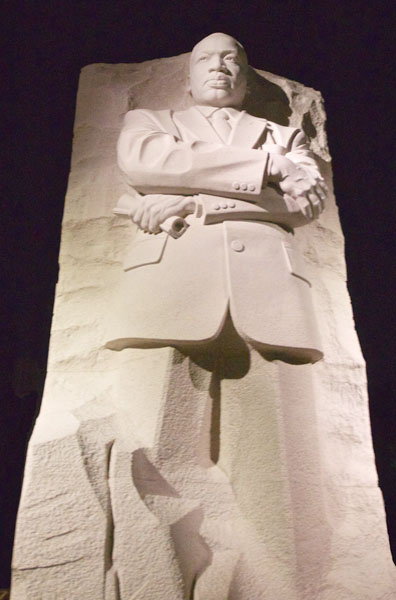



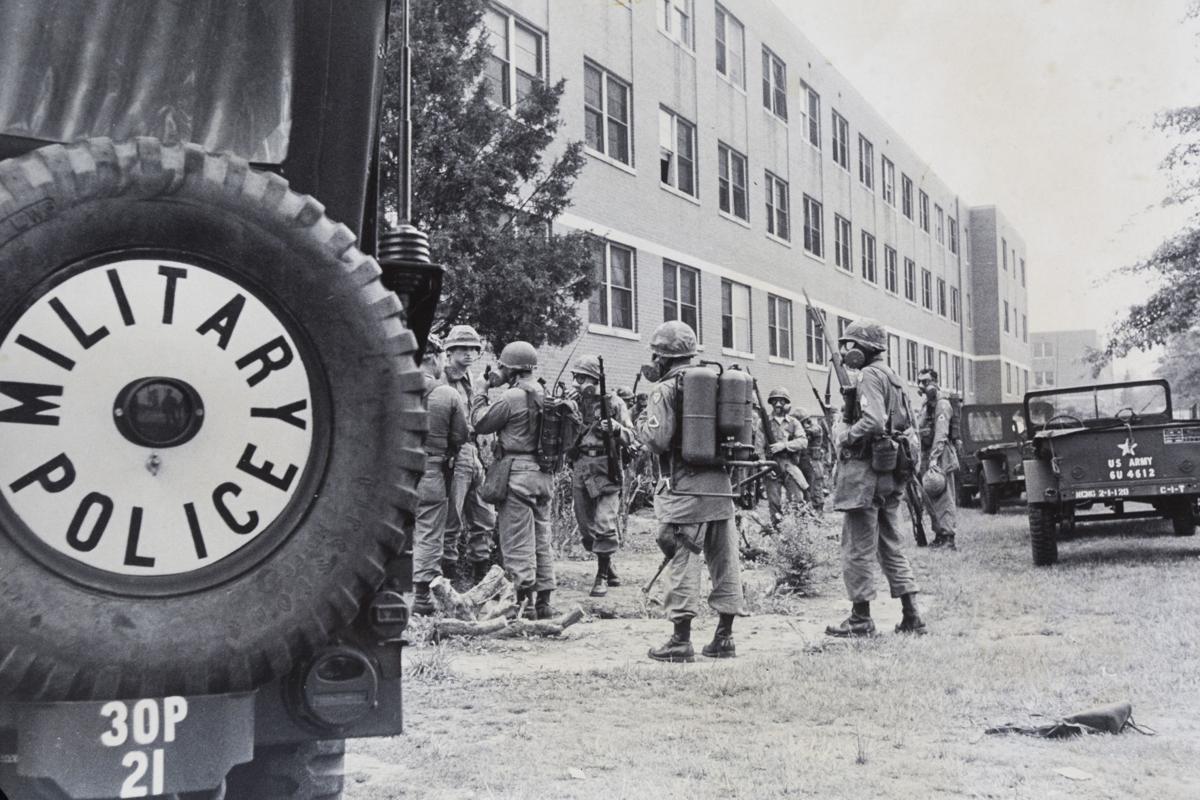
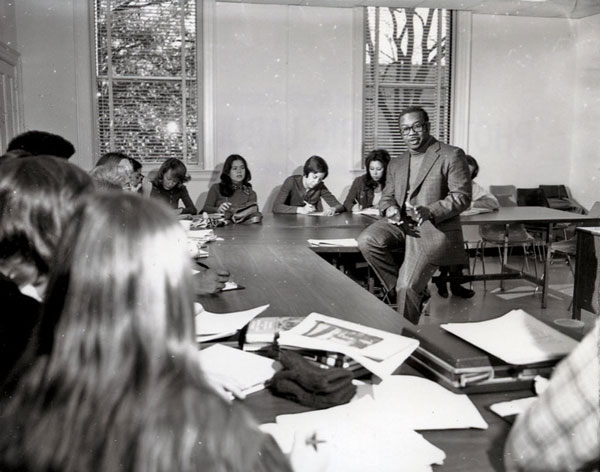
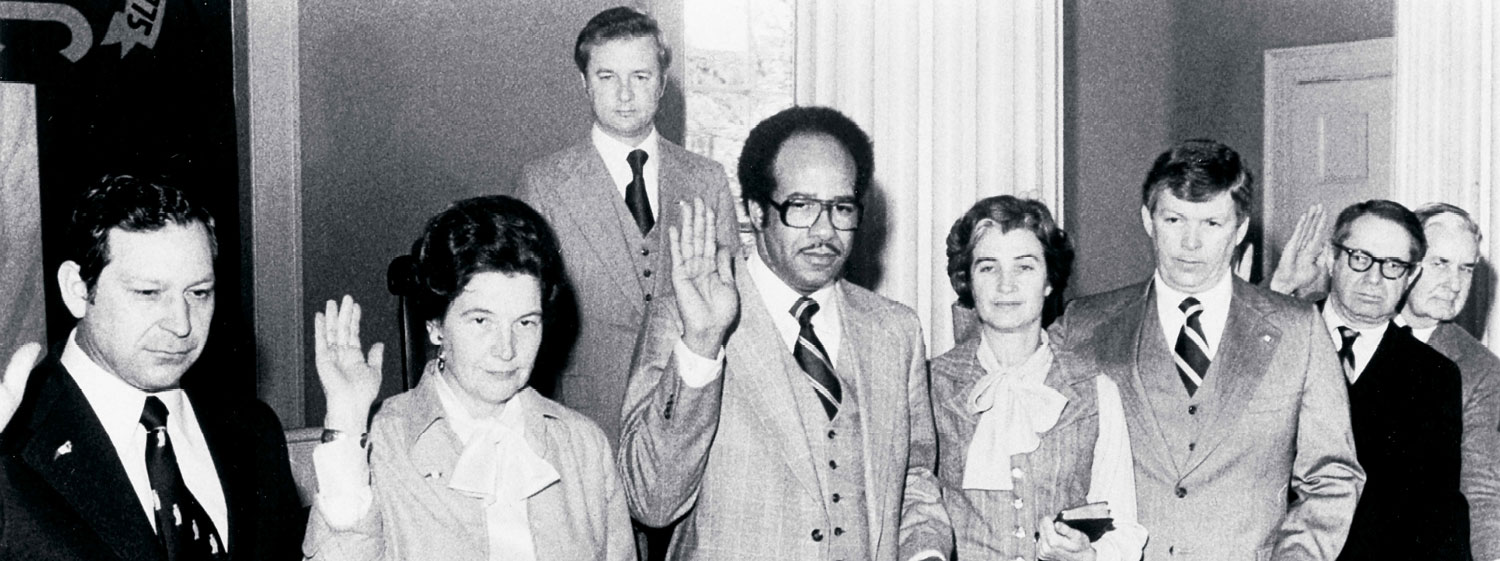
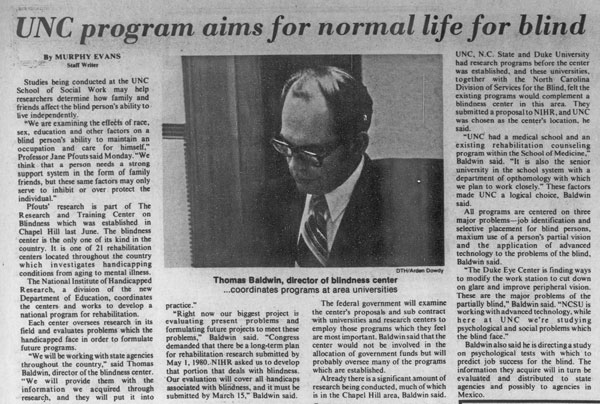
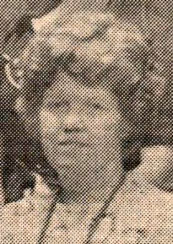
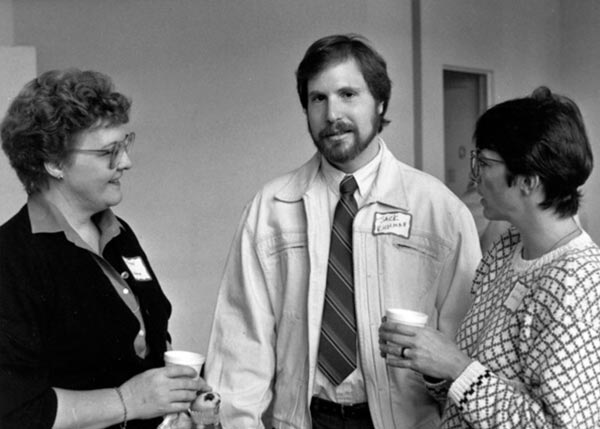
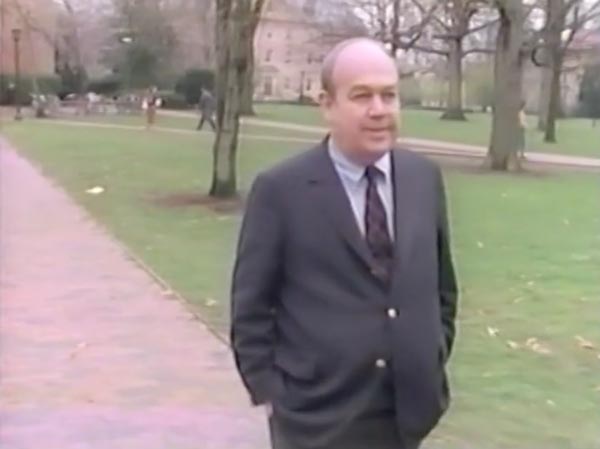

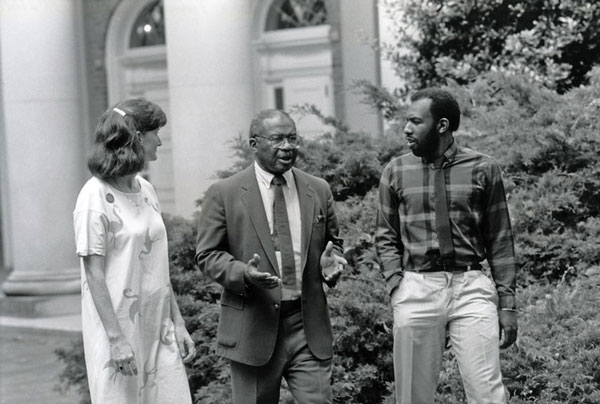
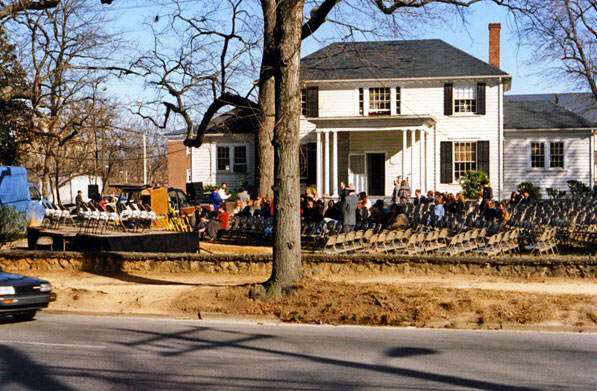

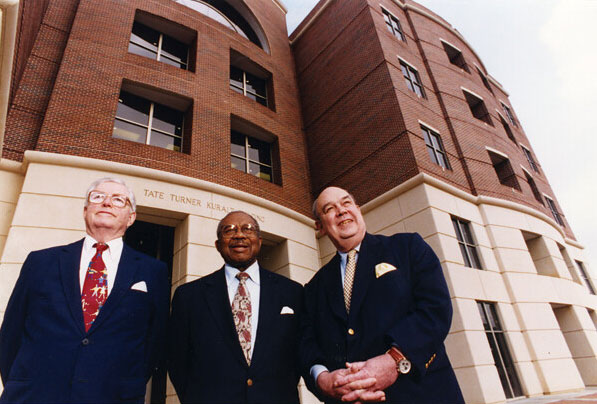
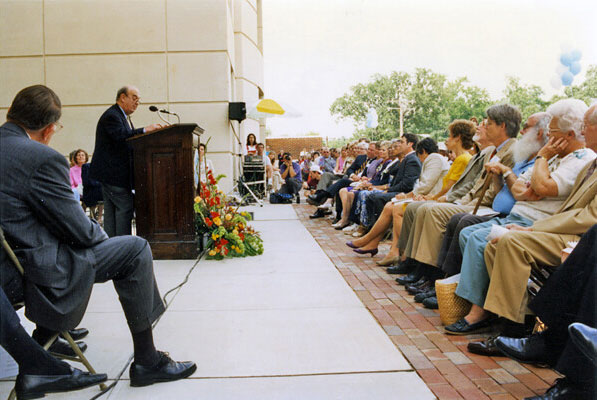

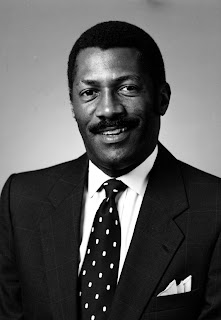
![Clipping from: The Daily Tar Heel. [Chapel Hill, N.C.], March 2, 2001.](https://newspapers.digitalnc.org/images/iiif/batch_ncu_DTH131_ver01%2Fdata%2F2001030201%2F0423.jp2/0,0,4166,6659/511,817/0/default.jpg)
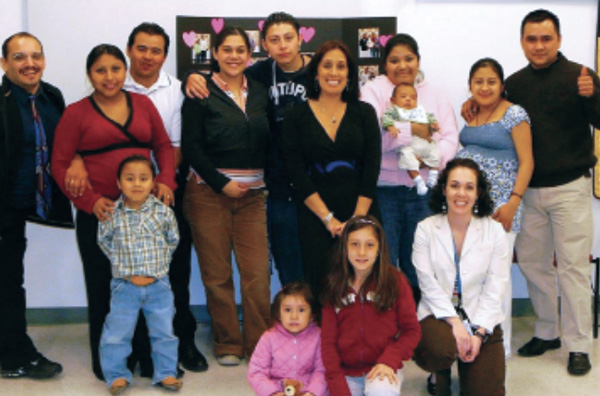
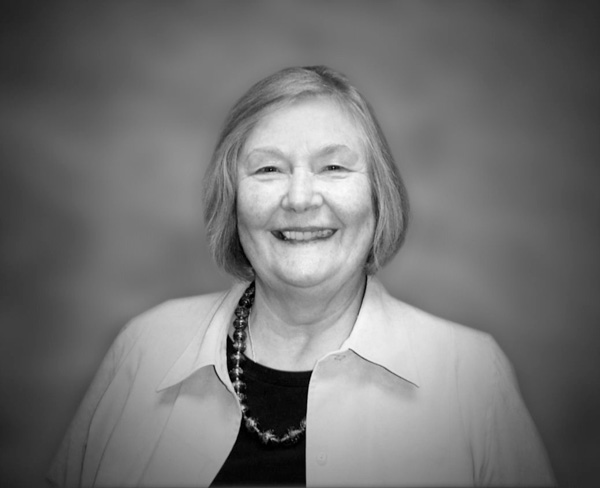
![Bulletin of the North Carolina State Board of Charities and Public Welfare [1918 : January-1918 : March, v.1 : no.1]](https://upload.wikimedia.org/wikipedia/commons/thumb/d/d7/US_President_Barack_Obama_taking_his_Oath_of_Office_-_2009Jan20.jpg/1920px-US_President_Barack_Obama_taking_his_Oath_of_Office_-_2009Jan20.jpg)
